DSI-NRF Centre of Excellence in Human Development
Individual and Society

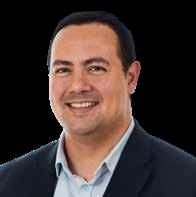


DSI-NRF Centre of Excellence in Human Development
Individual and Society



Professor Brendon Barnes | Professor of Psychology, Faculty of Humanities, University of Johannesburg
Professor Brendon Barnes is a Professor of Psychology in the Faculty of Humanities at the University of Johannesburg. He writes in psychology, environmental health, and justice and has worked on studies of air pollution, housing, lead poisoning, mercury, water and sanitation, and climate change. He has won teaching, academic citizenship, and research awards, and is known to champion the integration of justice into environmental and climate psychology.
Dr Mongezi Mdhluli | Chief Research Operation Officer in the Office of the South African Medical Research Council President
Dr Mongezi Mdhluli is the Chief Research Operation Officer (CROO) in the office of the SAMRC President. He is responsible for the research operations of the SAMRC, the Project Management Office, Research Operations (including laboratory operations) Ethics Committee and the Research Integrity Office and overseeing the efficient operations of the Insectary and PUDAC. Prior to the CROO position, Mongezi was employed in the SAMRC as a Scientist and then moved to head the supply Chain Management Division. Mongezi completed his PhD at the University of the Western Cape and MBA at the University of Stellenbosch Business School.

Ms Mastoera Sadan | Chief Sector Expert in the Department of Planning, Monitoring and Evaluation of the National Government of the Republic of South Africa
Mastoera Sadan is a social policy analyst who has twenty-seven years professional experience. She has worked at a senior management level in the national government of South Africa for the past nineteen years, first in the Presidency and then in the National Planning Commission, in the Department of Planning, Monitoring and Evaluation (DPME). Her expertise is in social policy and poverty and inequality. Currently she is the Chief Sector Expert: Social, in the National Planning Commission (NPC) Secretariat, DPME. Until 2018 she was the Programme Manager of the Programme to Support Pro-poor Policy Development (PSPPD II) in the DPME, a European Union-funded programme. She successfully managed this research and capacity-building Programme over an eleven-year period from 2007-2018, where she managed R150m in funding. During this time, she also managed the National Income Dynamics Study (NIDS), South Africa’s national panel study from 2006- 2018 in the DPME. Prior to the PSPPD she worked in the Policy Coordination and Advisory Services (PCAS) in the Presidency. She has previously worked in the NGO and higher education sector, at the Institute for Democracy in South Africa (IDASA) and at the University of the Western Cape. She holds a MSc in Social Policy and Planning from
the London School of Economics (LSE) and was a Visiting Scholar at the University of Oxford from 2002-2003.
Prof Lauren Graham | Associate Professor and Director of the Centre for Social Development in Africa, University of Johannesburg
Professor Lauren is a Professor and NRF-rated scholar who currently serves as the Director of the Centre for Social Development in Africa. She is a development sociologist working in the field of social development. She brings a sociological lens to this field to understand how social, cultural, political and intrapersonal factors interact with individual agency to shape development outcomes. Her work has focused on excluded groups including unemployed youth, people with disabilities, and children growing up in adverse contexts. While she is committed to the academic work of conceptualising and executing rigorous research that can build theory, she is equally interested in how evidence can be used to develop innovative solutions that promote better social development outcomes for society’s excluded groups. Her work is thus inherently applied and policy relevant.
Dr Vusi Malele | Deputy Director: High-End Skills at the Department of
Dr Malele is the Deputy Director: High-End Skills at the Department of Science and Technology (DST). He is currently a doctoral candidate in Industrial Engineering at the Tshwane University of Technology. He holds a Master’s in Engineering Sciences (Electronics and Computer Science) from the University of Stellenbosch He also holds a certificate in Managing Public Policy from the Wits School of Governance. His working experience has included being an educator, an engineer, a lecturer, research professional and a manager. He also sits on the steering committees of other Centres of Excellence.
Mr Sassman is the Director: Centres of Excellence at the National Research Foundation (NRF). He holds a BSc from the University of the Western Cape, BEd and MEd degrees from the University of Cape Town, and an MBA from the Business School Netherlands in Buren in the Netherlands. He also received training in financial management from Price Waterhouse & Coopers, in internal financial controls from the National Treasury and in negotiation skills from the (former) South African Management Development Institute. His working experience has included being an educator, as well as working for the national Department of Education, the national Department of Provincial and Local Government, and at the Foundation for Human Rights.
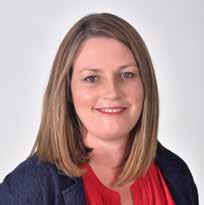
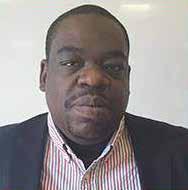


Robin Drennan has a PhD in Chemistry from Rhodes University, awarded for the investigation of pyrotechnic reactions. He has practiced as an applied researcher in a public company, AECI, and a science council, CSIR. He worked at a national funding agency (National Research Foundation) where he managed many different programmes. In 2011 he joined the Wits University as Director for Research Development. His role entails leading, encouraging and supporting research across the University. In 2010 Dr Drennan won a Golden Quill award for research reporting and in 2017 a SARIMA award for distinguished contribution to the Research Management Profession.

Dr Moodley is currently the Director for Basic Sciences at the Department of Science, Technology and Innovation (DSTI) in South Africa. As Director for the Basic Sciences he is responsible for strategic and policy development as it pertains to the foundational disciplines (Mathematics, Statistics, Physics, Chemistry and the Biological Sciences). He is responsible for, inter alia, oversight of the Academy of Science of South Africa (ASSAf); managing the South African Basic Sciences Platform consisting of Learned Societies, science academies, institutes, funding agencies, and government departments responsible for the Basic Sciences; overseeing the scientometric studies for the Basic Sciences; the development of an open science policy for South Africa; and oversight of the National Institute for Theoretical and Computational Sciences (NITheCS), the South African Quantum Technology Initiative (SA QuTI), and the African Institute for Mathematical Sciences (AIMS) which is a pan-African network of Centres of Excellence for post-graduate training in mathematical sciences. Dr Moodley has previously held research positions at the University of Natal, University of the Witwatersrand, and the Centre for Science, Technology and Innovation Indicators (CeSTII) at the Human Sciences Research Council.
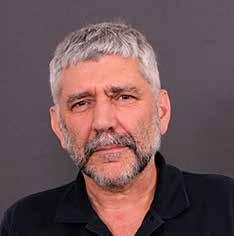
Prof Aryeh D. Stein (Chair) | Professor in the Hubert Department of Global Health of the Rollins School of Public Health at Emory University
Prof Stein has a joint appointment in the Department of Epidemiology at Emory University in the USA. He is a member of the faculty of the Nutrition and Health Sciences program of the Laney Graduate School of Arts and Sciences. In his research, he identifies critical periods of susceptibility to nutritional deficits and surfeits using intervention trials and natural experiments such as war-induced famine to study the role of prenatal and childhood nutrition on the development of adult chronic disease and cognitive achievement. He obtained his B.Sc. in nutrition from the University of London, and his MPH and PhD degrees, both in epidemiology, from Columbia University in New York City.
Prof Zané Lombard | Associate Professor in Human Genetics, University of the Witwatersrand
Prof Zané obtained her PhD in Human Genetics and Bioinformatics in 2008, under the supervision of Prof Michele Ramsay in the Division of Human Genetics (Wits University & NHLS). Her PhD research focused on a bioinformatics approach to disease-gene discovery. She is currently a Principal medical scientist and associate professor in the Division of Human Genetics, where she heads the Research laboratory and the Research & Development team in the Department. Before this, she worked as a Senior Lecturer in Bioinformatics in the School of Molecular & Cell Biology, also at Wits. Zané is passionate about promoting science in Africa, and therefore participates in several academic service domains at university, national and international level, like the SA Society for Human Genetics and the H3Africa Consortium. She currently is the PI of the H3Africa NIH-funded project called Deciphering Developmental Disorders in Africa, which was started in 2017. The aim of the study is to evaluate how new sequencing technologies can be used effectively in the diagnosis of rare genetic diseases to enhance the service we can offer to patients in the public healthcare sector.
Prof Blessing Mberu | Senior Research Scientist, Population Dynamics & Urbanization at APHRC & Honorary Professor of Demography and Population Studies, University of the Witwatersrand
Blessing is a Senior Research Scientist and Head of Urbanization and Wellbeing. Blessing works on migration, urbanization, adolescent reproductive behaviour and poverty in sub-Saharan Africa under the Urbanization and Wellbeing research program. He holds a PhD in Sociology, Master of Arts degree in Sociology from Brown University (USA) and an MSc from the University of Ibadan (Nigeria). Blessing joined APHRC in 2008 as a Post-Doctoral Fellow from Brown University (USA). He previously worked at APHRC as a Research Intern and Travel Scholar between August 2004 and June 2005. Prior to joining APHRC, Blessing worked at Abia State University, Nigeria since August 1988 as a Graduate Assistant in the Department of Sociology and promoted to a Senior Lecturer between 1999 and 2002.
Prof Clifford Odimegwu | Professor in Demography and Social Statistics, University of the Witwatersrand
Clifford Odimegwu is a full professor of demography and social statistics, and heads the Demography and Population Studies Programme, an interdisciplinary programme of the Schools of Public Health and Social Sciences. Prof Odimegwu is an acknowledged researcher in the field of population health and development issues in sub-Sahara Africa. He has graduated 23 PhDs, numerous Masters and Honors students; and has over 200 publications in top Journals. He has 3 books to his credit and the fourth, The Handbook of African Demography, is under production by Routledge. He has a few years to retire.
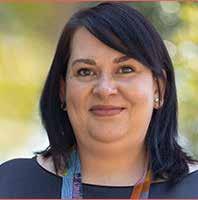
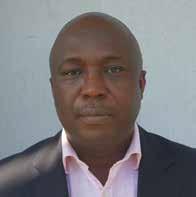


Prof Mark Stoutenberg | Professor and Head of Department, Department of Sport & Exercise Sciences, Durham University (UK)
Dr. Stoutenberg received his doctoral degree in Exercise Physiology (2008) and Masters of Science in Public Health (2013) from the University of Miami, where he was also a faculty member in the Department of Public Health Sciences for 9 years. Prior to joining Durham University, Prof Stoutenberg was the Chair of the Department of Kinesiology in the College of Public Health at Temple University (Philadelphia, USA). Prof Stoutenberg’s area of expertise examining the optimisation of clinic-community linkages to connect patients from health settings to existing community resources to physical activity, obesity, and non-communicable diseases. Through his work, Prof Stoutenberg works with governments, health agencies, academic institutions, and professional organisations around the world.


Prof Shane Norris | Director
Prof Norris is Director of the DST-NRF Centre of Excellence in Human Development and Director of the MRC/Wits Developmental Pathways for Health Research Unit, Department of Paediatrics, at the University of the Witwatersrand. He is an epidemiologist with research interests that include child growth and development, obesity, and inter-generational risk of metabolic disease.
Dr Khuthala Mabetha | Centre & Research Manager
Dr Khuthala Mabetha joined the CoE-Human in October 2023 as a Centre and Research Manager. She holds a PhD in Demography and Population studies from the University of the Witwatersrand. After completion of her PhD studies, she subsequently became a Postdoctoral Fellow at the MRC/Wits Developmental Pathways for Health Research Unit in the Healthy Living Trajectories (HeLTI) Consortium which consists of a multidisciplinary team that spans across four countries namely South Africa, China, India and Canada and aims to develop evidence-based interventions that strive to improve maternal, child and infant health. She is a trained Demographer by profession and has been trained to apply various quantitative, qualitative and mixed-methods research methodologies to various studies. Her research interests are centred particularly on child health and family, population health dynamics and health transitions with regards to why the health of the population is changing, particularly in relation to children, families and young women.

Ms Kholeka Vikilahle | Finance Officer
Kholeka Vikilahle joined the CoE-Human in June 2023 as a Finance Officer. She has a wealth of experience in business administration support and project management. She previously worked for Wits Business School and Henley Business School SA as a Programme Manager. Before that, she fulfilled the role of Business Development Manager and Relationship Manager in the vehicle finance space for WesBank and Motor Finance.
Ms Rebecca Mudau | Administrative Officer
Rebecca Mudau joined the CoE-Human in May 2021 as a Research Assistant and Administrator. She has a wealth of experience in business administration support. She previously worked for the South African Post Office as a Data Capturer and Call Centre agent. Before that, she fulfilled the role of Customer Service Agent for South African Airways. Her career began at BCA as a part-time administrator and receptionist.
Prof Linda Richter | Distinguished Professor
Linda Richter is a Distinguished Professor in the Centre, a developmental psychologist with a PhD from the University of Natal. Linda is the author or co-author of more than 400 papers, books, chapters and reports on basic and policy research in child and family development. She led the development of South Africa’s National Integrated Early Child Development Policy and Programme, adopted by Cabinet in 2015 as well as the 2017 Lancet Series Advancing Early Child Development: From Science to Scale. Linda is also the Principal Investigator of several large-scale, long-term collaborative projects, including Birth to Thirty, a birth cohort study of 3 273 South African children followed up for 30 years. Linda is currently writing a book on the study and has just received the NRF Lifetime Achievement Award for 2021, recognizing her extraordinary contributions to science in and for South Africa and globally. Linda is also a member of the Wellcome Trust Discovery Award Interview Panel.
Ms Sara Naicker | Research Project Manager
Sara Naicker is a Research Project Manager in the Centre. She has managed several projects – both large- and small-scale, based in South Africa and abroad, on early childhood development, child and adolescent health and well-being, and families and children in vulnerable contexts. Sara’s current work on adversity assesses the extent to which exposure to multiple and cumulative adversities in childhood is associated with poor health and wellbeing in adulthood.





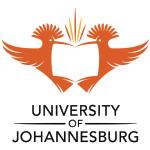








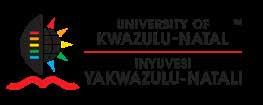





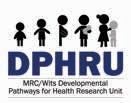


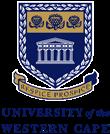






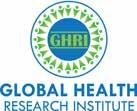





The CoE-HUMAN continued to support strategic grants in 2024 focusing on broad themes around health and wellbeing, child development and environmental sustainability.
The 2024 Child Gauge was launched with the core theme being Early Childhood Development.
Two Collaborative research grants focusing on environmental sustainability were awarded to Historically disadvantaged institutions (UNIVEN and UFH).
Research investigation grant on household economic shocks awarded to UJ.
Opportunity grant on Communicable diseases awarded to UNIVEN.
3.5 Million people reached through our media output
R1,536 Million in Advertising Value Equivalent for our media items
of Black South African students (including coloured, African and Indian students)
docs – up 3 from 9 in 2023
Researchers affiliated with the CoE leveraged a total of R7,706,458.92 in research and innovation grant funding in 2024.
published (4 with impact factors of >5) and 1 book

The 2024 National Research Foundation Awards were hosted at a prestigious ceremony held at the Sun City Resort in North-West Province, on the 22nd of August 2024. The awards were held under the theme Celebrating 25 Years of Research, Innovation, Impact and Partnerships, in recognition of the NRFs accomplishments since its establishment in 1999.
The annual NRF Awards recognise outstanding achievements made by individuals and teams whose excellence has significantly advanced science for the benefit of society. Their internationally competitive work is assessed for, among other things, the contribution to the field of study focusing on quality and impact. One of the objectives of the awards is to encourage the continued culture of advancing South Africa’s scientific knowledge and technological innovation by rewarding those that make use of research for the advancement and betterment of humanity. The awards ceremony was hosted to honour some of South Africa’s high-achieving Researchers and Scientists.

In his welcome address, Professor Mosa Moshabela, the Chairperson of the NRF Board, lauded the 2024 awardees for the strides they have made over the last years. “This is the pride of our nation, the epitome of excellence. We pride ourselves in you,” he said. He added that the 2024 NRF Awards were special because they coincided with the premier research funding agency’s celebration of its 25th anniversary. “It marks 25 years of leading, promoting and supporting highly impactful research and innovation and working hard to foster partnerships for the advancement of the South African National System of Innovation and Science”.
The awards were presented across two categories –NRF ratings-based awards and Special awards. The NRF ratings-based awards were as follows:
P-rated Researchers
A-rated Researchers
Special awards fell in the following categories:
Lifetime Achievement Awards
Research Excellence Award for Next Generation Researchers
Research Excellence Award for Early Career/ Emerging Researchers
Focussed Research Advancement Award
Champion of Research Capacity Development and Transformation Award
Science Team award
Societal Impact Award
Three Centres of Excellence were nominated for the Societal Impact Award in recognition of research with impact that has resulted in improvement in the quality of people’s lives. The DSI-NRF Centre of Excellence for Biomedical TB Research (CBTBR) was awarded the Societal Impact Award and the DSI-NRF Centre of Excellence for Epidemiological Modelling and Analysis and the DSI-NRF Centre of Excellence in Human Development were nominated as the Societal Impact Award Finalists.
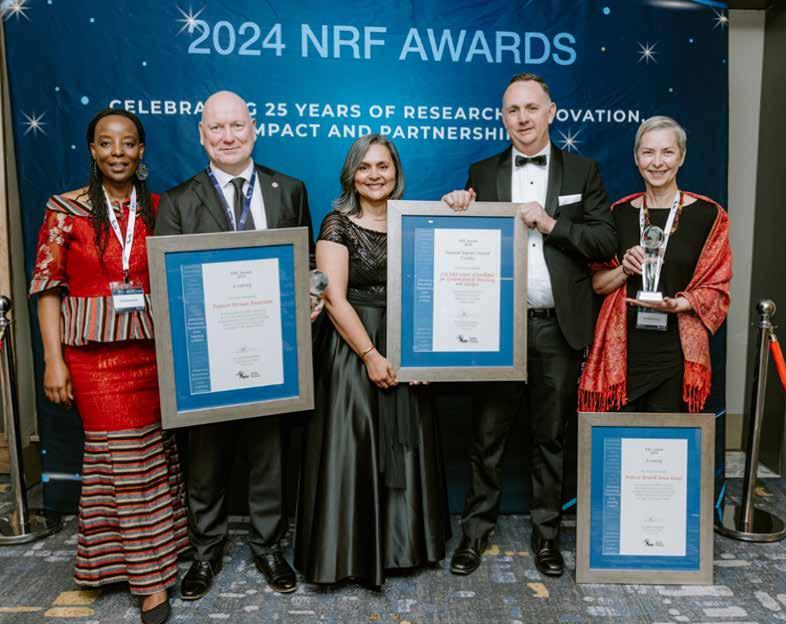


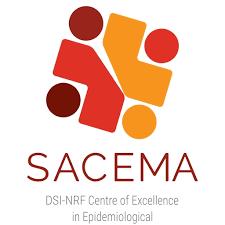


The Communities of Practice (CoP) for Child Wellbeing Symposium was an important gathering aimed at addressing the multifaceted challenges affecting child wellbeing in South Africa. This event brought key stakeholders from education, health, and social development sectors to discuss and address these complex challenges facing children who are recipients of the child support grant. The CoE-HUMAN was one of the collaborators on the child wellbeing project and was represented in the symposium. The event served as a platform for sharing knowledge, experiences, and best practices, fostering collaboration, and driving innovation in the field of social development and welfare.
The symposium highlighted various achievements of the CoP initiative, emphasizing its role in fostering collaboration among stakeholders. By bringing together educators, health professionals, social workers, and community members, the CoP has facilitated a shared understanding of the systemic issues impacting children. Participants discussed innovative strategies to mitigate factors contributing to poor social and learning
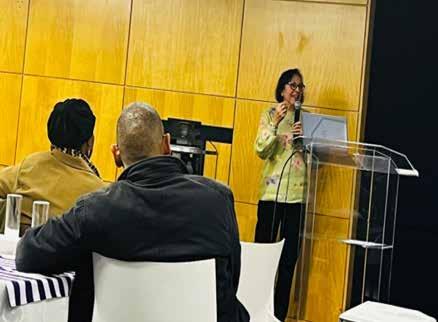

outcomes, s uch as poverty, food insecurity, family disruption, and mental health challenges.
The CoP project is a multi-dimensional initiative aimed at improving child wellbeing outcomes. The CoP operates across five urban sites in Johannesburg, Gauteng and one rural site in Moutse, Limpopo. It targets children in Grades R and 1 who receive a Child Support Grant (CSG). The project’s primary objectives include:
Promoting collaboration between education, health, and social development sectors.
Designing and implementing a digital application for monitoring child wellbeing.
Developing tailored interventions for children and families at-risk.
Assessing changes over a three-year period to strengthen school-based support services.
The CoP project has yielded significant research outputs and media coverage. Key findings include:
1. Digital Child Wellbeing Tracking Tool (CWTT): Developed to assess risks faced by children and inform intervention strategies. It has been used to monitor various wellbeing indicators including nutrition, psychosocial health, protection and care, living conditions and educational performance.

2. Impact on child wellbeing: The intervention has shown positive effects on child resilience, reducing clinical risk and conduct difficulties.
3. Quantitative Assessments: Over three years, surveys were conducted assessing child wellbeing across urban and rural settings. Key findings include:
a. A 7% increase in hunger among urban children in 2022 compared to zero hunger reported in 2021.
b. A correlation between caregiver mental health and child resilience; a decrease in caregiver depression was linked to improved child outcomes.
4. Qualitative Insights: Focus groups and interviews with caregivers and teachers provided valuable perspectives on the psychosocial aspects of child wellbeing. These engagements revealed critical lessons about collaboration and the necessity for integrated service delivery.
5. Conferences and Media Outputs: The CoP team has participated in various conferences to share findings and best practices. The project has provided recommendations for strengthening school-based support services, fostering a culture of collaboration and learning, and ensuring equitable partnerships.
Data from the CWTT illustrates significant trends:
Decreased child hunger: Levels of child hunger declined from a high during the COVID-19 pandemic.
Insufficient food intake: Despite improvements, 15% of children in urban schools and 26% in rural schools still have insufficient food intake.
School feeding challenges: Access to school feeding remains a challenge for many children, with 40% of children in urban schools and 13% in rural schools not receiving regular meals.
Vaccination Rates: Only 71% of urban children had up-to-date vaccinations.
The CoP project has been featured in various media platforms raising awareness about the importance of child wellbeing and the potential of the CoP approach to address these challenges.
The Communities of Practice for Child Wellbeing Symposium not only celebrated the successes of the CoP project but also served as a platform for ongoing dialogue about improving child wellbeing through collaborative efforts. By leveraging existing policies and addressing service fragmentation, the CoP aims to create sustainable solutions that enhance the lives of vulnerable children and their families across South Africa. The continued commitment from all stakeholders will be crucial in ensuring that these initiatives yield positive long-term outcomes for future generations.

The South African Child Gauge is an annual publication of the Children’s Institute, University of Cape Town, that tracks progress towards realising children’s rights in South Africa and that contributes to evidence-based policies and programmes to enhance services and outcomes for children. The CoE-HUMAN contributed funding towards the 2024 edition of the Child Gauge. This issue brought together over 50 contributors from across the country to focus attention on early childhood development – tracking progress since National Integrated ECD Policy in 2015 and setting an agenda for 2030.
The editorial team (Associate- Professor Wiedaad Slemming, Dr Linda Biersteker and Lori Lake) led the conceptualisation and review process with support from the broader editorial advisory committee that included leading academics in the field and key stakeholders from government (Professor Linda Richter, Dr Mastoera Sadan, Dr Lesley Bamford, Dr Janeli Kotze, Lizette Berry, Andre Viviers and Dr Nicholas Dowdall) to ensure both a sound evidence base and policy relevance. Initial conceptualisation was guided by a roundtable engagement with key stakeholders that took place on 16 November 2022 followed by an in-person meeting of the advisory committee to fine tune the frameworks for each chapter.
A series of 13 chapters were then commissioned. The first three chapters reflect on the science of ECD, the current status of ECD services in South Africa and progress in implementing the National Integrated Early Childhood Development Policy. The following three chapters focus attention on how to strengthen services to enhance outcomes across three critical domains of early childhood development: health and nutrition, care and support, and early learning, followed by a chapter that explores how to achieve more equitable outcomes by providing extra care. The final chapters focus on how
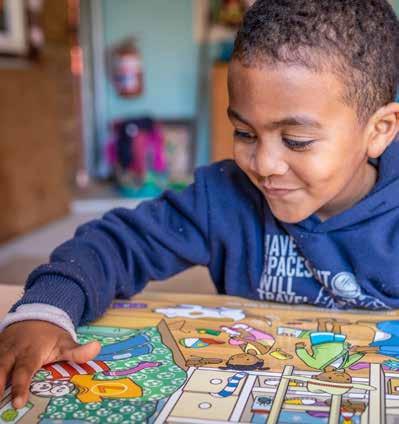
African Child Gauge 2024
Wiedaad Slemming, Linda Biersteker & Lori Lake
to strengthen the ECD system by establishing an enabling policy environment, strong leadership and coordination, adequate financial and human resources, and good quality data to support effective delivery on the ground. We also secured contributions from the Ministers of Health, Social Development and Basic Education
who shared their commitments to foster the health, care and optimal development of young children in South Africa.
A key highlight was the writing retreat from 8-9 June 2023 that enabled authors to share their draft frameworks, develop a common understanding, and strengthen alignment and coherence across the different chapters – with authors appreciating the opportunity to engage deeply in discussion about the current status of ECD in South Africa and the way forward. Each chapter was then taken through an internal and external peer review, followed by a plain language and conformity edit.
The launch of the Child Gauge was an opportunity to showcase the CI’s new branding and to introduce our new colours and logos which breathed new life into the design of the book, poster and policy brief all of which can be accessed on the CI website
The high-profile launch and media campaign coupled with policy engagements ensure that the key decision makers have access to the information they need to design evidence-based policies and programmes.
The 2024 Child Gauge was launched at a high-profile event at the Design School, University of Cape Town which brought together 80 representatives from government, civil society and academia.
We were honoured and delighted to have the opening address delivered by The First Lady of South Africa, Dr Tshepo Motsepe. Other high profile speakers including Professor Linda Richter, Professor Mark Tomlinson both global experts in the field. See programme and photographs below.
This year’s Gauge has attracted strong and ongoing interest from the news media, with over 99
headlines in print, broadcast and online media with a combined reach of 156 million valued at R3.75 million.
Social media coverage has also been good with over 28,000 impressions on FaceBook, LinkedIn and Twitter.
View some of the media coverage:
SABC TV news One in 25 children in South Africa die before turning 5
SAFM (SABC radio) Outcomes of SA Child Gauge 2024
eNCA Early childhood investment key to breaking poverty cycle
Newzroom Afrika One in every 25 children in SA dies before reaching fifth birthday
TimesLive SA’s little children are in deep crisis
Daily Maverick Child Gauge 2024 sounds the alarm
GroundUp
Researchers raise alarm about access to Child Support Grant
Daily Dispatch New study finds SA’s little children are in deep crisis
PowerFM radio SA Child Gauge sounds the alarm
CapeTalk radio SA must invest in early childhood development to break intergenerational poverty and inequality
We will continue to collaborate with Gauge authors to publish a series of opinion editorials, with the most recent publication in The Conversation attracting over 4500 reads since it was published 2 weeks ago.
Policy engagement:
It is just a month since the launch of the Gauge, so we are still at the very early stages of engaging with civil
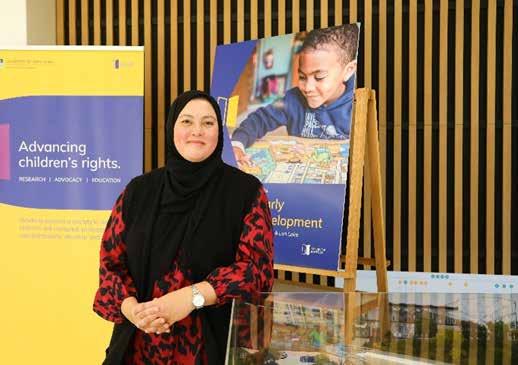
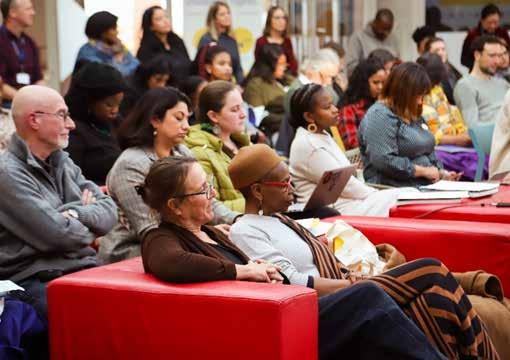


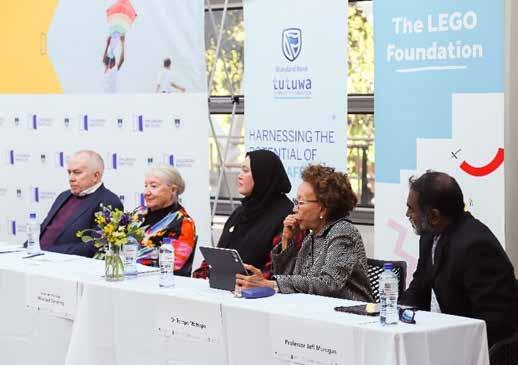



society and government stakeholders, but we have already presented the findings at the:
UNICEF/DBE/UNISA Seminar on 30 years of early childhood development in South Africa.
ECD Intersectoral Forum meeting on Friday, 20 September
UCT Department of Paediatrics and Child Health, Advocacy Symposium, Wednesday, 2 October
Distribution:
This year we printed a run of 1000 copies – partly to stay within in budget, and partly as the demand for printed copies has decreased over the years as more people choose to access the report online. To date (less than a month after the launch) the report has been accessed 1000 times online and we have distributed 440 hard copies. We will also keep a close eye on this distribution and demand to inform the size of our print runs moving forward.
Over the past 14 months, we collaborated with 50 authors from a range of disciplines and sectors to reflect on the progress since the introduction of the National Integrated ECD Policy in 2015 and published these findings in the 2024 issue of the South Africa Child Gauge, which was launched on 21 August.
The launch was accompanied by a high-profile media campaign that has generated significant public awareness about the current status of ECD in South Africa, and the policy brief provides concrete recommendations to guide government decision-making and will be followed (in the weeks and months to come) by a series of presentations and engagements with key stakeholders in government and civil society.
The inclusion of representatives from the Departments of Health and Basic Education and the National Planning Commission on the editorial advisory committee ensured that our thinking was informed by – and aligned to – the needs of policy makers.
Input from the advisory committee was also critical in helping reframe and focus our key messages in a language that is likely to gain traction with decision-makers in government.
Many of the authors who attended the writing retreat commented that this was the first time that they had had an opportunity to meet together to share, learn and engage in robust discussion around what’s needed to enhance early childhood development, so we are keen to create similar opportunities for engagement and discussion in future cycles of the Gauge.
In addition to the content chapters that speak to key elements of early childhood development, we also included a series of chapters that focus on the building blocks of an effective ECD system and are now planning to include a similar section in the 2025 issue in order to allocate more time and space to address the systemic challenges that so often hamper implementation.
We were excited that the First Lady of South Africa, Dr Tsepho Motsepe, able to deliver the opening address and add her weight to our calls, and her presence helped to elevate and amplify our call to action, generating additional media interest and well as high profile engagement across UCT.
We note with concern how limited progress has been since the adoption of the National Integrated ECD Policy in 2015, and more recent signs of regression in relation to poverty, malnutrition and child mortality so we have strived to use this data as a powerful motivator for greater investment in young children.
We hope that the book will contribute to building a common understanding of what is needed to support early childhood development in South Africa, as we were struck by how much of our thinking and practice remain siloed, and focused on the needs of older children attending early learning centres, despite the broad framing of early childhood development in the NIECD Policy and the need to start investing in young children’s health and development from conception..
For more recommendations see the policy brief
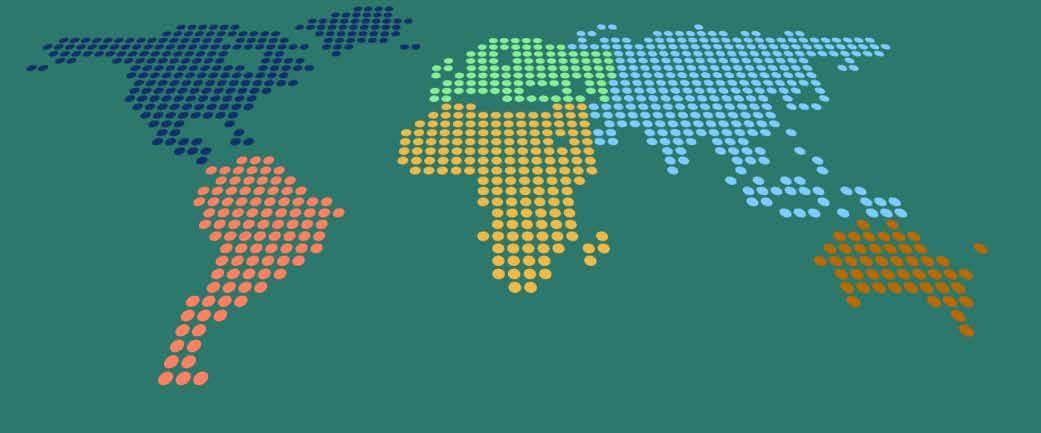
The Harnessing Global Data Project brings together researchers, policymakers and implementers from around the world with a focus on available data on young children in low- and middle-income countries. The goal of the project is to improve child development, early learning and pre-primary education through better understanding of the determinants of and risks to children’s development, the economic consequences of inaction, and policy and legal frameworks to address challenges.
Funded by the UKRI’s Global Challenges Research Fund, and led by Professors Linda Richter, who heads the CoE-HUMAN Durban office, and Alan Stein (University of Oxford) the Project is in its 5th year and final year.
In leading Harnessing Global Data, we have brought together a powerful network to build on work that has gone before, in research, policy and practice. Notable work that is on-going in the project includes:
New Global Indicators: The Nurturing Care Framework at present does not include a measure of responsive caregiving, while recognizing its importance as an indicator in child development. We work with UNICEF’s Data and Analytics Section to develop a short questionnaire on responsive caregiving to be incorporated into their Multiple Indicator Cluster Surveys (MICS) to produce country-comparable, standardized data on responsive caregiving. A literature review and analysis of available data on the ‘maternal death’ or ‘maternal absence’ as an additional indicator when looking at significant determinants of child mortality, health and development is also being conducted.
Extending Coverage of ECD indicators: Together with the ECD Countdown to 2030 Technical Working Group, we support the Hilton Foundation funded initiative to have the ECD module of MICs included as an optional module in a revised version of the Demographic and Health Surveys (DHS). This would enable the group to compile country profiles on ECD indicators for those countries who do not undertake the MICS. These profiles are valuable tools for both accountability and tracking progress towards meeting our ECD goals. The country profiles on ECD can be accessed here: https://nurturing-care.org/resources/country-profiles/
As the Harnessing Global Data group winds down the work on the current grant, important next steps and critical issues have been raised. One of these is the issue of climate change and its impact on the most vulnerable in society – young children. The health impacts of climate change upon the world’s youngest children are of enormous concern. There is incontrovertible evidence that early childhood health, nutrition and development have long-term consequences for life chances. Yet the health impacts of climate change on children from birth to age five in the world’s poorest countries are not visible to policymakers. The group is now working on several climate change areas, funded by the Wellcome Trust. This work aims to generate compelling evidence for the impacts of climate change on early childhood health, to socialise the vital importance of children’s health in the climate change debate and to engage urgent national and international action.
The envisioned work will be co-created through a transdisciplinary partnership between climate scientists and global health experts at the University of Oxford, the International Center for Equity in Health in Brazil, UNICEF and regional networks for early childhood in Asia-Pacific and Africa. Our research will develop and deploy robust methodologies to link data from best-in-class climate science models together with health outcomes from selected countries in these regions. Engaging with stakeholders at local, national and international level in innovative ways, we will translate these findings into actionable policy insights and ensure the impacts of climate change on young children are not only seen but heard.
The Project continues to leverage available data on young children to advance their learning and development. Connect with us on Twitter @GlobalData4Kids and visit our website globaldata4kids.com

Prof. Juliana Kagura and Dr. Sara Naicker have been working on the violence project, funded by the SVRI, titled Childhood trajectories of violence and adult intimate partner violence: A gendered, life course approach to violence prevention.
The project’s aim is to use longitudinal data on the childhood physical and social environment to understand how exposure to violence in childhood can lead to experiences of IPV in adulthood in the South African context. One of the first steps was to use multiple indicators of violence across childhood to develop physical and sexual violence victimization trajectories across childhood. Once these trajectories are established using the Birth to Thirty cohort data, we were able to evaluate early life factors the predict these violence trajectories.
This work is set to be published in PLOS One and is led by Lilian Muchai who worked on the project as part of her Masters degree. The SVRI has a strong focus on capacity building in the violence field, especially for African women, and Lilian has since graduated with her MSc in Epidemiology and Biostatistics from the Faculty of Health Sciences at Wits. Our work on the study has been presented at the World Congress of Epidemiology 2024 in September at is set to be presented at the SVRI Forum 2024 – the world’s key research conference on violence against women, violence against children, and other forms of violence driven by gender inequality in low and middle-income countries, being held 21 – 25 October at the CTICC in Cape Town, South Africa.
For both physical and sexual violence victimization there appears to be two trajectories of violence victimization:
For sexual violence victimization, children in the study begin with relatively low exposure and split in adolescence with one group experiencing increasingly higher levels of sexual violence victimization and a second group decreasing in experiences from age 15 to 18.
For physical violence victimization, the majority of children in the study begin with some exposure to physical violence which increases steadily for most children up to age 15, where the trajectories split into two – one group going on to experience increasingly higher levels of physical violence up to age 18 and the other decreasingly drastically after age 15.
Approximately one-third of children exhibited persistently increasing physical and sexual violence patterns throughout childhood.
We found both Individual and family level factors predicted physical violence victimization trajectories; these include sex of the child, maternal education and household socioeconomic status.
For those in the increasing sexual violence victimization pattern, vulnerability was limited to family level factors only, notably household socioeconomic status.
We’ve demonstrated that children within the same environment can follow different patterns of violence victimization during childhood. Both individual and family level early life factors contribute to increasing violence victimization patterns for children. Once we understand the early life factors that contribute to specific

Sexual violence victimization trajectories

patterns of violence victimization, we can tailor programmes to better target those in need and provide early intervention that can prevent violence victimization or at the very least, mitigate the exposure. Our findings also strengthen the call for early and integrated interventions targeting poverty alleviation, parenting and nutritional support.
In April 2024, the CoE-HUMAN conducted the Third Wave of its nationally representative South African Human Development Pulse survey among 3,171 respondents aged 18 years and older across the nine provinces of South Africa. The third wave consists of a repeated cross-sectional panel (referred to as Panel 3), that follows the first and second nationally representative panels surveyed in September-October 2021 (Panel 1: n = 3,402) and MayJune 2022 (Panel 2: n = 3,459).

Data collection took place through face-to-face interviews to administer a survey with the use of computer-assisted personal interviewing technology. A team of experienced fieldworkers moved from household to household across the nine provinces in the country until the target number was reached. For a particular
community, enrolment was thus executed via a targeted approach to ensure generalisability. Wave three of the survey focused on several aspects, particularly those surrounding the effects of exacerbated socioeconomic challenges on health literacy, multimorbidity, mental wellbeing and related coping strategies.


Nationally, the overall prevalence of probable depression has decreased in Panel 3 (21.7%) compared to Panel 1 (25.7%) and Panel 2 (26.2%). Contrary to Panel 1 and Panel 2, Eastern Cape province reported the highest prevalence of probable depression (30.1%), and Free State province reported the highest probable anxiety (29.2%).
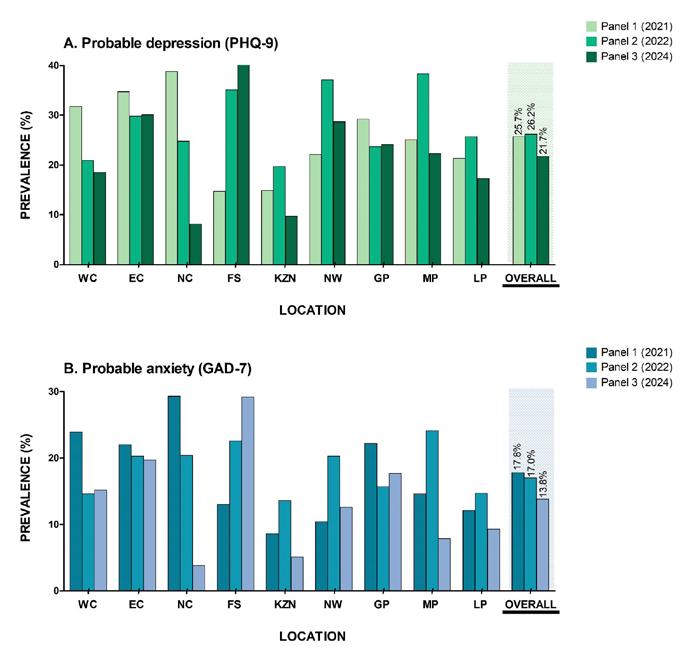
The prevalence of food insecurity has increased at a national level, from just about 1 in 5 households (20.4%) in panel 1 to now almost 2 in 5 (34.4%) households in panel 3. Across all provinces, there has been an increase in food insecurity from panel 1 albeit at different levels. However, when compared with panel 2, some provinces (i.e., Northern Cape, KwaZulu Natal, North-West and Mpumalanga province) had experienced a reduction in the food insecurity prevalence.

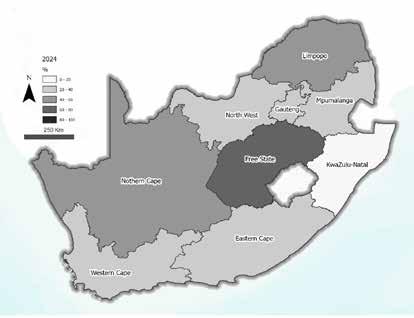
Major finding 3
The most used food-related coping strategy was “relying on less preferred and less expensive foods” with 46.9% of the population using this strategy at least once a week. The least used food-related coping strategy was “sending household member to beg for food” (10.2%). Food insecure households used all coping strategies more than food secure households.
Major finding 4
Food insecurity fully mediated the effect of SES on depression by 60% and on multimorbidity by 87.5%.
Major finding 5
Food insecurity is strongly associated with multimorbidity, anxiety and depression, measures of both physical and mental health, independent of SES and other demographic characteristics.
Research output from Wave
Three of this nationally representative data include:
Submitted or In Review:
Craig A, Mabetha K, Gafari O, Norris S.A. Health literacy, multimorbidity and its effect on mental health in South African adults: A repeated crosssectional panel study.
Gafari O, Craig A, Mabetha K, Hornby D, Hutton C, Barker M, Norris SA. The impact of food insecurity and the use of coping strategies on multimorbidity, anxiety and depression in South African Adults: A repeated crosssectional panel study.



The CoE-HUMAN will run the fourth wave of the nationally representative survey in 2025, which will be followed by results and output.
In April 2024, the CoE-HUMAN conducted a snap online survey with a sample of 5,000 respondents aged between 18 and 55 years, residing in five countries – USA, Malaysia, Kenya, South Africa, and the UK. The survey was concluded when 1000 respondents from each country completed the survey and were deemed valid for participation based on the following two criteria:
1. Through verified data audits of those respondents who participated in each country, in combination with multiple checks and linked to remuneration, only one response is possible from each respondent.
2. Furthermore, the recruitment was based on the individual level with an exclusion criterion that no two respondents could participate from the same household.
The topical theme of the survey focused on Preconception health and care, and we explored various topical issues that impact preconception health prior to conception and these included preconception health knowledge, attitudes, behavioural intent and preferences, among others. To assess preconception health knowl-
edge, attitudes, behavioural intent and respondents’ preferences prior to conception (relative importance of factors before pregnancy and preferred sources of health education/information), respondents participated in a structured survey comprising a series of targeted questions designed to evaluate their understanding, beliefs, and practices related to preconception health. The preconception health knowledge section adapted questions from a previously developed preconception health knowledge questionnaire covering reproductive life plans and history, sexual health, infectious diseases, medications, chronic diseases, mental health, tobacco use, alcohol and other substance use, nutrition, weight and physical activity, psychosocial stressors and environmental stressors.
The main survey findings were:
More than half of the respondents had self-reported adequate preconception knowledge (50.3%). The USA sample had the most respondents with good knowledge (13.8%), while Malaysia had the highest number of respondents with poor knowledge (42.5%).
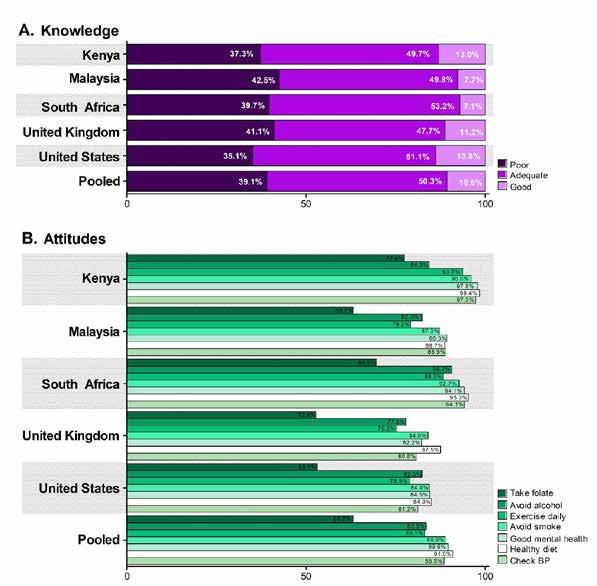
In the pooled sample of respondents, relationships and family emerged as the most critical consideration, following closely, physical health was ranked second. Mental health was identified as the third most important factor, financial stability ranked fourth, while living conditions, work or education, and climate followed in importance.
Preferred sources of health education/ information:
In the overall study population, clinic doctors were the most preferred source, followed by nurses in second, and obstetricians/gynaecologists in third. Pharmacists ranked fourth, while family and friends were the fifth choice. Internet and social media were ranked sixth, and magazines/newspapers were considered the least preferred source.
Craig A, Mabetha K, Stephenson J, Schoenaker D, Norris SA. Preconception health knowledge, attitudes and behavioural intentions among adults: A multi-country study (submitted and under review)
Most participants indicated they found avoiding alcohol (83.5%), avoiding smoking (88.9%), maintaining good mental health (89.6%) and eating healthily (91.0%) important. While taking folate was important to 63.2% in the overall study population, this was notably higher among respondents in Kenya (77.4%).
More than three quarters of respondents in each country reported that if they were planning a pregnancy, they would access preconception health care services if they were available at their clinic (≥79.1%).
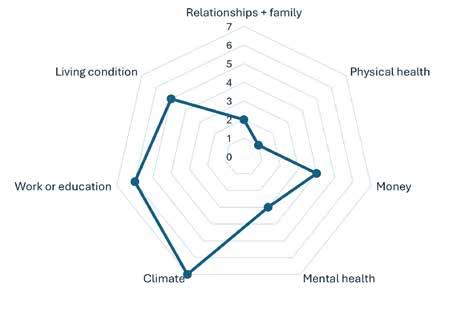


The voices of men about relationships, health research and
To improve health outcomes for all, we need to make space for men’s voices, ensuring that their lived experiences and beliefs find expression in public health research and health promotion. This is important considering gender disparities in health, which are widely established. Globally, women outlive men by an average of 5 years (WHO, 2016). The conditions that contribute to this disparity are more social than biological. One study suggests that “health-related beliefs and behaviours, like other social practices that women and men engage in, are a means for demonstrating femininities and masculinities.” Socially constructed beliefs about masculinity may lead men to adopt riskier than health-promoting behaviours.
In populations like South Africa where there are changing social norms about gender, men may struggle to find a voice, contributing to adverse health outcomes for them and their families. In the light of rising unemployment, we need to understand how these changing social norms and economic transitions may influence men’s perceptions about their role in the family and society. This study of men in Soweto assessed the interplay between men’s lived experiences, internal motivation and decisions about schooling and health. The project had two phases. Phase one assessed men’s perceptions about pregnancy and reproductive health research. Phase two assessed men’s lived experiences and motivation for completing high school.
The first phase is complete, and one manuscript was published in December 2023. A second manuscript will be submitted in October 2024. The studies show that pregnancies occur in a context of difficult relationship dynamics including the casual nature of the relationships. One father reported,
“I was just passing time, it was not something serious when it started; it just started when I started to find out that okay this woman is pregnant and then that’s when I started to say you know what let me pay more attention to this person who is pregnant now.”
Men’s involvement with the pregnancy involves navigating both internalised and external barriers such as
feelings of inadequacy due to factors like unemployment which are reinforced by social expectations for him to be the provider. The study also highlighted contradictions in how fathers relate to their different children due to barriers, as expressed by this father.
“I wanted a baby because of I have a child, I have a first born but I’m not that much participating with that child because of some other reasons, so when I realised that she might be pregnant, then man I said I want this child…”
Analysis of data from the second phase of the has resumed. These data relate to phase two assessed men’s lived experiences and motivation for completing high school. Data show that more boys than drop out of school than girls. This may influence their economic prospects further exacerbating their own and families’ negative health outcomes. Findings from this study may give insight into factors that drive these trends and how we can mitigate against them. One Masters student and a Post-

The UNICEF Caring for the Caregiver (CFC) package is a mental health promotion intervention that aims to mitigate the effects of adversity on caregiving and to reduce the impact of caregiving stress on caregiving practices. The package was designed by Prof Tamsen Rochat and Dr Stephanie Redinger, and through their current grant from the UNICEF Early Childhood Development sector they are currently overseeing the training, adaptation, implementation and research activities of the package across the globe. To date, our team has trained 192 train-the-trainer participants, 604 frontline workers, and more than 1000 caregivers have benefitted from receiving the intervention.
The current phase of the CFC project, which Prof Rochat and Dr Redinger have been working on since 2018, is a cumulation of a number of phases of development, field testing, co-creation with in-country teams, and revisions by different teams within UNICEF and WHO. Most notably, between 2012/2022 the revised package was tested in a large-scale validation project in 6 countries (Bhutan, Brazil, Serbia, Sierra Leone, Rwanda and Zambia), and the package was revised substantially based on the feedback from the in-country teams and the findings from this research project. The diagram below gives an overview of the CFC development process and current activities.
A highlight of 2023 was our training in Tanzania hosted by the UNICEF Eastern and Southern African Regional Office (ESARO) which was attended by Erinna Dia, the Associate Director (Global Lead) of Early Childhood Development within UNICEF. The training was also

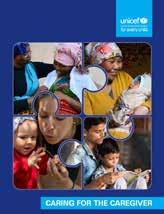
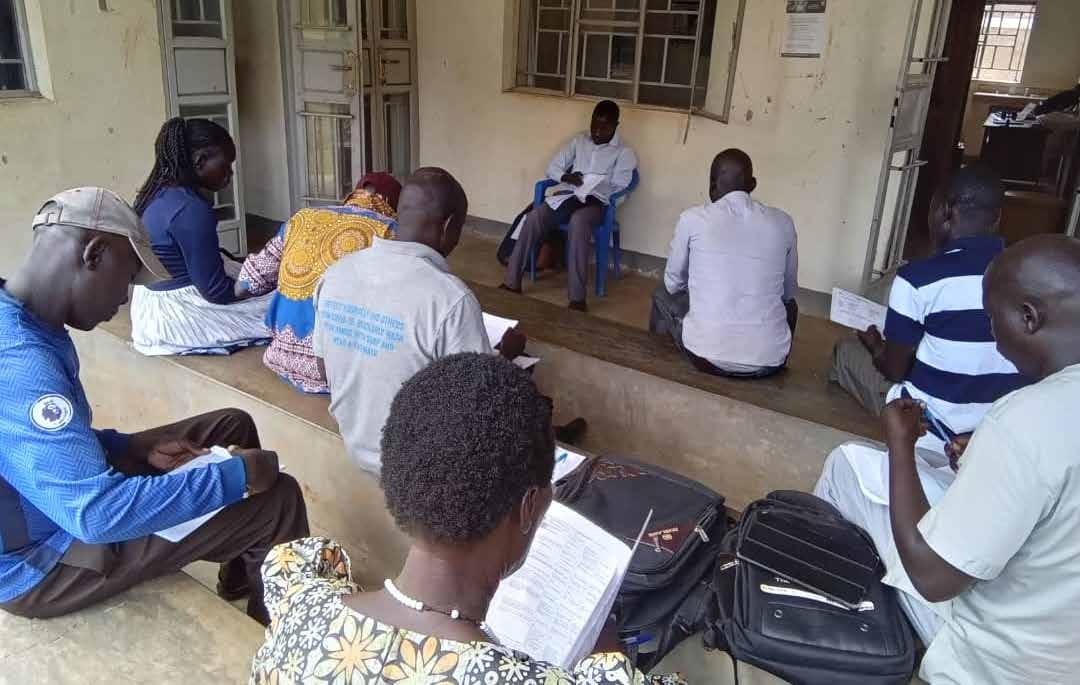
attended by regional UNICEF staff and Tanzania government officials.
In the past 6 months, the CFC training team (Suzanne Clulow and Fortunate Lekhuleni) have delivered training to 87 trainers in Zambia (n=23), Sri Lanka (n=39), and in Panama with the UNICEF Regional Office for Latin America and the Caribbean (n=25). Tunisia and Mali have upcoming trainings planned for November and December 2024.
These trainings have all gone very well with constructive engagements from these diverse groups. Feedback from the trainings will direct some of the future activities of the core CFC group, including completion of a supplement for adolescent caregivers, and the creation of a central online learning hub.
Currently, the revised Caring for the Caregiver package is being investigated in a quasi-experimental research project with a control group in Uganda. This research will evaluate the CFC training and implementation package with CFC trainers, supervisors, frontline workers, and caregivers and should result in multiple pub-
lications. Data collection for baseline and midline has been conducted and end-line will take place between November 2024 and January 2025. Caitlin Briedenhann who is helping with the co-ordination of this project will be doing secondary data analysis on some of this data for her PhD study.
The completed CFC package will be officially launched by UNICEF on 21 November 2024 at the New York Headquarters, and through an online webinar hosted by the Early Childhood Development Action Network (ECDAN). Prof Tamsen Rochat and Dr Stephanie Redinger will be travelling to New York for this event and have planned meetings and workshops with UNICEF staff around the future of the CFC package.
Interest in the use of the CFC package is growing daily, and the completed final package has been translated into French, with translations into Spanish and Arabic underway.
Research, publications and outputs
The results of this validation study have been written up for two publications- one focusing on the caregiver outcomes which is currently undergoing a review by all the co-authors, and a process evaluation-type publication is being drafted.
Boikoetliso Ba Boko (B3: exercising the mind) is an intervention prototype focused on adolescent and young people with a mental health condition. We aim to enrol 200 at risk young people (they will serve as their own controls) into the service over 18 months. By creating a dynamic and engaging therapeutic environment for those dealing with anxiety, depression and suicidal ideation living in Soweto, South Africa, we aim to improve access to mental health support for adolescents and young adults.
Physical building: The two-level building made from shipping containers is fully functional and equipped to provide a confidential and therapeutic space. B3 has four stations (Talk, Think, Feel, and Move) with different activities (PM+, mindfulness, emotional regulation exercises, and VR).

Additionally, the UNICEF Brazil country office is working on a publication using their own data from the project with support from the COE team.
Dr Redinger presented the CFC package at the 5th International Developmental Pediatrics Association (IDPA) Congress on 01/12/2023.
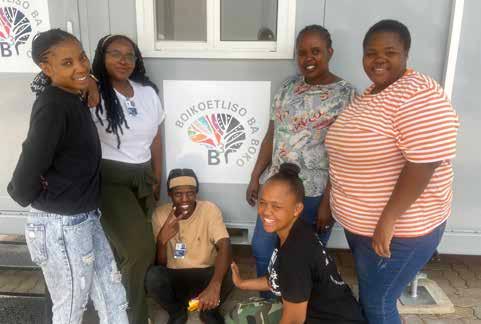
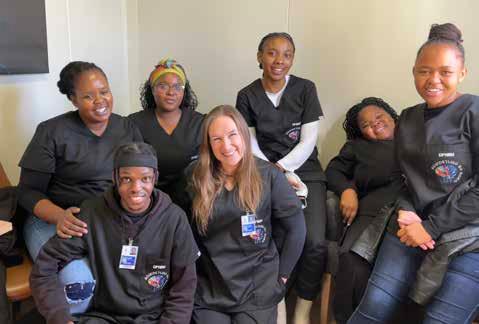
Ethics: B3 has ethical approval from the Human Ethics Research Committee of the University of the Witwatersrand (M231045 MED23-09-040) and is registered with the Pan African Clinical Trial Registry (PACTR202409702283764).
Staff: Our social worker (coordinator) and five certified (national qualification certificate) community health workers started in February 2024 and successfully completed a 4-week training programme to deliver the intervention. Staff receives weekly supervision and training as needed on site by our psychologist.
Implementation: Recruitment started on April 2024 and is currently open for recruitment. Thirty-five
participants have completed the intervention, and 30 new participants will be enrolled every 10 weeks. The process evaluation is ongoing and adheres to the MRC guidance on process evaluation of complex interventions, including focus groups and in-depth interviews with staff, participants, and caregivers.
Outputs: Presented the prototype as pioneering mental health in Africa at the Global Health Symposium, University of Southampton. Debate article “Adolescent mental health in sub-Saharan Africa: Crisis? What crisis? Solution? What solution?” currently under review with Global Health Action.

Mental health is one of five major non-communicable diseases (NCDs) with significant implications for global health, society, and the economy. Mental illnesses, including conditions like depression, anxiety, and childhood adversity, are classified as NCDs and are also important risk factors for diabetes and coronary heart disease. These NCDs are linked to several behavioural risk factors, such as poor diet, obesity, and physical inactivity, all of which are intensified by rapid urbanisation and the globalisation of unhealthy lifestyles. This cross-sectional mixed methods study, conducted by a team from DPHRU, aimed to evaluate the mental health and physical activity levels of 32 South African adolescents – 16 with normal weight and 16 who are obese – while also documenting the dietary habits of their families through photography. The researchers plan to use these images to

illustrate the diversity of food consumption and quantities across different families on a weekly basis. Given the rising prevalence of mental disorders and unhealthy lifestyle patterns among adolescents, this study focuses on high school students aged 14 to 19. Notably, 75% of mental disorders arise before the age of 25, with over half of young individuals experiencing mental illness at some point in their lives. Furthermore, approximately one-third of suicide attempts involve adolescents, as mental illness is a leading cause of disability and poor outcomes for youth, contributing to 45% of the overall disease burden in individuals aged 10 to 24. Despite these pressing issues, there are often limited management and treatment options available for adolescent mental health in low- and middle-income countries.
Mind-Food-Space is a quantitative and qualitative photographic observational study that currently takes place in an urban South African setting, specifically in households in Soweto. Soweto, a historically significant township known for its role in the anti-apartheid movement, spans over 200km2 and is home to approximately 1.3 million residents. In recent years, economic transformations have altered the landscape of food availability and choices, as well as physical activity engagement, largely due to the rapid development of shopping malls, fast food outlets, and improved transit routes.
The project is currently underway with an enrolment of 44% (14/32 households).
Informed consent procedures and survey questionnaires (mental health, childhood adversity, self-efficacy and physical activity) are conducted face-to-face, with a professional team overseeing the photographic processes. Consent is obtained at participants’ homes. Both the adolescent and any adult household member is issued a food record sheet to log all foods consumed and/or purchased daily for a period of 7 days. Trained fieldworkers measure anthropometric and blood pressure of the adolescent and any other household members at the home. Furthermore, daily physical activity is measured using wrist-worn accelerometers. Adolescents are required to wear these monitors continuously for 7 days, allowing us to analyse time spent in sed-

entary, light, moderate, and vigorous physical activity. Once data collection has finished, in-depth interviews are conducted with adolescent participants to explore their experiences and perceptions of their food and physical activity environments, aiming to gain a deeper understanding of their lived experiences.
The project will produce the following outputs: two peer-reviewed scientific journal articles; one media brief (The Conversation piece) and one NRF (CoE-Human) nugget.
Ngeyethu Info is an app designed to support South African women through their first year of motherhood, which is contextually relevant, links into public services, is established to improve early childhood development, and is freely accessible for all mothers, thus being considerate of the economic circumstances for many women in South Africa. The potential impact of roll out of such an app includes improvement of maternal and child health during the first year of life, optimising early childhood development, the knock-on economic effect of improving these outcomes, as well as the longer-term intergenerational effect this may have.
Currently the app is in the final stages of development, following which user interface testing will be conducted. The app includes the following:
Baby calendar with milestones tracker
Baby growth charts which plot as new measurements are added and provide messaging if growth is indicating any concern, and allow for extraction of growth data over time
Motor and cognitive development questionnaires which can be extracted and analysed
Linkage to local services that are trusted and functional
Weekly content based on baby’s age and developmental stage
A resource portal with a search function for specific
The app can be adapted to:
Include content for pregnancy, as well as beyond the first year of life
Offer translation into relevant languages
Be data free
Integrate families and partners
Offer specific content for intervention purposes with reporting outcomes
Be implemented into current service offering and programmes




Following 12 months of using the prototype app amongst 73 participants:

Ngeyethu can address current gaps in existing digital offerings for mothers in South Africa including:
Provide an integrated digital app for pregnancy and postpartum and inter-pregnant
Can be modified, updated and extended to include more content, features or data collection tools
Remote data collection allows for better evaluation of impact
Provides linkages to health services
Can include linkages to health records
Allows for regular monitoring and growth and development tracking
Can include family and partners
Content is designed for the community by the community – feasible and acceptable
Data free – can be used on multiple devices
Can be translated to all languages
Content is practical, visual and easy to understand
Content aligns with RtH and SidebySide services
Targets a younger generation of mothers
Publication output linked to this project:
Prioreschi A, Pearson RM, Richter L, Bennin F, Theunissen H, Cantrell SJ, Maduna D, Lawlor DA, Norris SA. Protocol for the PLAY Study: a randomised controlled trial of an intervention to improve infant development by encouraging maternal self-efficacy using behavioural feedback. BMJ Open. 13:e064976. doi:10.1136/bmjopen-2022-064976
Bennin F, Norris SA, Prioreschi A. Determining the perceived acceptability of an intervention designed to improve health literacy around developmentally appropriate play during infancy, with a community advisory group of mothers, in Soweto, South Africa. PLOS Global Public Health. 2024 (in press)
Publications under review/in preparation
Bennin F, Norris SA, Prioreschi A. “The app was not just helping me, but all of us at home”: Exploring the feasibility and acceptability of an intervention aimed at improving maternal health literacy around play and development in Soweto, South Africa.
Bennin F, Norris SA, Prioreschi A. Health Literacy and Participation in Play: Determining whether a co-created intervention resulted in increased Health Literacy, specifically related to participation in play, in mothers of infants in Soweto, South Africa
Theunnisen H, Dennis CL, Prioreschi A. Formative research to co-create & test acceptability of intervention content designed to improve breastfeeding self-efficacy
Conference/seminar presentations
Prioreschi A. The Ngeyethu Info App. Preconception Health and Care: Window of Opportunity to Tackle the NCD Burden, SAMRC Pretoria, South Africa. 2024
Prioreschi A. Feasibility and preliminary findings from the PLAY Study: A randomised controlled trial to improve maternal self-efficacy for promoting infant growth and development. Johannesburg Health District Research Committee: Enhancing PHC service delivery outcomes through research. Johannesburg, South Africa 2024. Oral presentation
Bennin F, Norris SA, Prioreschi A. Determining the perceived acceptability of an intervention designed to improve health literacy around developmentally appropriate play during infancy, with a community advisory group of mothers, in Soweto, South Africa. Oral presentation. International Society for Behaviour, Nutrition and Physical Activity. Omaha, USA. 2024. 17-20 May
Theunissen H, Dennis CL, Prioreschi A. Formative Research to co-create and determine the acceptability of intervention content designed to improve breastfeeding self-efficacy and outcomes in Soweto, South Africa. Oral presentation. International Society for Behaviour, Nutrition and Physical Activity. Omaha, USA. 2024. 17-20 May

Globally, children in low-income settings face multifaceted challenges in their health, wellbeing and overall nutrition. Despite international efforts, including the 2012 World Health Assembly nutrition targets, childhood malnutrition remains a persistent global challenge. This challenge is particularly true for developing and the least developed nations such as countries in South and East Asia as well as Africa.
Childhood malnutrition poses a threat to the development and health of children. South Africa has made significant progress in programmes and nutrition policies aimed at improving child health outcomes. These include social protection programmes such as the child support grant, which serves as a protective factor against poverty and food insecurity for children and their families. Despite these improvements, stunting and overweight are on the rise. Approximately 27% of children are stunted, while 13% are overweight, indicating a complex interplay of dietary habits and socioeconomic factors resulting in what is now referred to as the double burden of child malnutrition.
While poverty is not a new phenomenon in the country, the recent Covid-19 pandemic has left many families grappling with economic inequality. When households struggle to maintain their livelihoods, children become vulnerable to poor nutritional outcomes and maybe directly linked to poor health outcomes. Recent data in South Africa indicates that over 62.1% of children are multidimensionally poor and live below the upper-bound poverty line. This economic shock has been a setback to the progress that was made in achieving the sustainable development goals such as no poverty (SDG1), zero hunger (SDG2), good health and wellbeing (SDG3) and reduced inequalities (SDG10). The relationship between childcare arrangements and child nutri-
tion is also crucial in understanding the broader context of malnutrition in South Africa.
Dr Matshidiso Sello’s project entitled “The interplay between household economic shocks, childcare arrangements and childhood malnutrition in South Africa” aims to explore how economic shocks affect care arrangements at home and, subsequently, child malnutrition in South Africa. Dr Sello aims to use the longitudinal Communities of Practice for Social Systems Strengthening for child wellbeing (CoP dataset) by employing a comprehensive analytical approach which includes descriptive statistics, bivariate statistics, multivariate statistics, and decomposition analysis. By examining these interconnected factors, the study seeks to provide insights that can inform policy interventions aimed at improving child health outcomes and ensuring food security for vulnerable populations. Understanding the interplay of these elements is crucial for developing effective strat-
egies to mitigate the adverse effects of economic instability on children’s nutrition outcomes and overall wellbeing. Overall, Dr Sello’s study aims to achieve the following objectives:
Describe the prevalence and types of economic shocks experienced by South African households.
Examine the relationship between economic shocks and changes in childcare arrangements.
Analyse the impact of different childcare arrangements on child malnutrition outcomes, considering factors such as caregiver type, caregiver education, and household food security.
To provide policy recommendations for enhancing support systems for families and ECD centres during economic downturns.

Non-communicable diseases (NCDs), also referred to as chronic diseases, are typically characterised by long durations and arise from a combination of genetic, physiological, environmental, and behavioural factors – many of which are still poorly understood. It is noteworthy that an estimated 67% of global NCD deaths occur in low- and middle-income countries
(LMICs), with approximately half of these preventable deaths impacting individuals younger than 70 years of age and 45% occurring among economically active individuals aged 30 to 59. In South Africa, NCDs account for 6 out of 10 of the top causes of mortality and morbidity. Conditions like diabetes, stroke, ischemic heart disease, depression, and anxiety disorders rank among the top
ten causes of years lived with disability, imposing significant costs on patients, families, communities, and the healthcare system, especially in resource-limited rural settings.
This burden should be of great concern to South Africans, as they live in the most income-unequal nation on earth, which is a barrier to health care access. Currently, black South Africans, who are also the most deprived, have the highest age-standardized mortality rates due to cardiovascular diseases and the highest proportion of disabilities compared to other racial groups. The Vhembe district in South Africa, classified as Quintile 2, is economically challenged, with a high unemployment rate and lower educational attainment compared to the national average. It has the highest number of deprived schools in Limpopo Province, with disability or illness being the primary reasons for non-attendance. The district experiences a quadruple burden of disease, with NCDs becoming the leading cause of adult deaths, accounting for 32.4% of premature deaths in 2011. Cardiovascular diseases and diabetes are particularly prevalent. Challenges in assessing and addressing NCDs include the lack of an active household-based NCD risk screening program and limited data on NCD risk factors.
Recent data on causes of death and NCD risk factors are scarce, with the latest district-level report dating back to 2015. Non-communicable diseases (NCDs) remain a substantial health challenge in rural areas like the Vhembe district, where resources for adequate healthcare are limited. Limited studies have reported obesity and hypertension prevalence in specific populations, but comprehensive data on NCD risk factors is lacking. To effectively combat the growing NCD burden, a research study that combines household-based NCD risk screening with a linkage to care referral system to PHC and Biokinetics services, including an assessment of the benefits of sustained exercise required. This approach will enable a better assessment of NCD risk levels, prevalence, and behaviour change monitoring.
Dr Gudani Mukoma’s project entitled “Household Non-Communicable Disease Risk Factors Screening in Rural, Resource-Limited Settings: Advocating for Community-Based Biokinetics Practice and Early Detection” aims to evaluate the viability and practicality of a Biokinetic household NCD risk screening, analyse stakeholders’ perspectives on NCD prevalence, the urgency of
addressing this challenge, and potential solutions. Additionally, an exploration of Bio kineticists’ insights into the burden of NCDs, their roles in screening, facilitating linkage to care, and proposing interventions to mitigate their impact will be conducted. This will be achieved through:
Exploring community members’ knowledge, understanding and awareness of the prevalence of non-communicable disease (NCD) and the screening methods utilised to identify their risk factors.
Capturing perspectives of key stakeholders including community leaders, non-governmental organisations (NGOs), primary healthcare professionals, governmental health agencies, and academics regarding the prevalence of NCDs in South Africa, particularly within rural communities.
Exploring the insights of Bio kineticists concerning the growing burden of NCDs, their involvement in screening for NCD risk factors, linkage to care for individuals at risk, and their proposed interventions to mitigate the impact of NCDs within rural settings.
Conducting a household-based NCD risk factors screening programme to screen adult community members as part of the Biokinetics work integrated learning (WIL) programme.

The CoE-HUMAN has proactively made progressive efforts over the years to foster collaborative research agreements with Historically Disadvantaged Institutions (HDIs). These collaborations have been in the form of engaging with and supporting research conducted by the HDIs, that promote research excellence and capacity development within the field of human development. In 2022, three HDIs received grant awards namely University of Mpumalanga (grant awarded to Prof. Geoffrey Mahlomaholo); Durban University of Technology (grant awarded to Prof. Gugu Mchunu) and University of Limpopo (grant awarded to Prof. Eric Maimela). In 2023, two additional grants were awarded to Nelson Mandela University (grant awarded to Dr. David Morton) and University of Zululand (grant awarded to Dr. Sheetal Bhoola). In the current year (2024) two grants were awarded to University of Venda (grant awarded to Prof. Ademola Jegede) and University of Fort Hare (Dr Leocadia Zhou). A showcase of the various research projects conducted by the five HDIs is as follows:
Recent media reports stipulate that thousands of South African children have died from acute malnutrition over the last five years (May, et al., 2020). Since 2019 till date, approximately 2818 children have passed away in South African public hospitals. This count excludes the number of children that have passed away in other spaces. Over the last 20 years, the South African government
adopted a number of food and nutrition policies to eliminate child hunger, and malnutrition amidst South Africa’s children. Despite this, the statistics indicate that the number of stunted, wasted and underweight children continue to stagnate or increase. Stunting statistics has remained considerably high for an upper-middle income country like South Africa which has a thriving
economy in comparison to the rest of South Africa (May, et al., 2020).
The province of KwaZulu-Natal in South Africa has recorded the highest number of hungry and malnourished children in comparison to other provinces (Cleary, 2020). Children between the ages of one and five years living in this province, Gauteng and the Free State have the highest ratios of stunted growth in South Africa (Mabuza, 2018). Some children experience child neglect because of a number of socio-economic factors, locality and poverty.
Dr Sheetal Bhoola’s project entitled “An investigation of child malnutrition and neglect in KwaZulu-Natal” seeks to determine the prevalence of malnutrition, child hunger and child neglect within the UThungulu District in KwaZulu-Natal by identifying and understanding the various ways in which children experience neglect and malnutrition. Dr Bhoola’s study aims to:
To investigate the types of acute malnutrition that is most prevalent in the Uthungulu District.
To determine its interconnectivity to child hunger and child neglect (lack of resources that allow children to be hygienic and lack of adult care).
To contribute towards effective and appropriate measures to minimise the high ratios of malnourished children in KwaZulu-Natal.
Intended Activities and outcomes:
The results will be disseminated via a report, 3 journal articles and 2 newspaper publications.
To disseminate findings and research at various stages at international and local conferences.
An intended collaboration between The University of Zululand and The Interdisciplinary Centre of Childhoods Societies at The University of Wuppertal, Germany https://www.izkg.uniwuppertal.de/. In addition, this collaboration can benefit more than one department (Sociology & Consumer Science) within the Faculty of Humanities and Social Sciences at The University of Zululand.
This engagement will promote the exchange of scholarly knowledge and expertise between these 2 academic institutions and create learning opportunities for other scholars at The University of Zululand. The possibility of long-term research networks between these 2 institutions can be
pivotal for The University of Zululand. This initiative can contribute to global awareness of both these institutions that are represented in this study. Dialogues, seminars and webinars can be held in the future to address pertinent issues such as The Global targets of nutrition (2025) that should be aligned with the South Africa’s urgent goals to address food insecurity and malnutrition after the onset of the Covid-19 pandemic. This collaboration can culminate in the exchange of knowledge idea and research expertise.
Dr Bhoola presented initial desktop research findings (literature review) at 2 conferences. One international and one local. Please see details:
International Sociological Association World Congress – Melbourne, 28th June 2023: “The importance of impact evaluations of corporate social responsibility programmes and government food and nutrition programmes for South African children”
The University of Zululand’s Faculty of Humanities and Social Sciences Annual Conference –Empangeni, Umfolozi Hotel, 12th and 13th October 2023: “Child Neglect as a contributing factor towards the prevalence of Malnutrition in KwaZulu-Natal”.
During the month of May, Dr Bhoola and her colleagues visited the Research Centre “Childhoods Societies” of the University of Wuppertal with the intention to collate and analyse secondary data at the institute. This task was successful and thereafter they delivered guest lectures to students at the institution on malnourished children in South Africa. The trip was successful and purposeful. The meeting engagement elicited key thematic sections for the study. Since then, Dr Bhoola and her colleagues have continued to collect all the primary data required for the study.
In October 2024, Dr Bhoola and her co-researchers presented secondary data research (a comparative study on nutrition policies in India and South Africa). This will culminate in the publication of four papers in 2025.
Public transport is an essential part of everyday life for many South Africans. Although the National Land Transport Act specifically provides for the safety of passengers, with access to safe public transport being essential for women, particularly those who reside in under-resourced communities, there is paucity of work done in South Africa regarding young women and girls’ safety experiences when utilizing public transport and the dangers they face. Very little is known about how South African women and girl commuters feel about their own safety on their daily rides, or about how they believe safety could be optimized, and about the impact of sexism on their wellbeing in relation to users of public transport. Prof Gugu Mchunu’s exploratory project entitled “Optimising safety for women and young girls’ minibus taxi commuters in Durban” aims to provide a baseline study to contribute to the paucity of research in this area through a scoping review alongside an ethnographic approach to answer the key research questions.
The project has now been granted provisional ethics clearance, with a condition to conduct a pilot study. The project team has started conducting this pilot study and doing data analysis concurrently. The findings of the pilot study will also be included in the final report and publication that emanate from this project.
The Scoping Review paper titled “Public transport systems and safety of female commuters in lowand-middle- income countries: a systematic scoping review" has been revised and a decision pending from the BMC Women’s Health journal. Lastly, a post-doctoral fellow has been allocated to work on this project which will allow the research work to continue. This publication serves as a key milestone in consolidating the initial findings from the literature and establishing the foundation for the broader study.
Data collection will be completed in 2025 which will be followed by 2 publications, conference attendance and at least one dialogues session.
The more one explores the challenges encountered by family caregivers of persons with dementia the more one realises the relevance of this study. Currently, based on informal discussions with various stakeholders in the Nelson Mandela Bay the public health care system is not providing adequate support to persons living with dementia and their families. The primary health care system where such individuals initially seek assistance is not suitably equipped to care for people with this condition. The primary response is to refer the patients to Livingstone Hospital’s outpatient department and Dora Nginza Hospital’s 72-hour psychiatric unit, where there is a psychiatrist who can assess the patients. Hence, the continuum of care which is critical to maintain the health of patients with dementia is undermined as the patients and their families are left to manage alone.
The Nelson Mandela University’s Research Ethics Committee issued the ethical clearance letter on the 12th of June 2024 with the clearance number: H23-HEANUR-020. It expires on 12th of June 2025. The Department of Health permission letter to conduct the study was issued on the 13th of June 2024 with the following number: EC_202406_008. The Nelson Mandela Health District clearance from the district manager, Dr L.P. Mayekiso was issued on the 26th of June 2024.
We have begun meeting on a weekly basis since the 26th of August 2024. Each Monday, at 9.00am we meet for a period of 30 minutes to an hour. At this stage it is the researchers together with Ms Gouws who are meeting each Monday. We are finding it helpful to have regular meetings to maintain momentum considering we all have busy workloads at the university.

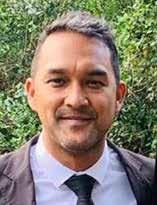


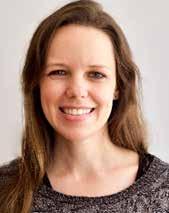


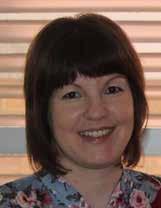
The support team consists of Ms Lisa Gouws (research administrator); Ms Claudine Wittenchinskey (RN, field worker); Ms Nomawethu Vamva (PhD student, field worker); Ms Mariana Spagadoros (RN, field worker/admin)
Research activities
Dr Heather Rauch
Dr Morton and Dr Smith met with Dr Heather Rauch who is Regional Manager of Association for Dementia and Alzheimer’s of South Africa (ADASA, Eastern Cape Branch) on two occasions (7 March and 26 September). Dr Rauch is a social worker who works closely with the families of relatives living with dementia. She was able to give us greater insights into the public health care system regarding care and support for patients with dementia and their families.
Dr Navsaria had informal meetings with two professional nurses at two different clinics regarding care and support of patients with dementia and their families. Based on the conversations it appears that there is very little support for such individuals and that it seems that the clinics almost always refer patients with dementia and their families to the outpatient’s department (OPD) at Livingstone Hospital. A psychiatrist at the OPD is able to diagnose and prescribe treatment. However, there appears to be little support at the clinic level. Based on the above it was decided to begin with handing out the survey questionnaire to the community health workers (CHWs).
We chose the Alzheimer’s Disease Knowledge Scale for the knowledge questionnaire for the CHWs. Professor Brian Carpenter from Washington University in St Louis, who was one of the developers of the instrument, gave written permission to use the questionnaire. We had the questionnaire translated in isiXhosa and Afrikaans by professional translators. Our resident language experts, Dr Smith (Afrikaans) and Ms Ntleko (isiXhosa) checked the translations, and changes were made to ensure that the language was understandable by the CHWs. Colloquial language was used where relevant.
We conducted the pilot study on Friday, the 18th of October 2024. Dr Morton liaised with Sr Koll the manager of Sub-district C who gave the go ahead to contact Sr Lackay the facility manager at Linton Grange Clinic, which was the clinic chosen for the pilot study/pre-test. The CHWs across Nelson Mandela Bay only visit the clinics on a Friday for a meeting with the outreach team leader (OTL). Hence, the field worker, Ms Vamva went to the clinic on a Friday. There are six CHWs at the clinic and they meet at the clinic’s satellite which is based at Metlife Plaza Shopping Centre. All six CHWs completed questionnaires. The CHWs were all given a small chocolate as a gesture of appreciation for their time. The members of the team are currently reviewing the questionnaire and it is planned that the field workers will enter the field to distribute the questionnaires for the “main” study in the week of the 28th of October.
After discussions with different experts in the field, it was felt that the study needs to spend more time on exploring the current health care system and how it serves people with dementia and their families. For this reason, the researchers will now focus on interviewing key informants or experts of dementia in the Nelson Mandela Bay Municipality. This will help us to compile a “picture”/situational analysis of the services available for people with dementia in the metro. In addition, we realised that nurses in the clinics also appear to be lacking in knowledge of dementia and therefore, it was decided that we also need to give nurses the same questionnaire as the CHWs. This will give us an idea of their knowledge needs because it appears that both CHWs and nurses need training. As a result of these changes, we need to request permission from our REC-H committee to have these changes approved and an amended ethical clearance letter issued.
The CoE-HUMAN is saddened to announce the passing of Prof Sechaba Geoffrey Mahlomaholo. Prof Mahlomaholo was one of the awardees who had a collaborative research agreement with the CoE-HUMAN since 2022. His project entitled “Creating Sustainable Higher Education Learning Environments towards increased Levels of Employability among Students and Youth” aimed to explore, experiment, intervene and document the strategies that could be used to promote increased levels of employment among youth in general, including youth who have graduated. Prior to his passing, Prof Mahlomaholo worked with 129 unemployed youth, with his project being supported by the National Youth Development Agency (NYDA) officials in Mpumalanga through conducting information and training sessions on various effective ways of compiling CVs among other activities. Following his passing, the project has been put on hold and plans are currently underway to get another researcher to conclude Prof Mahlomaholo’s project.
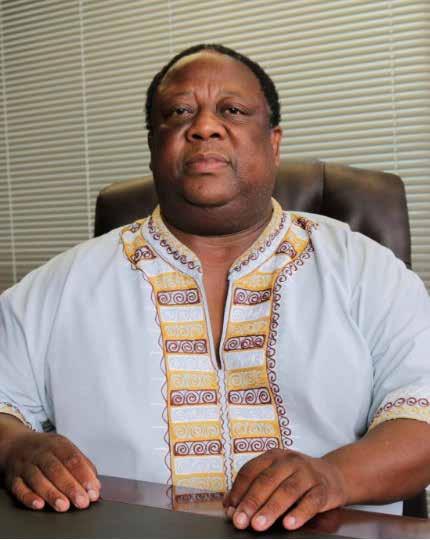
The CoE-HUMAN wishes to express its heartfelt condolences and share its deepest sympathies with his family, friends and colleagues. Prof Sechaba’s work has made a significant impact to Human Development and his contributions will be remembered. May his soul rest in peace.
Impacts of climate change include slow onset events and extreme weather events which may both result in losses and damages Studies show that these can take the form of Economic Losses and Damages (ELD) and Non-Economic Losses and Damages (NELD). The ELD affects income (business operations, agricultural productions and tourism), and physical assets (infrastructure and properties, while the NELD affects individuals (life, health and mobility), society (territory, cultural heritage, indigenous knowledge and societal cultural identity) and the environment (biodiversity and ecosystem services). a core aspect of the right of populations to subsistence and conservation as envisaged in key provisions of international human rights instruments. Both the ELD and NELD may weaken socio-ecological development in that they undermine the sustainable use of resources,which itself is a core aspect of the right of populations to subsistence and conservation as envisaged in key provisions of international human rights instruments.
Generally, South Africa is party to a range of instruments on climate change but vulnerable to climate slow and sudden onsets. Its economy is sensitive to climate factors as it relies on economic sectors which include agriculture, forestry and tourism. Also, South Africa is a largely semi-arid region, characterised by a highly variable rainfall, leading to both significant droughts and/or floods. It is predicted that the effects of climate change may cause the country to experience temperature increases of 4°C by the year 2100. The Vhembe District municipality is one of the 5 districts of the Limpopo province of South Africa. By 2050, the district is projected to be affected by higher annual average temperatures, which will adversely affect water and food security. Evaporation rates will likely increase, and agricultural outputs may reduce. Hence, establishing and understanding both the ELD and NELD resulting from impacts of climate change and their intersection with socioecological and transformational development are relevant to developing an effective response.
Scholarship related to losses and damages associated with climate change in the Vhembe municipality is undeveloped. Even less so is its interface with socio-ecological and transformational development indices in the community. This is problematic in that without addressing the knowledge gap, the trend pattern cannot be well established and the fundamental changes in societal values, institutions and practices needed to address climate change and ensure transformational development will remain poorly understood, let alone implemented.
Professor Ademola Jegede’s project entitled “Assessing Climate-related loss and damage impacts on Socioecological and Transformational Development in Vhembe
One of the key findings of the Millennium Ecosystem Assessment was that, globally, ecosystem services are in a state of decline due to factors such as climate change, which is likely to have negative impacts on future human welfare. According to the projections by United Nations, the world temperature will exceed 1.5 and 2.5 °C by 2035 and 2100, respectively. Consequently, climate change impacts the environment and society, particularly rural small-scale farmers in the Raymond Mhlaba Local Municipality (RMLM), of the Eastern Cape Province, South Africa. These unpredictable rainfall and rising temperatures exacerbate food insecurity for these farmers who rely on rain-fed agriculture. Frequent droughts challenge their livelihoods as they have limited access to climate technologies and adaptive strategies. As a result, these will hamper the fulfilment of United Nations’ Sustainable Development Goal (SDG) 13 of Climate Action, which calls for immediate action to address climate change and its consequences (United Nations, 2022).
Research findings within sustainable food production indicate that a limited grasp and skillset could worsen the impacts of climate change (Wheeler & von Braun, 2013). Additionally, relying on resource consumption methods leads to ongoing environmental damage, jeopardizing community well-being in the long run. Despite promoting eco-approaches, the implementation of the South African National Climate Change Response Policy lacks local effectiveness (Walker & Schulze, 2008).
District Municipality, Limpopo Province” aims to assess both the ELD and NELD resulting from climate change and their intersection with socioecological and transformational development in the Vhembe Municipality, Limpopo Province, South Africa. This will be done by:
Establishing the connection between ELD and NELD with climate change trend in the municipality.
Profiling the interface of ELD and NELD with socioecological and transformational development.
Informing policy decision making on the development of climate – resilience and sustainable development strategies in the Vhembe Municipality.
Dr Leocadia Zhou’s project entitled “Stakeholder Engagement for Climate Action in Raymond Mhlaba Local Municipality” intends to address these challenges by promoting the adoption of eco-farming techniques and educating communities on the importance of responsible resource usage. This aligns with the municipality’s Integrated Development Plan (IDP), which aims to strengthen community engagements, civic education and enhance access to economic development for vulnerable population groups (Raymond Mhlaba Municipality, 2024). In addition, the study aims to develop the community’s ability to adapt to climate change, promote sustainable soil and water resource use, and improve food security while also fostering sustainable development efforts in the long term (Mutengwa et al., 2023). Implementing climate strategies like cultivating drought-tolerant crops and employing water-saving methods can enhance food security and lessen the challenges encountered by small-scale farmers in the Eastern Cape region (Fischer et al., 2007). In addition to IDP, these could also assist farmers in contributing to 2030 National Development Plan mandate of “An Integrated and Inclusive Rural Economy”, which aims at ensuring food security, job creation and wealth creation. Thus, the overall main objectives are:
To assess the impacts of climate change on local ecosystems, communities, and agriculture.
To develop tailored solutions that address local challenges and create awareness with stakeholders.
The first Accelerated Postdoctoral (AP) training programme, led by Wits Professor Shane Norris, was first launched in August 2021. The aim of the programme fellowship aims to develop postdocs to Senior Researcher level within two years. The programme involves mentoring, academic writing, project planning/implementation, data analyses and career strategy implementation. The first cohort finished the programme in 2023, and the second cohort is currently in its second year of the programme. The CoE-HUMAN welcomed the third and fourth cohort between April and June 2024 and the two cohorts are currently participating in a structured group learning model that will further develop their research capacity and scientific leadership skills for the next two years.
Disruptive Mood Dysregulation Disorder from a Polyvagal perspective. She received her PhD in 2020 from Wits. Michelle’s research interests include the relationships between physiology and cognition and the role of the autonomic nervous system in mental disorders and physical diseases, particularly hypertension and dementia.
Dr Johanni Beukes is a Postdoctoral Fellow at the SAMRC
Developmental Pathways for Health Research Unit, Department of Paediatrics, funded by the Centre of Excellence (CoE) in Human Development, University of the Witwatersrand.


Dr Michelle Leal is a Postdoctoral Fellow at the SAMRC Developmental Pathways for Health Research Unit, Department of Paediatrics, School of Clinical Medicine, Faculty of Health Sciences, University of the Witwatersrand (Wits), Johannesburg, South Africa. Before this, she held a postdoctoral research position at the Neuroscience Research Laboratory, School of Human and Community Development, Wits. Dr Leal obtained a BA in Psychology and Information Technology in 1999 from the University of Johannesburg (UJ), formerly known as the Rand Afrikaans University. She completed her Honours in Psychology (2001) through the University of South Africa (UNISA). Her keen interest in both psychology and physiology prompted her to pursue a Masters degree at the University of the Witwatersrand in 2015, which was subsequently upgraded to a PhD. Her thesis explored
Dr Beukes holds a Bachelor of Science degree in Human Physiology, Genetics, and Psychology (University of Pretoria), a Master of Arts in Research Psychology (University of South Africa), and a PhD in Psychology (University of the Witwatersrand). Dr Beukes is an HPCSA registered Research Psychologist and EEG Technician and has been a board member of the Biofeedback Society of South Africa (BFSA) since 2022. Dr Beukes also received her certification as a Neurofeedback Practitioner through the Biofeedback Certification International Alliance (BCIA) in 2019, which has enhanced her expertise and credibility in the rapidly developing field of Neurofeedback Training or Neurotherapy. Dr Beukes’ research interests lie in health psychology and neurorehabilitation, with a special interest in the application of quantitative electroencephalography (qEEG) and Neurofeedback Training in diagnosing and treating neurodevelopmental disorders. Her focus is on exploring innovative methods to improve mental health and cognitive functioning, aiming to develop effective alternative interventions for mental health conditions. Her research aims to increase our understanding of the neurophysiological underpinnings of psychological health.

Dr Stephanie Alcock is a post doctoral fellow at the DSI-NRF Centre of Excellence in Human Development at the University of the Witwatersrand. She completed her Bachelor of Arts in 2016, majoring in Psychology and English Literature, followed by an Honours degree in Psychology in 2017. During her Honours studies, she developed an interest in cognitive neuroscience, a field she further explored during her Masters program. Her Masters degree was later upgraded to a Doctoral program, culminating in her PhD in 2021. Her doctoral research focused on developing and testing an explanatory model of creative cognition in the elderly, employing structural equation modelling (SEM) to uncover the cognitive processes that underpin creativity in this demographic. The findings from her work have made significant theoretical contributions to our understanding of creativity and cognitive ageing. As a result of this research, she developed a keen interest in the stages of late-life development developmental stages of older adults, with a particular focus on the dynamics of healthy and non-healthy cognitive ageing.
Studies at the University of the Witwatersrand teaching on the State, Bureaucracy and Public administration as well as on Theories of Liberty, Justice and the Politics of Difference. Dr Thompson’s current research explores conceptions of fatherhood and the roles of fathers in preconception health as derived from the perceptions of young men, this also includes exploring institutional mechanisms to incorporate fathers into preconception health and early childhood development through exploring a ‘non-gendered’ approach to preconception health.
Dr Monica Ewomazino Akokuwebe


Dr Urlridge Thompson holds a MA and PhD in Political Studies both from the University of the Witwatersrand. His PhD thesis explored the relationship between race and the conception of skill within the post-Apartheid local state with the aim of advancing an expansive conception of skill through the use of the race-skill interface and the sociology of skill as analytical tools. The ethnographic research for his thesis was conducted at the Govan Mbeki Local Municipality within the Department of Technical Services, Mpumalanga Province. Dr Thompson’s research interests include theories of the State, Institutions and their role in advancing State Capacity as well as Governance, Public Administration and Public Policy. He is also interested in exploring a socio-historical approach to the study of the state and its bureaucratic apparatus; this includes exploring epistemologies of the ‘Black state’ and how the state is conceived historically and at the contemporary juncture from and within the locus of Blackness. Dr Thompson has also been a sessional lecturer within the Department of Political
is a Sociologist and Demographer with seven years post-PhD experience. She is a postdoctoral research fellow with the SAMRC Developmental Pathways for Health Research Unit, Department of Paediatrics, School of Clinical Medicine, Faculty of Health Sciences, University of the Witwatersrand, Johannesburg, South Africa. Dr Akokuwebe has an interest in life course epidemiology, social gerontology, and psychodemographics (grouping of psychographics and demographics to determine behaviours and motivations). She has extensive experience in mixed methods through analysing large-scale nationally representative retrospective and prospective datasets. With a particular focus, Dr Akokuwebe’s current research is hinged on life course approach to chronic diseases epidemiology. She particularly has a skill in the development of implementation science protocols using the life course health development (LCHD) notably in the form of primordial prevention, the prevention of exposure to risk factors and designing prevention strategies for chronic diseases through multi-level health development pathways. Dr Akokuwebe aspires to build an evidence-base of impact on chronic disease management, self-efficacy and quality of life that shapes health distributions within and across populations in Africa.
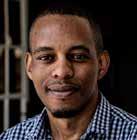
Dr Raylton Chikwati recent ly joined the Accelerator Programme, working under the guidance of Professor Shane Norris. He earned his PhD in Chemical Pathology from Wits in 2023, with his research focusing on the midlife and the scarcity of information regarding the role of menopause in cardiometabolic disease risk factors in sub-Saharan Africa and other low- and middle-income countries. Following this, Dr Chikwati has worked as a postdoctoral fellow at the Sydney Brenner Institute of Molecular Bioscience (SBIMB) within the university. During his year at the SBIMB, Dr Chikwati’s work focused on the incidence of type 2 diabetes mellitus and identifying its driving factors within a sub-Saharan cohort of nearly 12,000 individuals. In his first year at the DSI-NRF Centre of Excellence at Wits, Raylton received a Meade collaboration travel grant in epidemiology, which allowed him to travel to the University of Bristol. There, he collaborates with Professor Deborah Lawlor and her team honing his expertise in genetic epidemiology. His research in Bristol focuses on exploring the causal links between obesity, type 2 diabetes, and hypertension in sub-Saharan African populations, using Mendelian randomization. Dr Chikwati is excited to be part of the Accelerator Programme and views it as an invaluable opportunity to further develop his research skills, build local and international collaborations, and contribute to advancing public health knowledge in sub-Saharan Africa. He looks forward to leveraging the programme’s resources to address the pressing health challenges facing the region..
Dr Petlele’s roles included programme and stakeholder coordination, project management, research analysis and monitoring, evaluation and reporting in both public and private sectors. She was exposed to multidisciplinary teams and participated in multisectoral collaborations with Departments of Social Development, Basic Education and Health, research institutions, civil society organisations and donor agencies such as PEPFAR, GIZ and the Global Fund. The CoE Postdoctoral Research Fellowship is a great privilege and exciting post for Dr Petlele as an early career researcher. The strong mentorship, collaborations with her peer groups, and experts from different fields will contribute immensely over time in the acceleration of Dr Petlele’s academic and professional development.
Dr Olaide Ojoniyi is a Demographer with two years of post-PhD expe rience in Health Demography. She is currently a Postdoctoral Researcher at the Centre of Excellence in Human Development at Wits University in Johannesburg, South Africa. She specialises in adolescents and young women’s health, particularly focusing her research on sexual and reproductive health. She aspires to study the psychological and neurobiological precursors of adolescents and young people’s sexual and reproductive behaviour.


Dr Rebaone Petlele is a Social Demographer, with research speciality in sexual and reproductive health and rights. She has sexual and reproductive health research application in contraception, HIV and other STIs, and pregnancy with a focus on adolescent girls and young women and adolescent boys and men. Dr Petlele’s research interests include fertility, fatherhood, health inequalities, health seeking behaviour and mental health. Before embarking on her PhD programme in Demography and Population Studies at Wits, she worked for close to a decade in the public health sector. During this period,
The Wits Health Hubb is now in its fifth year of operation in Soweto, demonstrating the capability, capacity, and resourcefulness of young people as health ambassadors within the community. Thanks to the Strategic Grant [STRATGNT2023-01] provided by Centre of Excellence in Human Development (CoE-HD) in 2023, the Wits Health Hubb has undertaken a more extensive evaluation of the programme’s impact on youth, the community, and various stakeholders in the youth employment and education sector.
The Wits Health Hubb’s aims throughout the programme have remained consistent:
1. To activate health consciousness and personal wellbeing among youth,
2. Increase community access to healthcare,
3. Provide meaningful work experience, training, and qualifications in the health sector for formerly NEET (not in employment, education, or training) youth.
4. Since inception, the Wits Health Hubb has provided basic health screening to over 87,000 community members in Soweto and trained 95 previously NEET youth, all recruited from the communities that they serve. To date, 95% of the Hubb’s trainees have
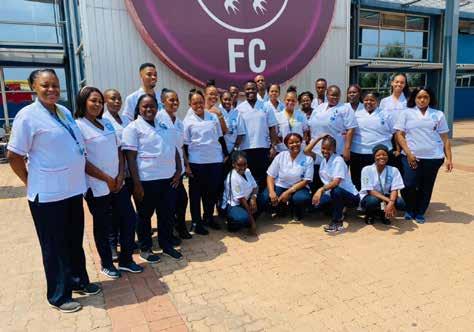

secured employment or become self-employed after completing their learnership, with 86% of those economically active now working in the health sector in Soweto. Additionally, 93% of youth have remained in the 12-month programme until the end and the Hubb has achieved a 100% pass rate for the NQF3 level Health Promotion Officer qualification.
On October 5, 2024, we celebrated the graduation of our recent cohort, who are now qualified Health Promotion Officers. The day was filled with heartfelt testimonies from youth who shared how the programme has provided them with a positive outlook on life and served as a support system for many of them.

In the past year, the Wits Health HUBB was able to form partnerships with 10 local organizations through health awareness campaigns. They have also partnered with Columbia University’s Herbert Irving Comprehensive Cancer Centre and the City of Johannesburg’s (CoJ’s) Department of Health to conduct a Tobacco Cessation training programme for 126 Health Promotion Officers
and Spiritual Care Workers from the department, along with 30 of our health advocates. This has guided the Department of Health’s promotion efforts, enabling both their health promotion workers and the Hubb’s health advocates to conduct smoking cessation counselling within communities that the Hubb serves.
In 2023, the Wits Health Hubb strengthened its partnership with Zlto, a digital social innovation platform that utilizes blockchain technology to track and encourage positive social behaviours while rewarding youth engagement. This data-free platform is accessible nationwide and allows users to earn Zlto points, redeemable for items like airtime, data, electricity, groceries, and clothing. With funding from the CoE-HD, the Health Hubb collaborated with the Zlto team to develop content for digital Nano courses focused on health topics affecting young people. Initially addressing depression, gender-based violence, and suicide in 2022, the Wits Health Hubb broadened the training offerings in 2023 to include diabetes and hypertension, along with their effects on pregnancy. To date, more than 76,000 youth from both rural and urban regions across South Africa, have completed these courses, which teach youth to identify specific symptoms of health issues and implement preventive strategies, while also providing information on available resources for support and assistance. The Hubb has received positive feedback from youth who completed the courses, highlighting the courses’ significant impact on raising health awareness among youth.
Here’s what some of the youth had to say:
Anonymous 1
“I did the Depression course, for me I learnt that Depression is a real thing in our community, and I believe it's not talked about enough. Most people tend to keep it to themselves and not speak to someone about it
which shouldn't be the case. But after completing the course I found that it's actually important to find someone you can trust and actually open to that person on how you feel. I like the fact the in the course they speak about the signs and symptoms so that way you are more aware of it so you can tell if you do have it or not and when you actually need to vent and let it out”
Anonymous 2
“Through these short courses, I was able to gain so much information around topics that’s not often spoken about in my community. Having the opportunity to learn about my mental health and be rewarded for completing a short course is such a rewarding feeling. I enjoyed doing these courses. Thank you!”
As a result of the Hubb’s embeddedness in the Soweto community and strengthened relationships through the Hubb’s Community Advisory Group (CAG), on the 13th of July 2024, the Hubb successfully hosted its health research partners to discuss ongoing research projects with members of the local community. Research partners provided updates on their projects and outlined ways for the community to get involved. The event was a success, attracting over

150 community members. It was inspiring to witness community member’s enthusiasm for getting involved and engaging with stakeholders about their health and local activities.
(YEIs) contribute to public health?
An analysis of the health needs of young South African adults embarking on a YEI. Over the past four years, the Hubb has conducted health assessments for its health advocates at three key points: baseline, halfway through the programme, and at 12 months as they complete the programme. The Hubb’s results so far show improved health and healthier behaviours among the youth.

With funding from CoE- HUMAN, the Hubb extended this research by conducting a follow-up study with youth from non-health-focused youth employment initiatives (YEIs). The aim was to determine whether the positive changes observed in the Hubb’s youth are specific to health-focused initiatives or reflect broader trends in youth employment programmes. Youth participated in a comprehensive online survey, which assessed quality of life, work-related quality of life, stress, depression, anxiety, food behaviours and food insecurity, and living conditions among other metrics.
While the comparative analysis is still underway, The Hubb has been able to present findings on the health status of youth as they join YEIs at the World Congress of Epidemiology (WCE2024) that was held from 24-27 September 2024 in Cape Town, South Africa.
The Hubb’s data shows high levels of anxiety, depression and perceived stress in the youth as they join YEIs, especially within the younger youth group (18-24 years). 31% of youth (18-24 years) exhibit symptoms of moderate to severe anxiety, compared to 22% in the older youth group (25-35 years), and 42% of younger youth showed signs of moderate to severe depression, almost double the rate of 26% seen in the older group. Youth across both age categories also presented with high levels of perceived stress (78%). Additionally, the Hubb observed that one third of all youth reported suicidal ideation within 2 weeks of participating in the study. The high prevalence of mental health challenges among this population is concerning and the Hubb recommends urgent need for mental support for youth through the duration of their time in YEIs. The Hubb did however ensure that youth participants that reported mental health concerns were referred for further evaluation.
A subsample of the youth underwent cardiometabolic measures, revealing that over half (53%) of youth were classified as overweight or obese. The prevalence of obesity and overweight was significantly higher in the older youth compared to the younger youth group, with rates of 41% versus 12%, respectively. Additionally, older youth also exhibited significantly higher systolic and diastolic blood pressure levels, with 26% classified as hypertensive. The levels of substance use, and food insecurity were mostly consistent across the youth age groups. 13% of the youth reported hazardous or harmful alcohol use, with 11% reporting as current smokers and
30% reporting at-risk or current food insecurity. To maximize impact for YEIs, the Hubb strongly recommends tailored health interventions specifically designed for youth across the different age groups.
This manuscript has recently been submitted to the International Journal of Social Welfare, advocating for an integrated service model that incorporates mental and physical health programmes for youth within employment and educational initiatives across South Africa. Through the proposed intervention strategies outlined in this paper, the Hubb seeks to influence health and labour market policy for youth across South Africa.
As the core support funding from the Development Bank of Southern Africa (DBSA) concludes in 2025, we are proactively focused on ensuring the sustainability of the Wits Health Hubb in Jabulani Soweto, particularly by raising funds for the continuation of the learnership programme. Since the Hubb’s inception in 2020, we have successfully raised over R7 million in addition to DBSA funding to support evidence generation, create jobs, and deliver essential training and health services in the Soweto community. Securing additional funding would not only enable the continued operation of the Health Hubb in Soweto but also facilitate its expansion to other youth development centres in underserved communities across South Africa. The Hubb is also currently exploring funding opportunities for a revenue-generating start-up aimed at delivering low-cost health services to the Jabulani and greater Soweto community. This initiative will be managed by former health advocates from the programme, offering them invaluable hands-on experience in business and entrepreneurial skills.
Tebogo Bodibe (2022-2023 cohort): “My journey with the Wits Health Hubb began as a way to keep myself occupied after moving back to South Africa with no clear direction. I saw a post about becoming a beacon of change in my community and was motivated to learn more about health, especially after losing my mother to health issues. WHH opened my mind to how our food choices can lead to health risks, equipping me with valuable skills and knowledge that empower both myself and others. The education I gained, along with my certificate, has opened doors for me and allowed me to showcase my talents and experiences. WHH made me reconsider my lifestyle choices, from my diet to my social circle and career aspirations. Today, I work as a TB Support Officer at Discoverers Community Health Centre, assisting nurses and social workers to ensure patients adhere to their treatment plans – an opportunity I owe to the training and experience I received from WHH”.

Lethukhuthula Ndwandwe (2020-2021 cohort): “I joined the Wits Health Hubb as a health advocate in 2020 and have since advanced to the role of Research Assistant Team Leader. This position has significantly improved my organizational and project co-ordination skills. I’ve gained valuable research experience, which I’m currently applying on an international project, co-creating health interventions with adolescent youth. Being part of the WHH has profoundly influenced my perspective on health; I now prioritize my diet and regularly go to the gym; thanks to the knowledge I’ve acquired. Ultimately, my involvement with the WHH has reaffirmed my ability to sustain myself, providing me with a sense of purpose and fulfilment”.
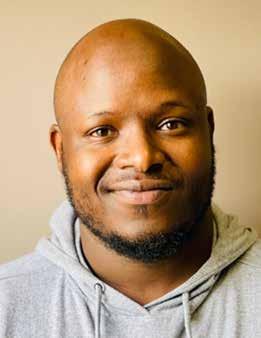


Lifelab is a unique research-based project created in collaboration with the NIHR Biomedical Research Centre and University Hospital Southampton. With children and young people at the heart of everything that LifeLab does, LifeLab’s Community of Practice (CoP) provides engaging experiences in and outside schools in a variety of creative formats. These experiences empower children and young people to understand the science behind the health messages they see and hear. They can apply that knowledge to the choices they make for their own lives namely their health now, in the future and for their future families.
Since LifeLab-Soweto was initiated in 2022, we have worked closely with our partners in LifeLab UK at the University of Southampton to co-create the Soweto programme with youth and to test the implementation of the programme for youth in South Africa (see publications). The collaborations and countries are growing to form The LifeLab Global Network with institutions that share the LifeLab mission to improve health and science literacy in youth with cocreated educational interventions. The network includes our team in South Africa (Soweto) and partners in Australia (Sydney) and in Ireland (Dublin). Excitingly this year, two new Low Middle-Income countries joined the Network – Ghana and Nepal!
The Global Network seeks to demonstrate the scalability and generalisability of the LifeLab model, and how it can be adapted for students in different contexts, helping to grow our reach and impact around the world. To bring together the Global Network, in January 2024, LifeLab UK hosted a 3-day inaugural LifeLab Global Community of Practice Workshop, an initiative designed to share best practice and to enable research, advocacy and education with children and young people in these different international settings. During the workshop, which was funded by the University of Southampton’s Sustainability and Resilience Institute, global partners discussed the different contexts of education and outreach needed in each location, local health needs, teacher training, common goals, and potential areas for funding.
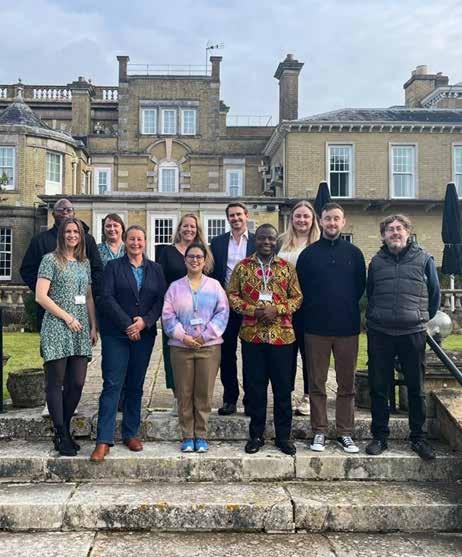
The meeting included Eva Breidenbach and George Johnson from Sydney Institute for Women, Children and their Families, Australia; Victor Mogre from the University for Development Studies, Ghana; Sweta Koirala from the Nepal Development Society, Nepal; Hannah Goss and Craig Smith from Dublin City University, Ireland; Lethu Ndwandwe and Lisa Ware from Soweto, South Africa; and Lisa Bagust, Donna Lovelock, Cheryl Metcalf, Mary Barker, Danielle Lambrick, Michael Head, Laila Khawaja, Chris Downey, Jon Lawn, James Eustace, Tony Hill, David Lubega, Emily Bastable, Amy Halls, Grace Compton, Shane Norris and Keith Godfrey from the University of Southampton, UK.
LifeLab UK Programme Director, Dr Kath WoodsTownsend, commented: “What a fantastically inspiring few days this meeting was sharing our experiences of working with young people and realising the common challenges and opportunities that we have. Meeting colleagues who have worked together over several years but never met face to face was brilliant and we all left with a commitment to working together to bring these opportunities to more young people, both in ex-
isting settings but also for our new partners in Ghana and Nepal.”
For Lethu Ndwandwe from LifeLab-Soweto, this was his first time leaving South Africa. He enjoyed the meeting immensely, connecting with other global partners and staying in an old Edwardian manor house.
The LifeLab Global Network are collectively pursuing research funding to continue empowering children and young people around the world through science, to make positive health choices.
OUTPUT generated from this study:
1. Ware LJ, Mabetha K, Hanson M, et al. Exploring health perceptions and priorities of South African youth: Understanding what matters for health literacy interventions. Journal of Health Literacy 2023.
2. Ware LJ KD, Mdladlamba T, Mabetha K, Hanson M, Godfrey KM, Woods-Townsend K, Norris SA. Feasibility testing of a health literacy intervention with adolescents in South Africa: The LifeLab Soweto Programme. Health Expectations (In Review) 2024.
Given the success of LifeLab-Soweto, a second phase of the programme is currently underway. Lifelab-Soweto II will be comprised of both young adults (to be managed by Prof Lisa Ware) and adolescents (to be managed by Prof Shane Norris). Phase 1 of Lifelab-Soweto was anchored around young adults. It was an insulation experience (it was installed in a space and young adults could come through and work through it. LifeLab-Soweto I served a purpose for the community work that happened in a kind of safe hub context.
LifeLab-Soweto II will involve schools (carried out in schools) and will be more curriculum-oriented but will still involve the development of the health literacy material. This will involve formative work that builds further evidence of the collaboration that adds to the Community of Practice. For this phase, the focus will be on schools and will involve three phases:
The first aspect will involve a needs assessment – qualitative data collection and discussions with educators at High Schools as well as high school learners in the Soweto area. Both learners and teachers will serve as key participants partly in order to discern how they envisage the curriculum around health and what aspects would enhance that curriculum both from a learner and educator perspective. This will provide the basis of their voices which will assist in the next step. LifeLab will reinforce the learning in the curriculum by also providing them with supplemental material which
will help with self-directed learning. After data collection, the data will be synthesised and put into a report.
Using the experience and material from LifeLab I, once it is discerned what is needed from the learners and educators based on the needs assessment, this will be followed by formulation (how to draw on LifeLab broadly at an international level (LifeLab beyond the Southampton site).
Once the material is obtained, this will be followed by the installation that is potentially implemented in schools and then go back to the stakeholders in the first step and review how that prototype works. This will then be followed by a finalisation of step two and then step three will be piloted. E.g. Six (6) schools can be selected in Soweto and the installation will be done in these schools and let various grades in the school come through to the installation and think about how that could happen. It will be in the school context and every learner will have the experience even though they will be exposed to different elements of health depending on their grade. The targeted grades are grades 9 to 11. This will however be reinforcing when they hear about these health talks in the next grade and will have supplementary material that they can work with. Overall, LifeLab II will involve a needs assessment, formulation, piloting and evaluation stage.

In March 2024, the Department of Biokinetics, Recreation, and Sports Science at the University of Venda, in partnership with the DSI NRF Centre of Excellence in Human Development and the African Centre of Obesity Prevention (ACTION) at the SAMRC/Wits DPHRU, hosted an insightful webinar chaired by Dr Gudani Mukoma in observance of World Obesity Day. The event aimed to shed light on the challenges and opportunities related to obesity, particularly in South Africa, and to promote actionable solutions for its prevention and management.
The webinar featured a diverse array of discussions and presentations structured to engage participants and promote understanding of obesity from multiple perspectives. Key program highlights included:
1. Guest Speaker Presentation: The Impact of Obesity in South Africa: Uncovering Primary Challenges and Opportunities in Rural Settings
This presentation addressed the unique obstacles faced by rural communities in combating obesity, providing
valuable insights into localised strategies for intervention.
2. Panel Discussion: Understanding Obesity: A Panel Discussion on Its Complex Contributors
Panellists explored the multifaceted nature of obesity, discussing genetic, environmental, and socio-economic factors that contribute to the rising rates of obesity in South Africa.
3. Personal Testimonies:
a. Living with Obesity: A community member shared their experience of navigating life with obesity, highlighting the emotional and physical challenges they face.
b. Overcoming Obesity: Another community member discussed their journey toward weight loss, offering a candid look at the struggles and triumphs involved.
4. Practical Solutions Session: Everyday Solutions for Preventing and Managing Obesity
Panel members provided actionable advice for participants, emphasising practical steps that individuals and families can take to promote healthier lifestyles.
The webinar attracted over 200 participants, including students, health professionals, community members, and government officials, demonstrating a strong interest in addressing the obesity crisis. The event was well-received, with many attendees reporting that they gained valuable knowledge and insights. Notably, the success of the webinar extended beyond the event itself:
Media Engagement: Before and after the webinar, Dr Mukoma received airtime on Univen FM to discuss obesity as a pressing public health issue, emphasising practical community solutions. This was followed by features in the Univens Nendila newsletter and Nendila Magazine, further amplifying the message.
Television Feature: The event garnered attention from TV BRICS, highlighting the global implications of obesity and the urgency for intervention.
Future Engagements: Following the webinar, the Department was invited to present as a guest speaker at the South African Medical Events health seminar, further establishing its role as a leader in public health discussions.
The World Obesity Webinar was a significant success, achieving its goals of education, community engagement, and awareness-raising. The Department of Biokinetics, Recreation and Sports Science at the University of Venda remains committed to addressing the obesity epidemic through ongoing dialogue and action.
On the 13th of July 2024, the Wits Health HUBB hosted a Research Dissemination Event at Jabulani
Safe Hub, Soweto with the goal of sharing some outcomes from several research studies conducted with the community in Soweto. This included research from the Wits Health HUBB (how youth employment initiatives impact youth health and wellbeing), LifeLab-Soweto (co-created health literacy intervention with young adults), YoPA (co-creating a wellness intervention with adolescents), the Salt Study (testing low-sodium salt substitutes for lowering blood pressure), Ntshembo (a


health and wellness intervention for adolescents), and HeLTI (a study of young women’s health to determine how this may impact the next generation). The team, consisting of key staff members and a few participants from the studies, gave an overview of what had been achieved in each project so far, reflecting a broad spectrum of community-centred health initiatives.
In addition to showcasing the different research studies, the event also featured entertainment as the adolescent stakeholder group from YoPA creatively expressed their experiences through dance and poetry, bringing a vibrant and interactive element to the day. These performances underscored the importance and impact of involving youth in health research and advocacy.
The event, which encouraged community attendance by providing hot soup, tea and bread to all attendees, also provided important health services through blood pressure and glucose testing to screen for hypertension and diabetes. The screening contributes to the Wits Health HUBB’s ongoing mission of promoting health and wellness in local communities. Through a combina-
tion of research presentations, artistic expression, and health services, this successful Research Dissemination Event fostered ongoing health education and community engagement at the Jabulani community research site in Soweto.
A STATA structural equation modelling (SEM) – a comprehensive statistical practice – training session was hosted by Dr Ashleigh Craig, a researcher at DPHRU, held at the CoE in Human Development for all Postdoctoral Research Fellows. This session was aimed at providing essential skills in a powerful statistical technique used to analyse complex relationships among variables by combining elements of factor analysis and multiple regression thus allowing both direct and indirect effects among observed and latent (unobserved) variables to be assessed.

Preconception health refers to the physical and psychological wellbeing of women and men throughout their reproductive life. It plays a crucial role in fostering healthy behaviours that translate into healthy lifestyles, increasing preparation for pregnancy as well as reducing risks that could have a direct negative effect on the mother and child to ensure that diverse health outcomes are optimised.
The health of men and women who are planning for pregnancy has been increasingly shown to strongly influence reproductive, perinatal and child outcomes. However, despite this evidence, a large proportion of individuals of reproductive age are in poor health prior to conception, with these individuals being largely exposed to ever-growing rates of non-communicable diseases.
Understanding SEM is crucial for researchers as it enables one to test and estimate causal relationships, account for measurement error, and model latent variables, which can lead to more robust and nuanced insights in research. By equipping fellows with the knowledge of SEM, Dr Craig aimed to enhance their analytical capabilities, fostering their ability to conduct sophisticated analyses that can address intricate research questions across various fields of interest. This session not only promoted collaborative learning but also empowered fellows to leverage SEM in their projects, ultimately contributing to the advancement of knowledge within their disciplines.
Universally recognised interventions of women’s and men’s preconception health in primary healthcare include provision of sexual and reproductive health, management of chronic diseases and infections, and promotion of positive lifestyle behaviours. Although primary healthcare services are largely recognised as the highest providers of sexual and reproductive healthcare, and there is some evidence of that focuses on the provision of preconception care in the healthcare setting, there is a gap in service delivery models that include broader strategies for promoting health and delivering preconception care to all adolescents, women and men of reproductive age in order to complete the continuum of care, yield a triple benefit, improve health now and for the future as well as minimising the transfer of intergenerational risks, particularly among vulnerable populations in resource-constrained settings. Thus, introducing a broader preconception care delivery models can bridge the gap in the continuum of care and address pre-pregnancy health risks and health problems that could have negative consequences.
Prof Shane Norris (CoE-HUMAN Director and Director at SAMRC Developmental Pathways for Health Research Unit) and Dr Khuthala Mabetha (CoE-HUMAN Centre & Research Manager) attended a World Health Organisation (WHO) preconception health consultation meeting from 8-9 May 2024 in Geneva, Switzerland. This consultation meeting brought together researchers, clinical and policy experts working in the broad fields of pre-


conception health, sexual and reproductive health, integrated care, human rights and maternal and childcare amongst others. The meeting participants engaged in discourses on reframing care and services, identifying entry points for health workers to take into consideration on where and how to start promoting and delivering preconception care as well as discussing frameworks for the recommendations and action steps that need to be undertaken in order to improve preconception health.
The meeting proceedings further provided the participants the opportunity to delve in deeper discussions around the changing landscape of preconception care, community views and understandings about services to improve birth, postnatal and child health outcomes and scientific updates on men’s and women’s preconception health. Of note, there was a roundtable discussion and plenary discussion which focused on what makes health, care and services before conception different from women’s and men’s general health and behaviour as well as when and how services should offer care before and between pregnancy.
To inform the development of a comprehensive preconception care program that is accessible and scalable for both women and men as well as to bridge the gap in the continuum of care to address and combat pre-pregnancy health risks, an understanding of the unique preconception needs of both men and women is required particularly to those who constitute of the vulnerable population in resource-constrained settings. Despite evidence of a gap in service delivery models that could deliver preconception health, service delivery models of preconception care which have played a
pivotal role are community-specific programmatic interventions. The Bukhali trial is an example of a well established Community Health Worker (CHW) service delivery model for community health and behaviour change. This programmatic intervention was designed as part of the Healthy Life Trajectories Initiative (HeLTI), a Randomised Control Trial that aims to assess the impact of interventions during the preconception, pregnancy and postnatal periods on maternal, infant and child health. These various interventions include healthy conversations (empowerment and behaviour change support), health promotion resource materials, micronutrient supplements, and services, including screening tests (BMI, blood pressure, haemoglobin, mental health, lifestyle), as well as home-based HIV and pregnancy testing.
In order to disseminate the findings and learnings of the crucial role that programmatic interventions play in promoting preconception health and care, the CoE-HUMAN in partnership with the SAMRC Wits Developmental Pathways for Health Research Unit set out to showcase Bukhali as an exemplar of a programmatic intervention that shows the efficacy of a complex continuum of care that aims to combat the complex health burdens that young men and women who live in resource-constrained settings face, discuss prevention and health initiatives that are vital for the benefit of young men and women as well as show how good health and wellbeing matter prior to conception. A short video showcasing the role of the Bukhali trial as a programmatic intervention that aims to promote behaviour change from preconception has been provided below: https://youtu.be/WQLfJqWs0Xc
In 2017, the organisation for Advancing and Evaluating the Societal Impact of Science (AESIS), which is an international, open community for various types of professionals working on stimulating and demonstrating the impact of research on challenges society faces, regarding culture, economy and environment among others, organised the very first international conference on Societal Impact of Social Science, Humanities and Arts (SSHA) in Cardiff, Wales. The conference brought together stakeholders such as research managers, administrators, evaluators, policy makers, funders, entrepreneurs, publishers, NGO’s, media and many more. This became the start of a series of annual conferences where attendees exchanged experiences and good practices in order to catalyse developments in strategies, policies, methods, tools and approaches that are being used to make sure that SSHA, in collaboration with societal stakeholders and other disciplines, can have the most positive and inclusive impact on wellbeing, culture, economy, environment, health, education, and all kinds of challenges that are being faced in the world.
Fast forward 7 years later, having journeyed through Copenhagen, Washington, Toronto, Brussels, Stockholm, and Cardiff, AESIS organised an impact week in Cape Town, South Africa from the 14-18 October 2024 and hosted a pre-conference event – the Societal Impact


of research workshop summit on the 14 and 15 October 2024. The one and a half-day event was composed of opening and closing plenary sessions and a total of four in-depth workshops. The practical workshops aimed to strengthen skills and increase knowledge on impact pathways, funding, evaluation, interdisciplinarity, and other important know-hows to achieve greater impact on society with excellent research. The opening plenary sessions focused on what societal impact of research is and its importance. Key speakers in this session included Anika Duut van Goor from AESIS, Dr Gugu Moche, Dr Genevieve Simpson and Dr Fulufhelo Nelwamondo from the National Research Foundation.
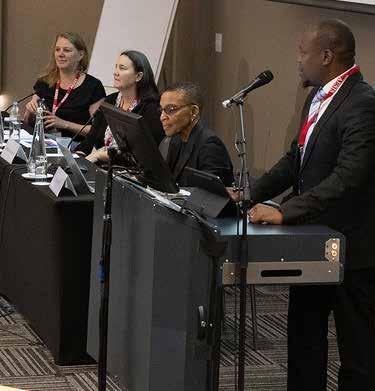

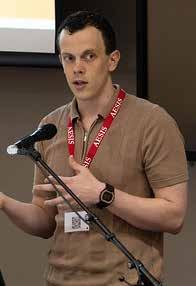

Pre-conference attendees were divided into groups of around 25 participants and rotated through the four workshops. Topics that were discussed in the four workshops included:
How to support researchers in achieving research impact and in planning for impact.
Impact Statements, funding proposals, and evaluations/ Ex-ante Assessment.
Increasing and Supporting Interdisciplinary Research and Science Engagement.
Demonstrating impact – ex-post assessment, case studies and communication.
The Three Centres of Excellence that were nominated for the Societal Impact Award in recognition of research with impact that has resulted in improvement in the quality of people’s lives at the NRF awards hosted in Sun City in August 2024, participated in the last plenary session which focused on Good Practises that advance impact literacy and encourage other researchers in their impact journey as they develop their capabilities to lead and guide the impact agenda in their institutions. During the session, the awardees showcased their research projects, outlined key elements to think about in developing a project that has a societal impact, introducing methodologies that worked for them and highlighting any challenges to consider.
The National Research Foundation held a Stakeholder Engagement side meeting on the 22nd of August 2024 at the Sun City Resort prior to the award ceremony. The Mandate of the National Research Foundation is to deliver research that is of good quality, make science system reputable and have societal impact and to produce a high level of skill of people that are competitive globally. The stakeholder engagement was held in order to address strategic questions, concerns and queries that were raised in the previous year’s (2023) stakeholder engagement in order to drive the sciences effectively. In the meeting, the main discussion was centred around what works as well as what needs to be improved in order to advance transformative research.
Key discussions included among others:
Focusing on integrative solutions that advance the science system at a strategic level including how to address these challenges at a systemic level.
Issue of transformation, excellence, sustainability and impact.
Role of universities and science system in achieving transformation of the ecosystem and driving science imperatives of the country.
Role of innovation in South Africa.
Priority research areas in university systems and how these targets can be achieved and whether there is capacity to achieve these and whether capacity is well distributed in the system.
How to deal with issue of transdisciplinary research.
What should be done to expand the rating system.
Rethinking human capital pipeline.
Leveraging on national facilities.
Infrastructure provisioning and access.
Strengthening the impact agenda.
One of the CoE-HUMAN’s leveraged projects hosted an advisory board meeting on the 13th of November 2024 to discuss key findings, highlights from the study’s progress from 2022-2024, as well as well as plans for the next steps. Overall, the main aim of the CoP model was to design, implement and evaluate interventions that aim to enhance child wellbeing, as well as contribute to scientific engagement, advocacy and community education on systems strengthening for child wellbeing. The advisory board meeting provided the CoP team the opportunity to discuss the tailored interventions that were developed in the project to improve child wellbeing outcomes as well as the development and testing of an assessment tool that helped track child wellbeing longitudinally and was effective in the assessment and intervention of vulnerable children in both rural and urban contexts. The team concluded the meeting by discussing the successes of the CoP collaboration as well as scaling up and institutionalising the CoP. In addition, agreements have been reached with interdepartmental representatives on the way forward with the CoP.
The CoE-HUMAN hosted a collaborator (Olatundun Gafari) from the University of Southampton for a series of research meetings and activities that were convened by CoE-HUMAN. The meetings were held from the 24th of June – 27th June 2024. Dr Ashleigh Craig (Researcher at the SAMRC Developmental Pathways for Health
Research Unit) and Dr Khuthala Mabetha (Centre & Research Manager at the DSI-NRF Centre of Excellence in Human Development) were among the collaborators who participated in these activities. Olatundun, Dr Ashleigh and Dr Khuthala built a research collaboration between the CoE-HUMAN and the University of Southampton by engaging in research-intensive sessions that included collaborative academic writing namely conceptualisation of research topics for manuscript writing and publication, writing two collaborative papers, brainstorming on the application of relevant data analyses plans to research papers, application of various statistical techniques as well as participating in stimulating academic discussions and presentations. The collaborators engaged with the Third Wave of the South African Human Development Pulse Survey during the conceptualisation of the research ideas, which is the first of its kind in South Africa to track Human Development Indicators over time that are useful and applicable at a national level. Engaging in this collaborative research meeting resulted in the development of two manuscripts which advance knowledge and understanding on human development. The manuscripts will be submitted soon for review.
The CoE-HUMAN hosted a Postdoc training event for the Postdoctoral fellows who are participating in the Accelerated Postdoctoral Programme on the 20th of November 2024. The training event was hosted by Prof Shane Norris (CoE Director and Director at SAMRC Developmental Pathways for Health Research Unit). The fellows engaged in intensive discussions around two trend summary documents – the Ipsos Global trends document and the Ipsos Global Advisor Survey which served as excellent resources that informed their programmatic visions. The fellows engaged in intellectually stimulating discussions around the two documents which encapsulated key findings from global trend research, highlighting some major emerging patterns in key topics such as consumer behaviour, societal attitudes and market dynamics across various regions, often focusing on themes like climate change, technology adoption, social issues and economic trends. The fellows shared their views and insights regarding patterns, shifts and changes in data over time and trend variations which helped guide their understanding of the drivers, direction of and magnitude of trends and how these provide valuable insights for decision-making and forecasting as well as shaping

future trends. In addition, in terms of the research landscape, insights and guidance were also shared with the Postdocs to help impact their research career and professional growth. This entailed providing guidance on how to engage in collaborations and networking opportunities, writing grant applications, engaging in effective research writing, independent project design which includes complex research design and execution, critical thinking, effective communication and contributing to the research community. Furthermore, two previous Postdoctoral fellows, Dr Ashleigh Craig (Researcher at SAMRC Developmental Pathways for Health Research Unit) and Dr Khuthala Mabetha (Centre and Research Manager at DSI-NRF Centre of Excellence in Human Development) shared their experiences of being in a Postdoctoral Fellowship and the great impact it has had on their current roles including what they have learnt and gained thus far in their research careers.
The School of Clinical Medicine in collaboration with the CoE-HUMAN hosted a Clinician Scientist Mentoring Programme for Clinicians. The main aim of the programme was to train Clinician Scientists who are faculty members of the University of the Witwatersrand to engage in research as a major component of their career in academic medicine as well as to provide them with guidance on how to shape their research programmes. The training was conducted in four sessions and these sessions were hosted by three trainers: Prof Shane Norris (CoE-HUMAN Director and Director at SAMRC Developmental Pathways for Health Research Unit), Prof
Lisa Micklesfield (Deputy Director at the SAMRC Developmental Pathways for Health Research Unit) and Prof Zane Lombard (Associate Professor in Human Genetics, University of the Witwatersrand) on the 23rd of July 2024; 20th August 2024; 17th September 2024 and 5th November 2024. In these sessions, the trainers used an engaging and practical approach to share key “recipes, shortcuts and hacks” to assist the attendees in becoming more effective Clinician Scientists. The trainers provided guidance to the Clinician Scientists by supporting them in developing research questions, designing studies and navigating the research landscape. Key topics of discussion in the sessions included among others defining one’s research topic (conceptualisation and formulation), developing a research roadmap, building a research team, establishing partnerships, collaborating widely and networking, research design and analysis, patient and stakeholder engagement, knowledge gap identification, stating the problem of the study and preparing grant applications. In addition, the trainers shared some of their experiences on how they have contributed to the generation of knowledge (new ideas, tools or techniques and their most important research outputs thus far). They also shared how they have contributed to the development of others and the wider research community as well as how their research contributes to the strategic aims of the organisation. The approaches used by the trainers helped prepare the Clinician Scientists to work at the intersection of clinical care and research. These approaches provided structured training, mentorship and opportunities to participate in research projects which provided the Clinician Scientists the opportunity to acquire research skills and develop expertise in scientific investigation through being exposed to dedicated research training.
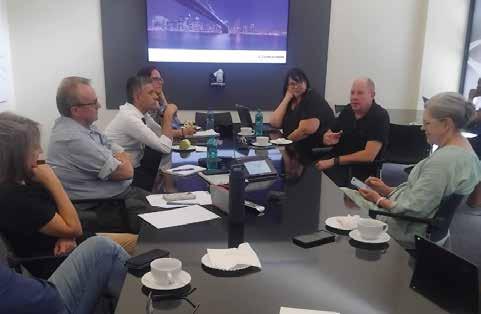

the study of interactions between societies, households and their natural environment
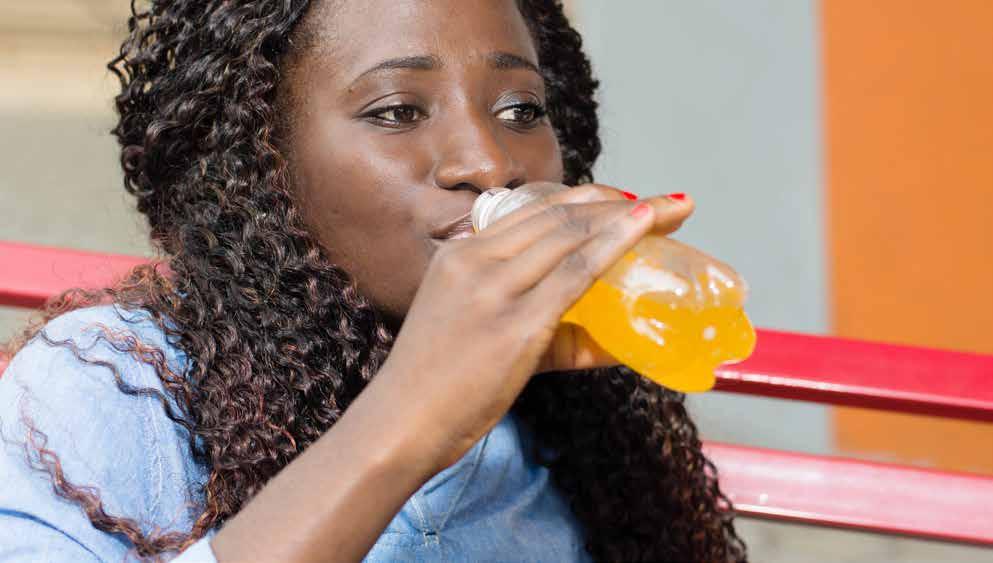
Prioreschi, A., Ware, L. J., Draper, C. E., Lye, S., & Norris, S. A. (2024). Contextualising individual, household and community level factors associated with sugar-sweetened beverage intake and screen time in Soweto, South Africa. Journal of Hunger & Environmental Nutrition, 19(5), 758–774. https://doi.org/10.1080/19320248.2022.2032901
Dr. Alessandra Prioreschi from the University of Witwatersrand sought to contextualize the environment in Soweto, South Africa, and identify connections with individual-level obesity risk variables. This was an observational, cross-sectional survey. Household surveys were carried out in randomly selected communities across the urban township of Soweto.
To obtain information about all churches in Soweto, an online search was conducted using the Google search engine. Participants who resided in one of the eight designated communities were approached at their homes and invited to participate. One participant from each eligible home was included if they were ≥18 years old and a regular member of the household (spent most nights in the home over the past three months).
Most participants in this sample reported consuming one to three sugar-sweetened beverages daily, indicating a high level of sweetened beverage intake. Less than 10% of total caloric consumption (ideally less than 5%), or roughly 6 teaspoons of sugar per day, is the maximum amount of free sugar that the WHO advises people to consume.
The current study discovered that while there were a number of household and community-level determinants associated with socioeconomic status and neighbourhood, there were no individual-level correlations
of SSB intake. This suggests that contextual variables were the primary driver of SSB consumption in this context, as well as perhaps other diet-related behaviours. Therefore, interventions 768 that try to alter these behaviours by concentrating only on risk factors at the individual level are probably going to fail. Instead, interventions could focus on particular regions, or researchers could try to figure out what about particular communities or environmental factors influence this behaviour.
As had been shown in earlier research on sedentary behaviour in countries with low or middle incomes, screen time increased with educational level attainment. The study did discover, however, that screen time was higher among female and younger individuals, which was not the case in earlier research.
According to this study, Soweto communities differed in terms of perceived neighbourhood safety, housing structure, levels of education, and access to toilets, but were comparable in terms of food insecurity prevalence, household density, and access to household assets.
The authors recommend that more research is needed to determine how to best incorporate these types of findings into intervention design and policy implementation.

Mabetha, K., Soepnel, L. M., SSewanyana, D., Draper, C. E., Lye, S., & Norris, S. A. (2024). A qualitative exploration of the reasons and influencing factors for pregnancy termination among young women in Soweto, South Africa: A Socio-ecological perspective. Reproductive Health, 21(1), 109. https://doi.org/10.1186/s12978-024-01852-8
Dr Khuthala Mabetha from the University of Witwatersrand used a deductive qualitative approach with a socioecological model framework to acquire a meaningful contextual understanding of why young women terminated their pregnancies.
This study was part of the Healthy Life Trajectories Initiative (HeLTI), particularly the Bukhali randomised control trial, which looks at how a complex intervention can improve the health of young women (18-28 years old) in Soweto, South Africa, before, during, and after pregnancy.
In this study, the reasons for terminating a pregnancy fall under the socioecological framework’s individual and interpersonal domains. Financial reliance and uncertainty, feeling unprepared to have another child, and a lack of support from family and partners were among the primary causes. Furthermore, we discovered factors across all domains of the framework that, rather than being direct causes for terminating the pregnancy, characterized the participants’ decision and their experience making the decision.
The findings indicated that there was a complicated interplay between the factors that prompted young women to terminate their pregnancies, rather than a single reason.
In conclusion, the decision of terminating a pregnancy was placed within a socioecological framework, emphasizing the intricate social and institutional environment in which the decision is made.
According to the authors, unsafe pregnancy termination remains a public health concern in South Africa, and knowing the reasons why women choose to terminate, as well as the multilayered, thoughtful nature of the decision, can improve understanding of women’s lived experiences.
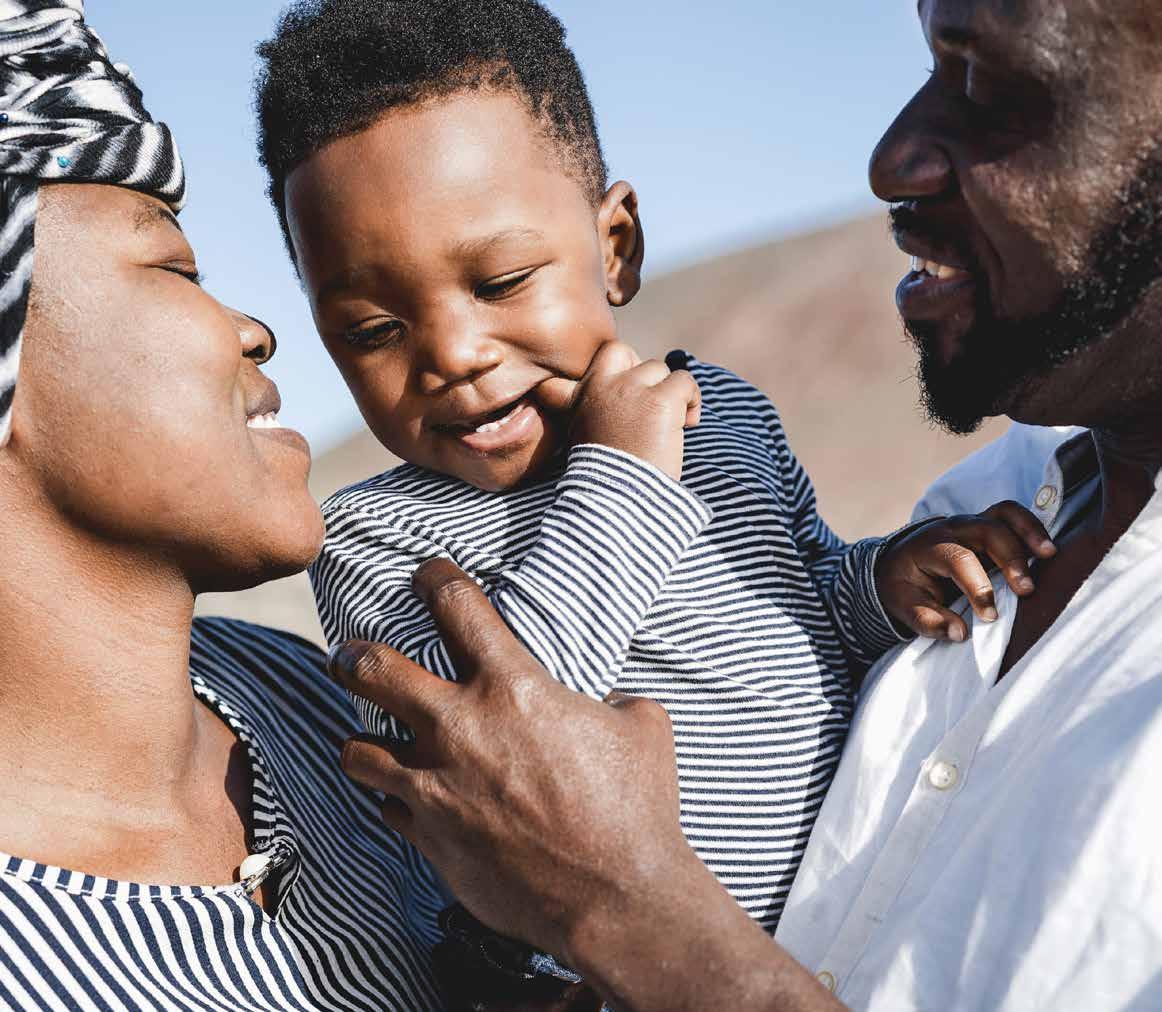

Desmond, C., Watt, K., Naicker, S., Behrman, J., & Richter, L. (2024). Girls’ schooling is important but insufficient to promote equality for boys and girls in childhood and across the life course. Development Policy Review, 42(1), e12738. https://doi.org/10.1111/dpr.12738
Dr. Chris Desmond from the University of Witwatersrand developed three sets of indicators that are likely to be connected with the extent to which human development potential is protected, realised, and utilised in low- and middle-income countries (LMICs). For the purpose of this analysis, the study only considered indicators from the life stage most closely related with each domain: early childhood, childhood, and adolescence, and late adolescence through to adulthood, respectively, even though the mapping of these three life stages to these domains is not exact.
In most regions, girls outnumbered boys in both school enrolment and completion. In a number of other early life and childhood indicators, girls perform better than boys. In adolescence and adulthood, girls and women fall behind boys and men. This is particularly evident in workforce engagement, unemployment, salary, the amount of unpaid care work, and political participation where women experience less favourable outcomes
than men. South Asia and sub-Saharan Africa are where the prejudice against women is most prevalent.
The authors argued that in order to address gender disparity, we must invest in increasing enrolment for both boys and girls and implement gender-transformative interventions both within and outside of the classroom.

McNulty, L. K., Stoutenberg, M., Kolkenbeck-Ruh, A., Harrison, A., Mmoledi, T., Katiyo, D., Mhlaba, M., Kubheka, D., & Ware, L. J. (2024). Examining the referral of patients with elevated blood pressure to health resources in an under-resourced community in South Africa. BMC Public Health, 24(1), 412. https://doi.org/10.1186/s12889-023-17359-z
Prof. Lia McNulty from Temple University examined the proportion of community members who used referrals provided by community health workers (CHW) during home visits, as well as the individual psychological and contextual factors that influenced their decision to use the referral.
Between May and June of 2022, CHWs conducted home visits to community members in Soweto, South Africa. As part of the home visits, CHWs measured blood pressure according to a standardized protocol for blood pressure measurement (BP), offered community members relevant, brief guidance based on the screening results, and referred them to the right health resources to help manage their blood pressure. The participants’ decision to use (or not use) the reference they received was discussed in follow-up interviews.
Key findings from this study was that referrals to the local physical activity (PA) program were used more fre-
quently than anticipated, and that there were a number of barriers that prevented participants from using their referrals as well as enabling factors that helped.
Authors suggest that more focus should be placed on addressing and overcoming often mentioned obstacles and community members’ reluctance to use health resources. Overall, by expanding health screenings and access to health resources through semi-customized referrals in under-resourced regions, CHWs have the ability to detect and manage the rising burden of uncontrolled hypertension and maybe other NCDs.

Moodley, M. C., & Lesch, E. (2024). Closeness in father-adolescent daughter relationships: A South African study. Journal of Family Studies, 30(1), 129–154. https://doi.org/10.1080/13229400.2023.2211554
Michaela Moodley from Stellenbosch University investigated how father-child closeness is constructed in a diverse context. Drawing from social constructionism, an exploratory-descriptive research design was employed to examine how closeness and father-daughter closeness were constructed in 15 family units (n = 45) made up of mothers, fathers, and adolescent daughters who lived in low-income, rural South African communities.
The results of this study show that daughters typically feel more at ease confiding in their mothers or friends than in their fathers, which is consistent with findings from other international studies on closeness in father-adolescent daughter relationships. Additionally, the present study demonstrated that the degree to which the daughter shared more personal and emotional matters with her father was correlated with perceptions of father-daughter closeness.
In summary, this study aims to fill the knowledge gap on father-daughter relationships in South Africa by investigating how closeness is defined and how father-daughter relationships from rural, “Coloured” Afrikaans-speaking communities in the Western Cape reflect these constructions, experiences, and practices of closeness.


Nell, E., & Lesch, E. (2024). Abdication of Responsibility for Father–Child Contact in a Group of Black South African Non-resident Father Families: A Systems Perspective. Journal of Family Issues, 0192513X241236556. https://doi.org/10.1177/0192513X241236556
Dr Erika Nell from Stellenbosch University explored whether and how non-resident fathers’ interactions with adolescent children were influenced by relationships with various family members. This article is based on a study that used a family systems approach and interviewed four members of 10 Black South African non-resident father families (N = 40) with intermittent father-child interaction.
The study looked for families that included the adolescent child (aged 14-18 years), the biological mother or guardian of the adolescent child, a non-resident biological father who had minimal contact with his child (once a month or less), and one extended family member who was deemed by both the mother and the father to have a major influence on decisions regarding father-child contact (e.g. an aunt, uncle, stepmother/ father, and maternal/paternal grandparent). Since adolescent children 14 years and older are better able to vocally express themselves in interviews than younger
children, we decided to concentrate on families with these children.
The lack of contact initiation was interpreted by mothers and children as a sign of fathers’ lack of concern or interest in their children. Mothers, relatives, and children’s negative perceptions of father-child contact were supported by this unfavourable view of fathers (Sano et al., 2008). However, the fathers in our study, similar to the men in other local and international studies (e.g. Fagan, 2021; Hunter, 2006), said they wanted more time with their children. Additionally, the hardship that adolescent children experience when their parents abdicate their obligation to negotiate and organise childcare was highlighted in our study.
Authors state that it makes sense to encourage adolescents to access and/or initiate family mediation or seek help from appropriate service providers on their own initiative, as children may be the ones most affected by infrequent father-child contact and should be given the authority to discuss it.
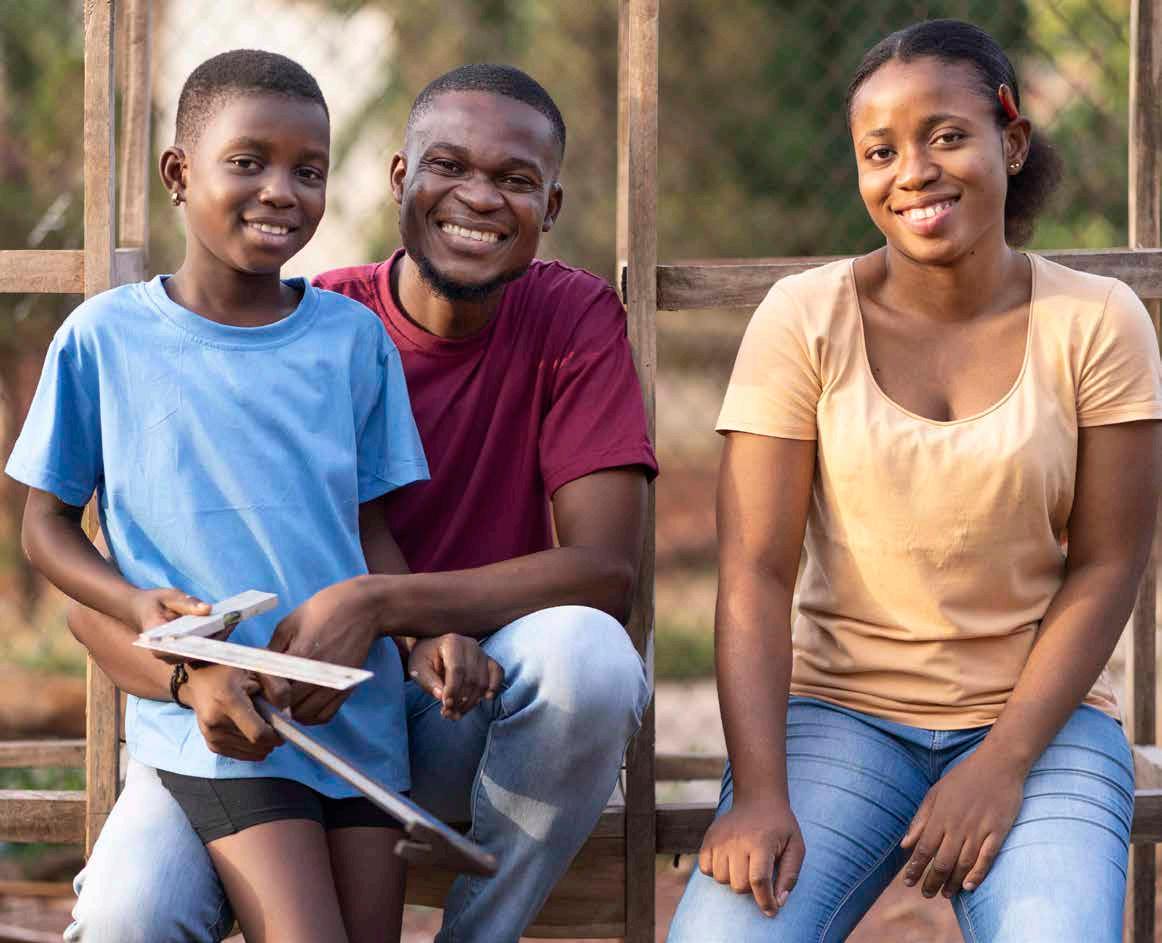
When combined, the CoE-HUMAN had a total of 61 Service Level Agreement (SLA) and Business Plan (BP) targets for 2024 (Appendix 2). To this end, the CoE-HUMAN:
Achieved 48 targets (or 79%)
11 targets are unmet (or 18%)
2 targets in process (or 3%)
The table below details targets not achieved, the reasons and the plan to address going forward to ensure the target is achieved.
1 ≥ 48 total number of bursaries awarded
24 No
Several applicants put forward were not approved. The quality of applications received was not aligned with the NRF and institution’s selection criteria and requirements for successful screening and nomination phase(s). We plan to address this through engagements with the relevant Designated Authorities of the key Universities in order to ensure that the selection criteria and nomination procedures are aligned. In addition, the CoE-HUMAN will run specific support sessions with nominated students in order to assist them to navigate the application system and the institutional system. This could then translate into a sightly bigger cohort number.
2 ≥ 60 peerreviewed publication that acknowledge funding from the CoE
40 No
3 Number of peer-reviewed publications that acknowledge funding from the CoE ≥ 60 (must be ISI rated) which is increased from 2020
40 No
We have successfully published 40 scientific papers, a significant achievement that reflects the dedication and hard work of our team. While we initially conceptualized over 60 papers, several factors influenced the pace of publication:
1. Prioritizing High-Impact Research – We focused on ensuring that each paper met the highest scientific standards, sometimes requiring additional analysis, refinement, and strategic journal selection to maximize impact.
2. Rigorous Peer Review Process – Many of our manuscripts are still under review.
3. Evolving Research Directions – As new data and insights emerged, some papers were refined or expanded to incorporate the latest evidence, ensuring that our findings remain relevant and meaningful.
4. Collaborative Engagement – Given the multidisciplinary nature of our research, we have worked closely with co-authors, partners, and stakeholders to enrich our manuscripts, which has sometimes extended timelines but ultimately strengthened our outputs.
5. Sustainable Research Growth – The progress we’ve made lays a strong foundation for continued publication. Many remaining papers are well advanced, and with focused effort, we are positioned to reach and exceed our original goals.
Publishing 40 papers is a remarkable milestone, demonstrating our team’s commitment to producing high-quality, impactful research. As we build on this momentum, we will continue refining our strategies to accelerate the completion of the remaining manuscripts while maintaining scientific excellence.
See row 2 response
4 ≥ 5 peerreviewed publications, acknowledging the CoE (impact factor >5
5 ≥ 5% SADC students and the rest of the world
6 ≥ 4% nonAfrican continent students (other than SADC)
7 CoE researchers serving on journal editorial boards = 8/9 3
8 CoE researchers serving on local science or policy committees = 8/9
9 CoE researchers serving on international science or policy committees = 8/9
10 Increase in leveraged funds
See row 2 response
The CoE-HUMAN did not receive any applications from SADC students. However, the CoE-HUMAN offered two Postdoctoral fellowships to two fellows who are from the SADC region.
The CoE-HUMAN did not receive any applications from non-African continent students. Plans will be made to leverage additional funding in order to offer more competitive funding opportunities.
There are fewer core researchers within the CoE-HUMAN. Currently, we have Prof Shane Norris and Prof Linda Richter (Prof Tamsen Rochat, Prof Lisa Ware and Prof Monde Makiwane are no longer affiliated with the CoEHUMAN).
See row 7 response.
See row 7 response.
No. Several project grants are however planned for 2025.
Encourage application for international and local seedfunding opportunities

Preamble:
This Service Level Agreement is linked to the Memorandum of Agreement between the NRF and the University of the Witwatersrand.
Activities related to the Current Stage:
• Research outputs
– Research outputs of students will be increased to 70+ journal article outputs in ISI- recognised journal and reporting of research outputs will indicate the roles of authors, students and collaborators.
• Networking
– The CoE is reaching out to Historically Disadvantaged Institutions to increase its grant and student support in these institutions.
– Stronger working relationships established with key stakeholders’ communications’ people (DSI, NRF, Wits Comms, Wits Alumni)
• Knowledge transfer
– The CoE shall make available to the NRF, on a quarterly basis (March, June, September and December), current “nuggets” of information for publication on the CoE website.
– While the current high level of knowledge transfer activities will be maintained, we intend to concentrate dissemination activities to 3-4 carefully selected topics per year.
• Service delivery
– CoE researchers maintain a high level of service delivery through membership of professional and disciplinary societies, editorial boards of journals, and policy committees in South Africa and abroad.
• Capacity development
– The CoE shall provide to the NRF a list of students that are being supported by the Centre by March-July of each year, using the student nomination platform on the NRF online submission system. Additional students can be appended to this list as and when they arrive.
– Student capacity development will be carried out through the outlined training workshops
– Attendance and feedback (rating) from each training workshop will be documented and presented
• Growing team spirit
– The CoE works to maintain its excellent relationships with stakeholders, CoE researchers, grantees and students.
– The CoE will work closer with the SAMRC Developmental Pathways for Health Research Unit
• Sustainability
– Exploring potential collaborators, partners and funders is ongoing, and the CoE will continue to apply for research and innovation grants to increase its leveraged funds and grow its research and innovation outputs. Leveraged funds will be a key indicator.
– A detailed short- and longer-term sustainability plan to the Steering Committee.
• The CoE shall present an audited set of financial statements at the March-April 2024 Steering Committee meeting reflecting the financial situation of the CoE during the previous financial year (January to December 2023).
• The CoE shall submit quarterly cash-flow statements within 15 days of the end of each quarter, indicating expenditure and commitments.
• The CoE shall submit an Annual Progress Report including Gate Review Documentation by Mid-March (unless new date stipulated) to be reviewed by the CoE Steering Committee.
• The CoE shall comply to the NRF rule to submit the NRF online APR and shall meet the deadline set by the NRF (which currently is the end of March, unless a new date is set and provided that it is communicated two months in advance)
• The CoE shall submit a Statement of Compliance by no later than March 2024.
• The CoE will put out a call for postgraduates and postdoctoral fellows in March 2024 and ensure successful candidates from this call respond to the annual NRF call as part of its obligations in terms of nominations.
1. Research
• Number of peer-reviewed publications that acknowledge funding from the CoE ≥ 60 (must be ISI rated) which is increased from 2022
• Number of peer-reviewed publications, acknowledging the CoE (impact factor >5) ≥ 5
• Policy inputs or policy evaluations ≥ 2
• CoE researchers maintain or improve their NRF rating ≥ 6/9
2. Education and Training
• Total number of bursaries awarded ≥ 48 in total
• 1% of bursaries will be awarded to disabled students
• Women ≥ 55% of all students
• ≥ 95 % of all students supported will be South African
• Black South African students ≥ 90% of all SA students supported (Black = African, Coloured, Asian and Indian)
• Only up to 5% of bursaries will be awarded to international students (SADC; other African; non-African continent students)
• Post-doctoral Fellows < 15% of all bursaries awarded
• Education and training workshops, conferences, symposia ≥ 5
3. Dissemination
• Dissemination pieces (“nuggets”) ≥ 4
• CoE Events (Exhibitions, symposia, conferences etc) increased to 10
• Media coverage (print, radio, television, social media) ≥ 35
4. Networking
• Collaborative agreements in total ≥ 20
• Growing and Supporting Excellence Campaign – visit to 2 Historically Disadvantaged Universities with intention to sign 2 new Collaborative Agreements
• Number of workshops, symposia, seminars convened or funded ≥ 5
5. Service
• CoE researchers serving on journal editorial boards = 8/9
• CoE researchers serving on local science or policy committees = 8/9
• CoE researchers serving on international science or policy committees = 8/9
• Stronger working relationships established with key stakeholders’ communications’ people (DSI, NRF, Wits Comms, Wits Alumni)
• Host student training events
• The CoE will continue to strive to have a sound working relationship between the CoE host institution and the satellite institutions.
• Allocate 1 Opportunity Grant to researchers at the Nelson Mandela University
• Continuing students’ to complete online progress reports.
34 Present audited financial statements at the March-April 2025 SC reflecting financial situation of the CoE-HUMAN during the previous financial year (January-December 2024)
35 COE-HUMAN to submit quarterly cash-flow statements within 15 days of the end of each quarter
36 CoE-HUMAN to submit 2024 APR, no later than February 2025
37 CoE-HUMAN to comply with NRF rule to submit the NRF online APR and shall meet the deadline set by the NRF
38 CoE-HUMAN shall submit a Statement of Compliance by no later than March 2025
39 CoE-HUMAN will put out a call for postgraduates and postdoctoral fellow in March 2025 and ensure successful candidates from this call respond to the annual NRF call as part of its obligations in terms of nominations
In total the CoE-HUMAN has 59 SLA and BP targets for 2024:
1. 40 NRF SLA Targets
2. 19 COE-HUMAN BP Targets
Of the 40 SLA Targets:
1. 29 have been achieved.
2. Eleven (11) will not be achieved:
≥ 48 total number of bursaries awarded
≥ 5% SADC students and the rest of the world
≥ 4% Non-African continent students (other than SADC)
≥ 60 peer-reviewed publication that acknowledge funding from the CoE
Number of peer-reviewed publications that acknowledge funding from the CoE ≥ 60 (must be ISI rated) which is increased from 2020
≥ 5 peer-reviewed publications, acknowledging the CoE (impact factor >5
CoE researchers serving on journal editorial boards = 8/9
CoE researchers serving on local science or policy committees = 8/9
CoE researchers serving on international science or policy committees = 8/9
Increase in Leveraged Funds
Of the 20 BP Targets:
13 have been achieved.
7 outstanding
Forty-one articles published in journals (4 with impact factors of >5)
1. Chidembo, R., Francis, J., & Kativhu, S. (2024). An intervention framework for the adoption of solar home system technology in rural Vhembe district, South Africa. Energy, Sustainability and Society, 14(1), 66. https://doi.org/10.1186/s13705-024-00493-w
2. Chidembo, R., Francis, J., & Kativhu, S. (2024). Underlying beliefs that influence solar home system adoption in Vhembe district Municipality, South Africa. Social Sciences & Humanities Open, 9, 100754. https://doi.org/10.1016/j.ssaho.2023.100754
3. Cohen, E., Slemming, W., Wrottesley, S. V., Prioreschi, A., & Norris, S. A. (2024). Maternal perceptions of infant’s body weight and childhood obesity in South Africa: A qualitative study in Soweto. Children & Society, 38(2), 277–293. https://doi.org/10.1111/chso.12689
4. Crouch, S. H., Ware, L. J., Norris, S. A., & Schutte, A. E. (2024). Comparing a range of potassium-enriched low sodium salt substitutes to common salt: Results of taste and visual tests in South African adults. Nutrition, Metabolism and Cardiovascular Diseases, 34(4), 903–910. https://doi.org/10.1016/j.numecd.2023.12.015
5. Daniels, N. M. (2024). Ultrasound scans as risk rituals in obstetric prenatal care in South Africa. Health, Risk & Society, 26(1–2), 1–18. https://doi.org/10.1080/1369857 5.2023.2289025
6. Desai, R., Magan, A., Maposa, I., Ruiter, R., Rochat, T., & Mercken, L. (2024). A study Comparing Text-Based WhatsApp and Face-to-Face Interviews to Understand Early School Dropout. Youth & Society, 56(1), 42–66. https://doi.org/10.1177/0044118X221138609
7. Desai, R., Magan, A., Ruiter, R. A. C., Reddy, P. S., & Mercken, L. A. G. (2024). Understanding Why Youth Drop Out of School in South Africa. SAGE Open, 14(1), 21582440231219080. https://doi.org/10.1177/21582440231219080
8. Desmond, C., Watt, K., Naicker, S., Behrman, J., & Richter, L. (2024). Girls’ schooling is important but insufficient to promote equality for boys and girls in childhood and across the life course. Development Policy Review, 42(1), e12738. https://doi.org/10.1111/ dpr.12738
9. Dlamini, S. N., Mtintsilana, A., Mapanga, W., Craig, A., & Norris, S. A. (2024). Associations between nutrition knowledge and obesity-related attitudes and physical activity among young adults from Kenya, South Africa, and the United Kingdom. South African Journal of Clinical Nutrition, 37(1), 9–22. https://doi.org/10.1080/ 16070658.2023.2198844
10. Dlamini, S. N., Mtintsilana, A., Craig, A., Mapanga, W., & Norris, S. A. (2024). Food insecurity and coping strategies associate with higher risk of anxiety and depression among South African households with children. Public Health Nutrition, 27(1), e116. https://doi.org/10.1017/S1368980024000879
11. Du Toit, H. D., Rishworth, G. M., Strydom, N. A., & Welman, S. (2024). High levels of metacercarial infestation (family: Diplostomidae) do not affect host energetics and swimming performance in the Epaulette goby ( Coryogalops sordidus , Gobiidae). Journal of Fish Biology, jfb.15657. https://doi.org/10.1111/jfb.15657
12. Eekhout, I., Weber, A. M., & Van Buuren, S. (2024). Harmonizing measurements: Establishing a common metric via shared items across instruments. Population Health Metrics, 22(1), 30. https://doi.org/10.1186/ s12963-024-00351-z
13. Fouksman, E., & Dawson, H. J. (2024). Redistributive politics and the temporalities of crisis: Reconfiguring social protection in a post-pandemic South Africa. Global Social Policy, 24(2), 242–260. https://doi.org/10.1177/14680181231201493
14. Gradidge, P. J.-L., Crouch, S. H., Thornton, J., Matsena Zingoni, Z., Torres, G., Stoutenberg, M., Kolkenbeck-Ruh, A., Woodiwiss, A. J., Mhlaba, M., & Ware, L. J. (2024). Physical activity vital sign assessment and associated health outcomes in an underserved South African community. Journal of Public Health. https://doi.org/10.1007/s10389-024-02292-1
15. Hartwig, F. P., Ataullahjan, A., Adair, L., Gonçalves, H., Horta, B., Lee, N., Martorell, R., Menezes, A. M. B., Dos Santos Motta, J. V., Norris, S., Ramirez-Zea, M., Richter, L., Bhutta, Z., Stein, A. D., Victora, C., & COHORTS consortium. (2024). Women’s health and well-being in five birth cohorts from low- and middle-income countries: Domains and their associations with early-life conditions. Journal of Global Health, 14, 04137. https://doi.org/10.7189/jogh.14.04137
16. Kadiyala, S., Richter, L., Kulkarni, B., Chitaya, A., & Harris-Fry, H. (2024). Global childhood malnutrition. BMJ, q1874. https://doi.org/10.1136/bmj.q1874
17. Kolozali, Ş., White, S. L., Norris, S., Fasli, M., & Van Heerden, A. (2024). Explainable Early Prediction of Gestational Diabetes Biomarkers by Combining Medical Background and Wearable Devices: A Pilot Study with a Cohort Group in South Africa. IEEE Journal of Biomedical and Health Informatics, 1–12. https://doi.org/10.1109/JBHI.2024.3361505
18. Loss, G., Naicker, S., Richter, L., & Fink, G. (2024). Early life determinants of social disparities among young adults: A longitudinal study in vulnerable communities in South Africa. World Development, 175, 106465. https://doi.org/10.1016/j.worlddev.2023.106465
19. Luan, Y., Hodgkin, D., Behrman, J., Stein, A., Richter, L., Cuartas, J., & Lu, C. (2024). Global Development Assistance for Early Childhood Care and Education in 134 Low- and Middle-Income Countries, 2007-2021. SSRN Electronic Journal. https://doi.org/10.2139/ ssrn.4790230
20. Mabetha, K., Soepnel, L. M., SSewanyana, D., Draper, C. E., Lye, S., & Norris, S. A. (2024). A qualitative exploration of the reasons and influencing factors for pregnancy termination among young women in Soweto, South Africa: A Socio-ecological perspective. Reproductive Health, 21(1), 109. https://doi.org/10.1186/s12978-02401852-8
21. Mabetha, K., Soepnel, L. M., Mabena, G., Motlhatlhedi, M., Nyati, L., Norris, S. A., & Draper, C. E. (2024). Mobile Technology Use in Clinical Research Examining Challenges and Implications for Health Promotion in South Africa: Mixed Methods Study. JMIR Formative Research, 8, e48144. https://doi.org/10.2196/48144
22. Mabetha, K., Soepnel, L. M., Klingberg, S., Mabena, G., Motlhatlhedi, M., Norris, S. A., & Draper, C. E. (2024). Young women’s social support networks during pregnancy in Soweto, South Africa. African Journal of Primary Health Care & Family Medicine, 16(1). https://doi.org/10.4102/phcfm.v16i1.4146
23. Malope, S. D., Norris, S. A., & Joffe, M. (2024). Culture, community, and cancer: Understandings of breast cancer from a non-lived experience among women living in Soweto. BMC Women’s Health, 24(1), 594. https://doi.org/10.1186/s12905-024-03431-2
24. McNulty, L. K., Stoutenberg, M., Kolkenbeck-Ruh, A., Harrison, A., Mmoledi, T., Katiyo, D., Mhlaba, M., Kubheka, D., & Ware, L. J. (2024). Examining the referral of patients with elevated blood pressure to health resources in an under-resourced community in South Africa. BMC Public Health, 24(1), 412. https://doi.org/10.1186/s12889-023-17359-z
25. Moodley, M. C., & Lesch, E. (2024). Closeness in father-adolescent daughter relationships: A South African study. Journal of Family Studies, 30(1), 129–154. https://doi.org/10.1080/13229400.2023.2211554
26. Mudzingiri, C., Mudiriza, G., Jana, G., & Sunge, R. (2024). The effect of local climatic conditions on household consumption: A case study of South Africa. Humanities and Social Sciences Communications, 11(1), 652. https://doi.org/10.1057/s41599-024-03167-2
27. Nell, E., & Lesch, E. (2024). Abdication of Responsibility for Father–Child Contact in a Group of Black South African Non-resident Father Families: A Systems Perspective. Journal of Family Issues, 0192513X241236556. https://doi.org/10.1177/0192513X241236556
28. Norris, S. A., Nyati, L. H., Murphy-Alford, A., Lucas, N., Santos, I. S., Costa, C. S., Kuriyan, R., Wickranasinghe, V. P., Ariff, S., Jayasinghe, S., Kurpad, A. V., Ismail, L. C., Hills, A. P., Multi-center Infant Body Composition Reference Study (MIBCRS), Norris, S., Murphy-Alford, A. J., Ismail, L. C., Ahmad, T., Ahuja, K. D. K., … Yameen, A. (2024). Infant growth and body composition from birth to 24 months: Are infants developing the same? European Journal of Clinical Nutrition. https://doi.org/10.1038/s41430-023-01386-5
29. Norris, S. A., Zarowsky, C., Murphy, K., Ware, L. J., Lombard, C., Matjila, M., Chivese, T., Muhwava, L. S., Mutabazi, J. C., Harbron, J., Fairall, L. R., Lambert, E., & Levitt, N. (2024). Integrated health system intervention aimed at reducing type 2 diabetes risk in women after gestational diabetes in South Africa (IINDIAGO): A randomised controlled trial protocol. BMJ Open, 14(1), e073316. https://doi.org/10.1136/ bmjopen-2023-073316
30. Loss, G., Naicker, S., Richter, L., & Fink, G. (2024). Early life determinants of social disparities among young adults: A longitudinal study in vulnerable communities in South Africa. World Development, 175, 106465. https://doi.org/10.1016/j.worlddev.2023.106465
31. Prioreschi, A., Ware, L. J., Draper, C. E., Lye, S., & Norris, S. A. (2024). Contextualising individual, household and community level factors associated with sugar-sweetened beverage intake and screen time in Soweto, South Africa. Journal of Hunger & Environmental Nutrition, 19(5), 758–774. https://doi.org/10.1080/1932024 8.2022.2032901
32. Scott, M., Watermeyer, J., & Wessels, T. (2024). A balancing act: Non directive communication, risk perceptions, and meeting patient needs in genetic counseling: A South African case study. Journal of Genetic Counseling, 33(2), 462–472. https://doi.org/10.1002/jgc4.1741
33. Scott, M., Watermeyer, J., & Wessels, T.-M. (2024). “We are just not sure what that means or if it’s relevant”: Uncertainty when gathering family history information in South African prenatal genetic counseling consultations. Social Science & Medicine, 342, 116555. https://doi.org/10.1016/j.socscimed.2023.116555
34. Soepnel, L. M., Norris, S. A., Mabetha, K., Motlhatlhedi, M., Nkosi, N., Lye, S., & Draper, C. E. (2024). A qualitative analysis of community health worker perspectives on the implementation of the preconception and pregnancy phases of the Bukhali randomised controlled trial. PLOS Global Public Health, 4(3), e0002578. https://doi.org/10.1371/journal.pgph.0002578
35. Soepnel, L. M., Mabetha, K., Norris, S. A., Motlhatlhedi, M., Nkosi, N., Klingberg, S., Lye, S., & Draper, C. E. (2024). The role of a community health worker-delivered preconception and pregnancy intervention in achieving a more positive pregnancy experience: The Bukhali trial in Soweto, South Africa. BMC Women’s Health, 24(1), 161. https://doi.org/10.1186/s12905-02402982-8
36. Stoutenberg, M., Crouch, S. H., McNulty, L. K., Kolkenbeck-Ruh, A., Torres, G., Gradidge, P. J. L., Ly, A., & Ware, L. J. (2024). Acceptability and feasibility of homebased hypertension and physical activity screening by community health workers in an under-resourced community in South Africa. Journal of Public Health, 32(6), 1011–1022. https://doi.org/10.1007/s10389-02301873-w
37. Vermeulen, B., Ware, L. J., Perman, G., Maposa, I., & Labarthe, D. R. (2024). Harmonizing Cardiovascular Health Data from National Surveys: Challenges and Opportunities. CJC Open, 6(12), 1501–1502. https://doi.org/10.1016/j.cjco.2024.08.009
38. Ware, L., Vermeulen, B., Maposa, I., Flood, D., Brant, L. C. C., Khandelwal, S., Singh, K., Soares, S., Jessen, N., Perman, G., Riaz, B. K., Sachdev, H. S., Allen, N. B., & Labarthe, D. R. (2024). Comparison of Cardiovascular Health Profiles Across Population Surveys From 5 Highto Low-Income Countries. CJC Open, 6(3), 582–596. https://doi.org/10.1016/j.cjco.2023.11.021
39. Ware, L., Mabetha, K., Hanson, M., Godfrey, K., TownsendWoods, K., & Norris, S. (2023). Exploring health perceptions and priorities of South African youth: Understanding what matters for health literacy interventions. Journal of Health Literacy, Online First. https://doi.org/10.22038/jhl.2023.71473.1405
40. Ware, L. J., Kubheka, D., Mdladlamba, T., Mabetha, K., Hanson, M., Godfrey, K. M., Woods Townsend, K., & Norris, S. (2024). Feasibility Testing of a Health Literacy Intervention With Adolescents and Young Adults in South Africa: The LifeLab Soweto Programme. Health Expectations, 27(6), e70121. https://doi.org/10.1111/ hex.70121
1. M.G. Mahlomaholo, S., & R. Mahlomaholo, M. (2024). Employability as Inclusive Entanglement in Relationalities: A Design in Sustainable Learning Environments. In F. Altinay & Z. Altinay (Eds.), Education and Human Development (Vol. 13). IntechOpen. https://doi.org/10.5772/intechopen.114033

Food insecurity and coping strategies associate with higher risk of anxiety and depression among South African households with children
The recent COVID-19 pandemic and economic challenges have worsened food insecurity, particularly in resource-poor settings like South Africa. Food insecurity does not only increase the likelihood of obesity and related diseases, but also negatively impacts mental health, with children facing detrimental effects on their overall development. Our nationally representative survey that was conducted in October 2021 revealed that over 20% of South African households experienced food insecurity during the transition out of the COVID-19 pandemic. Findings from that study had also highlighted the relationship between food insecurity and the risk of anxiety and depression, particularly when coping strategies involved extreme measures like begging for food. However, whether the high rates of food insecurity were caused by the lockdown restrictions was not investigated. Likewise, that previous study was not focused on households with children who are known to be more affected by inadequate food access. Therefore, to get more insight into the scope of food
insecurity among South African households with children, we conducted a similar survey after the lockdown restrictions had ended.
We used a nationally representative study design to include all 9 South African provinces. A total of 1 774 adults living with children were surveyed and the data were weighted to represent almost 21 million households. Face-to-face interviews were done using questionnaires that included both household-related aspects and individual-related factors. Adapted from validated questionnaires, the study assessed food insecurity, coping strategies, and anxiety/ depression levels. We used Community Childhood Hunger Identification Project (CCHIP) for food insecurity, Coping Strategies Index (with 11 items) to understand how households cope during food shortages, and Generalised Anxiety Disorder (GAD-7) and Patient Health Questionnaire-9 (PHQ-9) for anxiety and depression screening, respectively.

We found that food insecurity among South African households with children was more than 1 in 5 (about 23.7%). We also confirmed that living in a food-insecure household was associated with a higher risk of anxiety and depression, even after the lockdown restrictions had ended. Our study further reported that 67.0% of the households used at least one coping strategy, and more than half (50.6%) used at least three of the included strategies. The study demonstrated that all coping strategies used by South Africans to deal with food insecurity had varying associations with risk of anxiety and depression. Among the tested strategies, relying on less preferred and less
Reference:
expensive foods was the most common, used by 85.5% of food-insecure households. Like our previous findings, sending a household member to beg for food was the strongest factor associated with anxiety and depression.
The findings from the study underscore the high prevalence of food insecurity among households with children following the COVID-19 pandemic. This emphasizes the need for collaborative efforts between the government, private sector, and civil society to address and eradicate food insecurity, particularly in poorer households with children, who are identified as the most vulnerable population.
Food insecurity and coping strategies associate with higher risk of anxiety and depression among South African households with children. Siphiwe N Dlamini1,* Asanda Mtintsilana1, Ashleigh Craig2, Witness Mapanga2,3 and Shane A Norris2,4 Affiliations
¹ School of Physiology, Faculty of Health Sciences, University of the Witwatersrand, Johannesburg, South Africa
² SAMRC/Wits Developmental Pathways for Health Research Unit, Faculty of Health Sciences, University of the Witwatersrand, Johannesburg, South Africa
³ Strengthening Oncology Services Research Unit, Faculty of Health Sciences, University of the Witwatersrand, Johannesburg, South Africa
⁴ School of Human Development and Health, University of Southampton, Southampton, UK
Corresponding author: siphiwe.dlamini2@wits.ac.za
Funding support: This study was supported by the DSI-NRF Centre of Excellence (CoE) in Human Development at the University of the Witwatersrand, Johannesburg, South Africa. The content is solely the responsibility of the authors and does not reflect the views of the DSI-NRF CoE in Human Development.


1st Floor, School of Public Health, University of the Witwatersrand York Road, Parktown, Johannesburg 2193, South Africa
Director: Prof Shane Norris www.facebook.com/CoEHuman twitter.com/CoEHuman www.wits.ac.za/coe-human



Research shows how financial security at both the home and community levels can be beneficial for children and the country in different ways
Despite substantial improvements in poverty reduction, economic growth and social protection, inequalities in South Africa persist, with progress particularly stifled amongst the poorest communities.
Research has shown the importance of both the family or home environment and the community or neighbourhood environment for positive outcomes – health, wellbeing, education, and more. Just as there are variations in child outcomes within and between households, we see variations in outcomes within and between communities. For example, schools within resource-constrained communities may underperform, resulting in poorer educational outcomes at the community level, compared to a neighbouring, better-functioning school system. But within a community, children from individual households will have varying levels of educational attainment.
South Africa’s National Development Plan (NDP) 2030 aims to eliminate poverty and reduce inequality by 2030. Three important strategies, among many others, to achieve the NDP 2030 goals are reducing unemployment through the provision of quality education, social protection that improves living conditions, and improved
community safety. Ultimately, our national progress requires strengthening of the family, the community, and the state.
In this study, we explored the ways in which a child’s home and community environment influenced their adult outcomes. We used data from the Birth to Thirty (Bt30) cohort, which enrolled children in 1990 from the Soweto-Johannesburg metropolitan area and followed them up to age 28 in 2018. We focused on the socio-economic status of the household and the neighbourhoods within the Soweto area. We examined two outcomes – educational attainment and engagement in criminal activities – two salient social challenges in South Africa.
● We found that both the immediate home environment and the community environment play an important role in a child’s life, more strongly for educational attainment than criminality. In other words, the socioeconomic status of the family and that of the neighbourhood have a greater impact on a child’s future education than their engagement in criminal activities.




● There were weaker relationships between both home and community socioeconomic status and criminality in adulthood. This suggests that early socioeconomic status, although a key driver of criminal behaviour, may be less important than other factors, especially those experienced during adolescence.
To reduce criminal behaviour among young people, interventions beyond improving the socioeconomic status of the home and community are necessary, particularly as children enter adolescence and their exposure to other environments and risk factors increase.
● Higher levels of both home and neighbourhood socioeconomic status were related to higher levels of educational attainment. This was more pronounced for girls in higher socioeconomic status neighbourhoods, suggesting that in resource-constrained homes, girls are more likely to be disadvantaged in their schooling.
For the most disadvantaged families and communities, social mobility through improved education unlocking employment opportunities remains a challenge, and children and families can be trapped in intergenerational cycles of poverty.
● The influence of the socioeconomic status of the neighbourhood was largely independent of the socioeconomic status of the home. So, even if a family is well-off or struggling financially, the broader
Reference:
neighbourhood’s socioeconomic status can still have its own separate influence on outcomes.
● Overall, the early life home environment was more strongly related to children’s future outcomes than their neighbourhood. This relationship may vary depending on the types of outcomes assessed, like what we see with educational attainment and criminality. It may also vary if we assess a different exposure, for example, how early life parenting practices may influence education, or if the exposure is measured at a different time, for example, parenting practices during adolescence. For these reasons, longitudinal studies that cover a range of domains, like the Bt30 cohort, are valuable sources of data and insight into the life course.

Overall, our findings suggest that we can better understand social mobility when we explore local environments to supplement national data on socioeconomic status, education and other important statistics. Early childhood home environment significantly influences children’s development, and factors such as socioeconomic security play a crucial role in educational attainment.Additionally, safe neighbourhoods and strong communities can provide protective effects for children in vulnerable households. Simultaneously investing in both the home and the community can yield benefits across various areas and amplify the positive effects.
Early life determinants of social disparities among young adults: A longitudinal study in vulnerable communities in South Africa. World Development,175, 106465. Georg Loss1,2,*, Sara Naicker3 , Linda Richter3, Günther Fink1,2
Affiliations
¹ Department of Epidemiology and Public Health, Swiss Tropical and Public Health Institute, Basel, Switzerland
² University of Basel, Basel, Switzerland
³ DSI-NRF Centre of Excellence in Human Development, University of the Witwatersrand, Johannesburg, South Africa
Corresponding author: sara.naicker@wits.ac.za
Funding support: This work was supported by South African Medical Research Council, University of the Witwatersrand, and the DSI-NRF Centre of Excellence in Human Development. The adult outcome data collection at 28 was funded by the Bill & Melinda Gates Foundation, Seattle, WA (OPP1164115). The funder played no role in the preparation of the manuscript, analysis of the data, interpretation and discussion of the results, or the decision to submit the manuscript for publication.


www.wits.ac.za/coe-human
Director: Prof Shane Norris
www.facebook.com/CoEHuman
twitter.com/CoEHuman


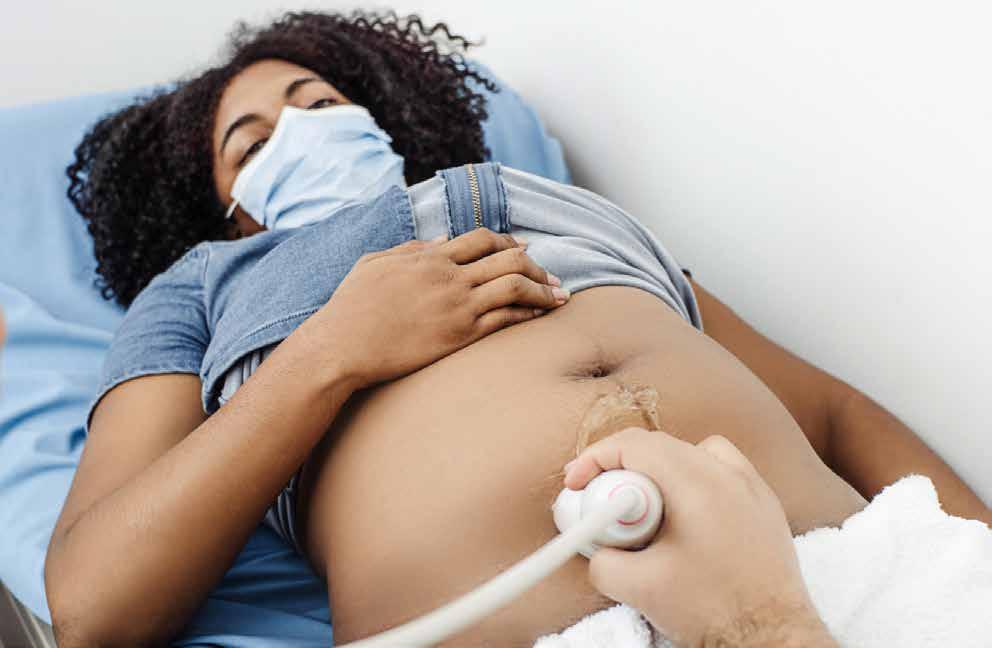
A study of the dual role that ultrasounds play as both a tool of reassurance and inadvertently, a source of risk for both obstetricians and pregnant women.
Exorbitant costs, high rates of unnecessary medical intervention and increasing medico legal claims plague South Africa’s private healthcare system. Maternity care is deeply intertwined in this scenario. The latest medical schemes data indicates that members have a 77% chance of c-section, with large co-payments expected. As the medical specialist with the greatest exposure to litigation, private obstetricians face crippling indemnity insurance costs. Are these two phenomena related? How do childbirth uncertainties and litigious uncertainties interact to produce a high-risk birthing culture?
This paper focused on the role of ultrasound scans in medical and maternal decision-making. It explores the dual role that ultrasounds play as both a tool of reassurance and inadvertently, a source of risk for both obstetricians and pregnant women, despite its primary use being the monitoring and screening of foetal development.
The study situated its analysis within a broader context of increasing medico-legal risks and high caesarean section (c-section) rates in South Africa. The ultrasound, while culturally sanctioned as safe, imposes medico-legal risks on obstetricians and increases women’s chances of c-section delivery within high-risk birthing cultures. Showing how
ultrasound scans have become ritualistic in obstetric antenatal care, this paper argues that the unborn, which is imaged by the ultrasound, is the primary subject of contestation in both litigation and birthing decisions and is itself generative of risk.
The study utilized a multi-site ethnography over two and a half years in Cape Town, detailing the experiences of fourteen pregnant women and seven obstetricians. Data was collected through mixed qualitative methods including participant observation, interviews, field notes, analysis of legal documents and social media posts. The study examined the normal course of antenatal consultations and accompanying ultrasound scans, to provide a detailed examination of the interactions between obstetricians and pregnant women.
1. Ultrasound Scans as Risk Rituals:
The study found that ultrasound scans were undertaken at every antenatal consultation. As a habitual practice, it has been unreflexively absorbed into daily practice precisely because it is non-invasive, pleasurable for parents and
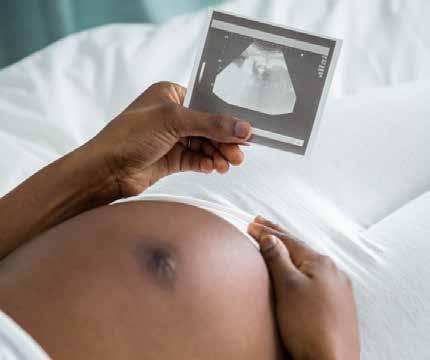
reinforces obstetric control over childbirth. These scans serve as a "risk ritual," that performs a dual function: (1) offering self-protective precaution for obstetricians (against litigation) and (2) reassurance of foetal normality for pregnant women. However, the ritualisation of ultrasounds heightens the perceived risks to the foetus, leading to the normalisation interventionist practices, that in-turn suspends women’s ability to question and refuse interventionist approaches. As such, the ultrasound risk ritual both aligns obstetric and maternal interests in protection of the foetus, but also pits them against each other when their interests conflict.
2. Impact on Obstetricians:
Obstetricians face significant medico-legal risks, as the foetus is the focal point of most legal claims in South Africa. The study illustrates how the ultrasound ritual aligns obstetricians’ need to avoid litigation with the pregnant women’s desire for a healthy pregnancy, though this alignment often leads to excessive medical interventions. It further contends that ultrasound risk rituals are not used with malicious intent; rather, as a well-integrated risk management strategy its easy absorption into everyday obstetric practices, lowers medical insurance premiums.
3.
The ritualized use of ultrasounds influences women’s perceptions of risk during pregnancy, often leading to an increased likelihood and acceptance of c-section deliveries. The study suggests that risk rituals reinforce a high-risk birthing culture, making interventionist birthing practices appear necessary and normal. This is important for women


www.wits.ac.za/coe-human
and their families to understand. Birthing outcomes are not predicated on the birth alone but emerge from a continuous sequence of care-giving practices that begins with the very first scan when pregnancy is confirmed.
The research concludes that the ritualization of ultrasound scans in South African obstetric care reinforces a risk-centric approach to pregnancy and childbirth. This culture of risk management, driven by legal and technological forces, not only aligns but also pits maternal and obstetric interests against each other. The study calls for a critical examination of routine obstetric practices and their influence on birthing outcomes, particularly in contexts with high medico-legal pressures.
Medically safe for mother and foetus, the ultrasound scan is a necessary part of good antenatal care. But routine ultrasound use is not recommended – yet it is a socially approved – even expected part of private sector obstetric care.
It matters little whether or not routine ultrasound scans actually work to avert risks from materialising. The benefit is gained through their comfortable absorption into daily practice and the reassurance it evokes when seeing is believing. Ultrasound use conveniently displaces the threat of risk, by providing evidence of checking that everything is alright, though in never completely removing that risk, its repetitive, routine use becomes necessary.
Women themselves collaborate in the requirement of highly interventionist birthing cultures, when they participate in risk rituals that configure their bodies, their babies and their birth as risky.
Reference:
Ultrasound scans as risk rituals in obstetric prenatal care in South Africa
Nicole Miriam Daniels1,2
Affiliations
¹ DSI-NRF Centre of Excellence in Human Development, University of the Witwatersrand, Johannesburg, South Africa
² Department of Sociology, University of Cape Town, Cape Town, South Africa
Corresponding author: nicole.daniels@uct.ac.za
Funding information: The author(s) reported there is no funding associated with the work featured in this article.
Director: Prof Shane Norris www.facebook.com/CoEHuman twitter.com/CoEHuman


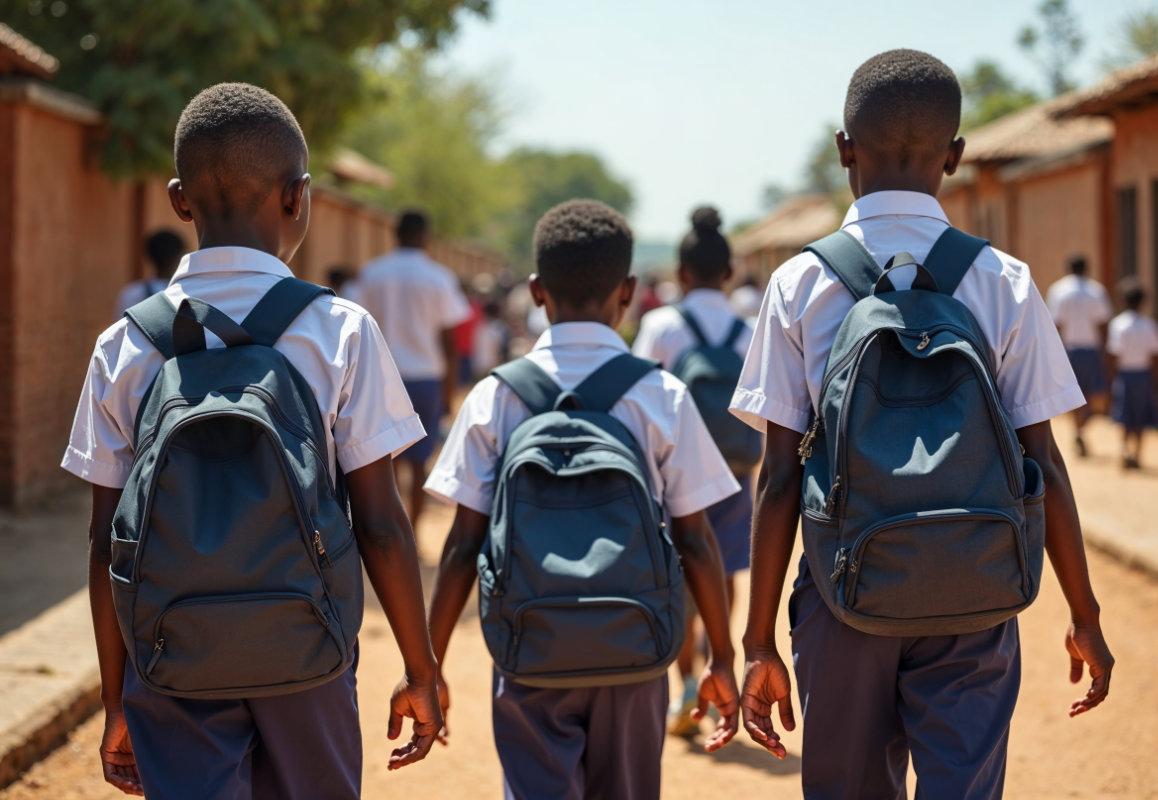
A comparison of the qualitative data collected from a sample of adolescent early school leavers using two different methods: text-based WhatsApp and traditional face-to-face interviews.
Everyone has the right to basic education, which includes adult basic education, as well as the right to higher education, which the government is required to gradually make affordable and accessible through reasonable means. Despite this, many schools in South Africa remain in poor condition, resulting in thousands of learners dropping out.
The General Household Survey, 2021, published by Statistics South Africa, shows that while the majority of learners aged 18 and 19 were still enrolled in secondary school, nearly three out of 10 pupils aged 18 years (29,3%) and 4 out of 9 (46,3%) of 19-year-oldshad dropped out of school. The General Household Survey (GHS) alsoindicates that poverty and income shocks, and family responsibilities, migration, and health issues are the leading causes of school dropout.
Other underlying causes of dropout include poor learning foundations, academic challenges, inadequate school resources and facilities, ineffective teaching and school management, and limited access to schools.
The early school dropout rate is particularly concerning, since it results in fewer possibilities for job opportunities and limited access to higher education.
This study compared the qualitative data collected from a sample of adolescent early school leavers using two different methods: text-based WhatsApp and traditional face-to-face interviews. Interviews were conducted amongst South African early school leavers. Semi-structured interviews were conducted with a sample of early school leavers in South Africa using WhatsApp (n = 9) andface-toface(n = 27), followed by a focus group discussion with interviewers. The Mann-Whitney U and chi squared tests were applied for assessing associations.
Considering that the interviews included both verbal and text communication, the study discovered that face-to-face interviews and WhatsApp text-based interviews each offered advantages and disadvantages.
Using strategies suitable for the interview style, rapport was successfully established in both instances. The number of rapport-building statements used in the face-to-face and WhatsApp interview conditions was equivalent; however, the face-to-face condition andsignificantly more off-topic statements started by the interviewer, were present in
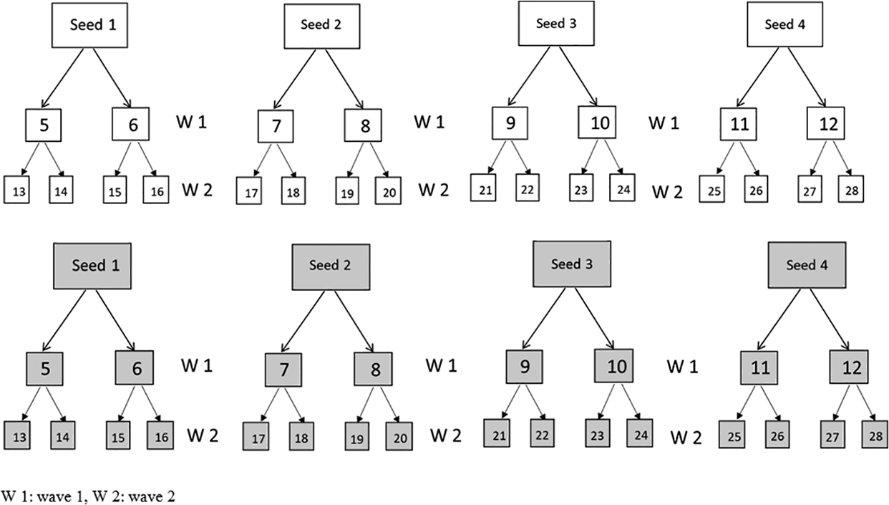
theWhatsApp condition. According to previous studies, establishing rapport during instant messaging required more time and more rapport-building remarks from the interviewer thanface-to-face interviews.(Jowett et al., 2011; Kazmer & Xie, 2008; Shapka et al., 2016).
We also found, in accordance with previous research, that the anonymity and distance between the interviewer and participant in the WhatsApp condition obscured power differentials, enabling rapport building(Cleary & Walter, 2011; Shapka et al., 2016).
The qualitative findings also showthat participants in the face-to-face condition felt thatthey could relate more easily to interviewers from similar socioeconomic backgrounds.
Conclusion
This study contributes to the body of research that compares online text-based and face-to-faceinterviewing techniques empirically. It is recommended that the WhatsApp interview protocol be adaptedto include, for instance, an open-ended question sent to participants once a week over approximately a month, even though the duration of the WhatsApp condition was a concern. This will shorten the interview period, increase interest, and enable a

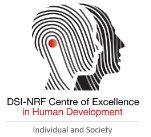
real-time analysis of the responses to that question. The WhatsApp interview may also include other multimedia elements like voice or video, as well as internet jargon. Giving participants the option to select how they want to be interviewed is also important, since this may increase interest in the study and response rates.
Reference:
A study Comparing Text- Based WhatsApp and Face-to-Face Interviews to Understand Early School Dropout
Rachana Desai1,2, Ansuyah Magan3, Innocent Maposa4, Robert Ruiter2, Tamsen Rochat1,3, and Liesbeth Mercken5
Affiliations
¹ DSI/NRF Centre of Excellence in Human Development, University of the Witwatersrand, South Africa
² Department of Work and Social Psychology, Maastricht University, the Netherlands
³ SAMRC/Wits Developmental Pathways for Health Research Unit, Department of Pediatrics and Child Health, School of Clinical Medicine, University of the Witwatersrand, South Africa
⁴ Division of Epidemiology and Biostatistics, School of Public Health, Faculty of Health Sciences, University of the Witwatersrand, South Africa
⁵ Liesbeth Mercken, Department of Health Psychology, Open University, the Netherlands
Corresponding author: rachana.desai@wits.ac.za
Funding information: The authors received no financial support for the research, authorship, and/or publication of this article.
Director: Prof Shane Norris www.facebook.com/CoEHuman twitter.com/CoEHuman www.wits.ac.za/coe-human



With the help of mobile technologies, such as mobile apps, patients may be able to better self-manage chronic illnesses by tracking health metrics like nutrition, exercise, and medication adherence.
The use of mobiletechnologiesto promote health and healthy behaviours is becoming more prevalent in global health programs. With the help of mobile technologies, such as mobile apps, patients may be able to better self-manage chronic illnesses by tracking health metrics like nutrition, exercise, and medication adherence. However, a number of studies have indicated that factors such as age, gender, race, geographical location, and medical specialization directly affect an individual's inclination for adopting technology, highlighting the significance of comprehending the factors behind the digital divide and unequal access.
In this study, a convergent parallel mixed methods research design was utilized. The study population comprised of 363 young women aged 18 to 28 years, who participated in thetrial within theprecinct of the Chris Hani Baragwanath Academic Hospital in Soweto, Johannesburg, South Africa, and were recruited into the Bukhali trial's intervention arm. Phone calls were made to participants between August 2019 and January 2022, in order to schedule a session or have one delivered to them.
The quantitative component of this study includedall young women who were contacted telephonicallybetween August 2019 and January 2022. A subset of the broader Healthy Life Trajectories Initiative participant pool, consisting of 363 women, were contacted to either bookfor a session or have
one delivered to them. The purpose of this exercise was to determine which young women could be reached and which could not. The study focused on the extent to which participants could be contacted by phone, so participants who had (1) in-person contact with the study team (either off-site to deliver supplements or on-site to deliver a session), (2) contact via SMS, or (3) contacted through other means of communication (e.g., home visits or instant messaging) were excluded. STATA (version 17; StataCorp) was used for all data analysis.
For the qualitative component, a subsample of participants (n=20) from the Bukhali trial for > 12 months were recruited telephonically for those who were easily contactable, and by a fieldwork team for those who were difficult to reach. The last group of women involved in the research would be scheduled for a monthly session, which might be conducted in person, over the phone, via SMS, or by having supplements sent to them. Afterwards, we initially limited this group to the young women we were unable to get in touch with, those who had a session delivered to them, and those who had a session scheduled. Moreover, individuals who remained unreachable despite multiple attempts to reach them were excluded, and the sample was then limited to those who received just one call attempt. A reflexive theme analysis technique was utilized for the analysis using MAXQDA software (version 20; VERBI GmbH).
Assessed for eligibility (n=6199)
Excluded: (n=4399)
• In person (n=4039)
• SMS (n=280)|
• Other (n=56)
• Missing (n=24)
Contacted telephonically (n=1800)
Excluded:
• Support delivered (n=58)
• Supplement delivered (n=22)
• Withdrawal (n=22)
• Supplement retumed (n=15)
• Missing (n=7)
Included:
• Failed to make contact (n=885)
• Deliver session (n=413)
• Booked for a session (n=378)
Excluded participant records with repeated call attempts (n=1313)
Participant records included for analysis for 1 call attempt (n=363)
Contactable (n=189) Faied to make contact (n=174)
The purpose of this study was to investigate the difficulties that participants in a trial held in Soweto, South Africa, had in maintaining contact via cell phones. This study found that even though the majority of participants who are difficult to contactdo have personal smartphones, they also deal with a variety of interrelated mobile phone problems, like coverage and technical issues,mobile theft in their communities, and expensive data and airtime.
According to the quantitative and qualitative findings of this study, which explored the difficulties that participants face in being contactable by mobile phones, the participants' socioeconomic background has a significant influence on both their mobile use behavior and the difficulty in reaching them.
This study further found that the proportion of those who own phones decreased with each successive age category for both participants who were hard to reach and those who were contactable.


Additionally, this study found that the proportion of phone owners decreased with each age category for both those who were difficult to reach and those who were contactable.
However, multiple viable solutions exist for the issues raised in this study. Health promotion initiativescan be implemented through in-person consultations or sessions with participants to optimize engagementin mobile health research. Participants would get the chance to interact more personally with the study teamduring these in-person consultations, as well as receive personalized study feedbackand support. This method was successful in a previous clinical research, where individualized care, such as allowing participants to express their personal problems and allowing them to make more contact with the study team or investigators, helped in increasing participation.
Despite the availability of mobile technology and network accessibility, significant economic constraints prohibit young individuals from effectively leveraging technology. Consequently, these challenges have an impact on behavioral changes and health promotion. Greater accessibility to less expensive or free data networks or digital platforms is required nationwide in South Africa to offer more equitable access to such technologies, given the rising phone ownership in LMICs, which includes South Africa.
Reference:
Mobile technology use in clinical research: Examining challenges and implications for health promotion in South Africa
Khuthala Mabetha1, Larske M Soepnel1,2, Gugulethu Mabena1, Molebogeng Motlhatlhedi1, Lukhanyo Nyati1, Shane A Norris1,3, Catherine E Draper1
Affiliations
¹ South African Medical Research Council/Wits Developmental Pathways for Health Research Unit, Department of Paediatrics, Faculty of Health Sciences, School of Clinical Medicine, University of the Witwatersrand, Johannesburg, South Africa
² Julius Center for Health Sciences and Primary Care, University Medical Center, Utrecht University, Utrecht, Netherlands
³ School of Human Development and Health, University of Southampton, Southampton, United Kingdom
Corresponding author: khuthala.mabetha@wits.ac.za
Funding information: This study was supported by the South African Medical Research Council and the Canadian Institutes of Health Research. SAN was supported by the Department of Science and Innovation-National Research Foundation Centre of Excellence in Human Development.
1st Floor, School of Public Health, University of the Witwatersrand York Road, Parktown, Johannesburg 2193, South Africa
Director: Prof Shane Norris
www.facebook.com/CoEHuman twitter.com/CoEHuman www.wits.ac.za/coe-human



Overconsumption of sodium has been associated with health issues such as kidney disease, osteoporosis, and hypertension, or high blood pressure, which can result in stroke and heart disease.
The word salt comes from the Latin word “sal,” meaning salt.
Salt has long been used to preserve food and add flavour. However, as the saying goes, “too much of anything is bad” Eating too much salt is no exception. Overconsumption of sodium has been associated with health issues such as kidney disease, osteoporosis, and hypertension, or high blood pressure, which can result in stroke and heart disease.
The study below compared the taste and visual acceptability of 35%, 50%, 66%, and 100% KCl salt substitute formulations to common salt (100% NaCl) in urban South African adults. A total of 56 participants were asked to undertake a double-blind comparisonof a variety of potassium-enriched low sodium salt substitutes (LSSS) with regular salt as a reference.
Participants were recruited through a youthcommunity centre in Soweto, Johannesburg.Adults aged 18 or older who had no self-reported history of kidneydisease, impaired kidney function, or food allergies and lived in the localurban area werepurposivelysampled, with additional participants gathered through snowball sampling. Trained researchers who spoke the participant's homelanguage explained the study, and all participants provided written
informed consent before participating. The study was carried out in accordance with the Declaration of Helsinki principles, and the protocol (M220652) was approved by the University of the Witwatersrand's Human Research Ethics Committee (Medical).
In the three categories of (i) taste ranking, (ii) taste perception, and (iii) use ranking, 50% potassium chloride (KCl) outperformed the other potassium-enriched low sodium salt substitutes (LSSS). The REDCap electronic data capture tools, hostedat The University of the Witwatersrand, were used to record the study data, which was gathered by trainedresearchers. Overall, 62% of participants said they enjoyed the salt substitutes and would be pleased to use them, or that the 50% KCl tasted like regular seasoning when the taste impressions were examined. In contrast, 71% of participants said they would eat but didn't like or wouldn't eat 100% KCl.
Additionally, participants were askedto try visually identifying the different salt compositions. The majority of participants (57.3%and 36.4%) could visually distinguish between 100% potassium chloride (KCl) and 100% sodium chloride (NaCl), whereas identifyingother blendswasdifficult.


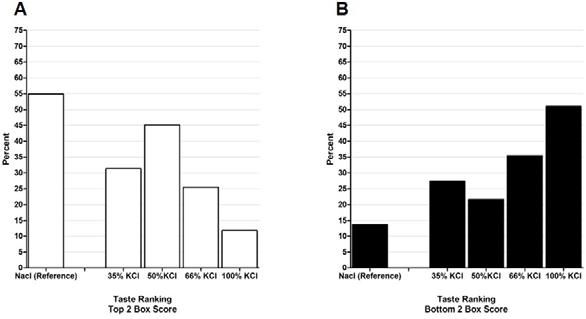

Results indicate that, in a South African setting, the 50% KCl salt alternative would be well accepted in terms of flavour. Furthermore, most of the participants were unable to visually discern the 50% KCl, making it a good choice for everyday household use.
Reference:
Comparing a range of potassiumenriched low sodium salt substitutes to common salt: Results of taste and visual tests in South African adults
Simone H. Crouch1,* Lisa J. Ware1, Shane A. Norris1,2, Aletta E. Schutte1,3,4
Affiliations
¹ DSI-NRF SAMRC/Wits Developmental Pathways for Health Research Unit, Department of Paediatrics, Faculty of Health Sciences, University of the Witwatersrand, South Africa
² School of Human Development and Health, University of Southampton, Southampton, UK
³ School of Population Health, University of New South Wales, The George Institute for Global Health, Sydney, New South Wales, Australia
⁴ Hypertension in Africa Research Team (HART), MRC Unit for Hypertension and Cardiovascular Disease, North-West University, Potchefstroom, South Africa
Corresponding author: simone.crouch@wits.ac.za
Funding information: This study was supported by a Strategic Hires and Retention Pathways (SHARP) Fellowship awarded to AES by the University of New South Wales, Sydney, Australia. The Wits Health HUBB youth community health work training programme (https://www. witshealthhubb.org/) i s supported by Wits Health Consortium and through development funding from the Development Bank of Southern Africa. AES is supported by a National Health and Medical Research Council (NHMRC) Leadership Investigator Grant (Application ID 2017504). LJW is supported by a Strategic Grant [Ref. STRATGNT2023-01] from the DSI-NRF Centre of Excellence in Human Devel opment. SHC is supported by the Joint Global Health Trials (UK). SAN is supported by the South Africa Medical Research Council (SAMRC) and DSI-NRF Centre of Excellence in Human Development at the University of Witwatersrand, Johannesburg, South Africa.

www.wits.ac.za/coe-human
1st Floor, School of Public Health, University of the Witwatersrand York Road, Parktown, Johannesburg 2193, South Africa
Director: Prof Shane Norris
www.facebook.com/CoEHuman twitter.com/CoEHuman




Acceptability andfeasibility ofhome-based hypertension andphysical activity screening bycommunity health workers inanunder-resourced community inSouth Africa
Hypertension, the medical term for high blood pressure, is the main risk factor for ailments such as heart disease, strokes, kidney disease, and even eye disorders.
The Southern African Hypertension Society estimates that about 40% of adults over 25 suffer from hypertension. This indicates that hypertension affects about one billion individuals. Unfortunately, almost half of these individuals are not aware of their condition.
Community health workers (CHWs) are taking up primary care duties in low-and-middle-income countries (LMICs) due to the growing burden of non-communicable diseases (NCDs). The study below investigated how residents of a historically underprivileged South African township felt about house visits led by CHWs with an NCD focus.
This study was conducted in Soweto, South Africa, in conjunction with a series of home visits by CHWs to provide health screening exams in September 2021. Home visits were undertaken using a series of processes: 1) CHWs greeted residents, introduced themselves, and explained the reason for the visit; 2) Secondly CHWs asked for permission to enter the residence; 3) The household members then completed the informed consent procedure; 4) thereafter CHWs carried out a standardized health assessment
protocol; and 5) Lastly, household members completed a quick satisfaction survey at the end of the visit.
As a component of an accredited community health work qualification (South African National Qualification Framework Health Promotion Officer/Community Health Worker), CHWs were young adults (ages 18 to 30) undergoing training in health promotion, health behaviour change support, and basic community health screening.
During the study period, 173 community households were visited by the CHWs (see Fig. 1 below). Nine people (5%) expressed no interest in participating, while three people (2%) did not answerthe door. Out of the 161 community members who remained, 153 (95%) agreed to participate in the study. Eighteen participants either withdrew from the assessments or were unable to complete them because of time constraints. The final sample consisted of 135 people, with a median age of 38 years and a range of 18 to 83 years (56 males and 79 women). Over 50% of the participants said they had between 7 and 12 years of schooling, while roughly one-third said they had more than twelve years.
With over 95% of homes agreeing to participate in the health screenings, the researchers’ home-visit strategy demonstrated overall viability in a low-resource
Households approached (n=173)
Participants recruited (n=153)
Participants not home or declined to participate (n=20)
Participants with incomplete data* (n=18)
Participants with complete data for analysis (n=135)
Figure 1: Study flow diagram. * Participants were unable to complete the measurements and/or questionnaire due to previous scheduled appointments or voluntary withdrawal
neighbourhood. This degree of involvement is comparable to a home-based screening program that was implemented in rural India and reached about 90% of the targeted households (Basu et al. 2019). Additionally, the researchers’ discovered that the household members were quite receptive to the advice given, accepted the house visits, and were eager to learn more about their cardiovascular health.
Similar to earlier research done in South African settings (Medina- Marino et al. 2021; Ngcobo and Rossouw 2022), household members expressed a high level of comfort with the CHW-led home visits. This is surprising considering the high reported crime rates in the area, but it also suggests the trusted role that CHWs occupy in the community.


www.wits.ac.za/coe-human
According to follow-up interviews, a significant number of community members expressed pleasure with the personalized treatment they received, which they said they were not getting at the local health clinic.
Given that the community members responded favourably to the blood pressure and physical activity screenings as well as the brief counselling, the success of the home visits in this study underscores the potential to increase easily accessible, community-based health care opportunities for NCD prevention and management. CHWs in LMICs might be the vital force required to confront the rising tide of NCDs through primary prevention and health promotion, given the ongoing growth of CHW duties and responsibilities imposed through the task shifting of health-care services in under-resourced regions.
Reference:
Acceptability andfeasibility ofhome-based hypertension andphysical activity screening bycommunity health workers inanunder-resourced community inSouth Africa
Mark Stoutenberg1,2,Simone H Crouch3,Lia K McNulty1,Andrea Kolkenbeck-Ruh3,4,Georgia Torres2,Philippe J L Gradidge2,Andy Ly1,Lisa J Ware3,5
Affiliations
¹ Department of Kinesiology, College of Public Health, Temple University, 237 Pearson Hall, 1800 North Broad, Philadelphia, Pennsylvania 19122 USA.
² Centre for Exercise Science and Sports Medicine, School of Therapeutic Sciences, Faculty of Health Sciences, University of the Witwatersrand, Wits Education Campus, 27 St. Andrews Road, Parktown, Gauteng, 2193 South Africa.
³ SA MRC/Wits Developmental Pathways for Health Research Unit (DPHRU), School of Clinical Medicine, Faculty of Health Sciences, University of the Witwatersrand, Corner College and Clinic Road, Chris Hani Baragwanath Academic Hospital, Soweto, 1864 South Africa.
⁴ Cardiovascular Pathophysiology and Genomics Research Unit, School of Physiology, Faculty of Health Sciences, University of the Witwatersrand, 7York Road, Johannesburg, 2193 South Africa.
⁵ DSI-NRF Centre of Excellence in Human Development, University of the Witwatersrand, Wits Education Campus, 27 St. Andrews Road, Parktown, Gauteng, 2193 South Africa.
Corresponding author: mark.stoutenberg@temple.edu
Funding support: Open access funding provided by University of the Witwatersrand. The Wits Health Hubb is supported by the Development Bank of Southern Africa through a partnership between Wits Health Consortium (University of the Witwatersrand) and Amandla Ku Lutsha and a grant from the DSI-NRF Centre for Excellence in Human Development [STRATGNT2023-01].
1st Floor, School of Public Health, University of the Witwatersrand York Road, Parktown, Johannesburg 2193, South Africa
Director: Prof Shane Norris
www.facebook.com/CoEHuman
twitter.com/CoEHuman



Using nationally representative adult CVH data from five different high- to low-income countries, the study sought to assess the prevalence and trajectories of high CVH across the life course.
Cardiovascular diseases (CVD) continue to be the primary cause of death and a significant contributor to morbidity worldwide. The World Health Organization (WHO) estimates that 17.9 million deaths worldwide in 2019 were attributable to CVDs, accounting for 32% of all fatalities. Heart attacks and strokes accounted for 85% of these fatalities.
According to the American Heart Association (AHA), the Life's Simple 7 (LS7 – dietary quality, physical activity (PA), exposure to cigarette smoke, body mass index (BMI), blood pressure (BP), blood glucose, and total cholesterol – are the seven parameters that make up cardiovascular health (CVH).
Using nationally representative adult CVH data from five different high- to low-income countries, the study below sought to assess the prevalence and trajectories of high CVH across the life course.
We specifically chose five countries – Bangladesh, Brazil, England, Ethiopia, and the US – that differed in terms of geography, per capita income, disease burden, educational systems, and health system capabilities. In the countries listed above, surveys containing CVH variables (physical activity, cigarette smoking, body mass, blood pressure, blood glucose, and total cholesterol levels) were found.
Participants were omitted if they had incomplete data, were pregnant, or were younger than 18 or older than 69.
To make decisions on harmonisation, the availability of CVH variables (dietary quality, sleep, PA, cigarette smoking, BMI, BP, blood glucose or HbA1c, and total cholesterol levels) and the data collection methods were compared across surveys (see Figure 1).
The inclusion criteria for this secondary data analysis were met by 28,092 individuals (18-69 years old) out of the 49,774 participants (0-104 years old) who took part in the surveys (see Figure 2 below).

While comparable findings for diet and sleep were lacking, evaluation of the remaining CVH measures (BP, glycaemia, BMI, smoking, cholesterol, and PA) corroborated our hypothesis by demonstrating that the prevalence of high CVH scores decreased during the life course in all five countries.
Higher-income countries showed a reduced frequency of high CVH by the age of 18. Excess body weight proved to be the primary cause of poor CVH in higher-income countries, while current smoking was highest in Bangladesh.
The drop in high CVH observed from adolescence across the adult life course may be universal, according to our research, despite significant heterogeneity among the included countries.
Conclusion
Our harmonisation of data on CVH measurements from nationally representative population surveys in five vastly distinct low- to high-income countries demonstrates a consistent trend of decline in overall CVH with age, validating our hypothesis that this is universal across borders. The lack of dietary data suitable for harmonisation is a key issue that must be addressed as new standardised methodologies for CVH population research are developed. Given the fast urban, economic, and nutritional transformations occurring in lowand middle-income countries (LMICs), targetedand contextually relevant interventions to improve CVH trajectories are urgently required to increase the global prevalence of high CVH at all ages.

Figure 2: Consort diagram of participants included in the analysis
Reference:
Comparison of Cardiovascular Health Profiles Across Population Surveys From 5 High- to Low-Income Countries
LisaWare1 *,BridgetVermeulen1 *,InnocentMaposa2,DavidFloo3,4, LuisaCCBrant5,ShwetaKhandelwal6,KavitaSingh7,8,SaraSoares9,1, NeusaJessen11,12,GastónPerman13,BaizidKhoorshidRiaz14, HarshalSinghSachdev15,Norrina B Allen16,Darwin R Labarthe16 Affiliations
¹ South African MRC Developmental Pathways for Health Research Unit, School of Clinical Medicine, Faculty of Health Sciences, University of the Witwatersrand, Johannesburg, South Africa.
² Division of Epidemiology and Biostatistics, Department of Global Health, Faculty of Medicine and Health Sciences, Stellenbosch University, Cape Town, South Africa.
³ Wuqu’ Kawoq, Santiago Sacatepéquez, Sacatepéquez, Guatemala
⁴ Department of Medicine, University of Michigan, Ann Arbor, Michigan, USA.
⁵ Faculty of Medicine, Universidade Federal de Minas Gerais, Brazil.
⁶ Public Health Foundation of India, Delhi, India.
⁷ Heidelberg Institute of Global Health, Heidelberg University, Germany
⁸ Public Health Foundation of India, Gurugram, Haryana, India.
⁹ EPIUnit - Instituto de Saúde Pública, Universidade do Porto, Portugal.
¹⁰ Laboratório para a Investigação Integrativa e Translacional em Saúde Populacional (ITR), Universidade do Porto, Portugal.
¹¹ Faculty of Medicine, Eduardo Mondlane University, Mozambique.
¹² Research Unit of the Department of Medicine, Maputo Central Hospital, Mozambique
¹³ Department of Public Health. Instituto Universitario Hospital Italiano de Buenos Aires, Argentina.
¹⁴ National Institute of Preventive & Social Medicine (NIPSOM), Ministry of Health & Family Welfare, Mohakhali, Dhaka, Bangladesh.
¹⁵ Sitaram Bhartia Institute of Science and Research, New Delhi 110016, India.
¹⁶ Department of Preventive Medicine, Feinberg School of Medicine, Northwestern University, USA.
*Joint first authors
Corresponding author: Prof Lisa Ware lisa.ware@wits.ac.za
Funding support: This work was conducted with funding support from the Institute for Global Health, Northwestern University [Catalyzer Award No. 1005]; from the DSI-NRF Centre of Excellence in Human Development hosted at the University of the Witwatersrand in South Africa, and the support of the University of the Witwatersrand research office.

1st Floor, School of Public Health, University of the Witwatersrand York Road, Parktown, Johannesburg 2193, South Africa
Director: Prof Shane Norris www.facebook.com/CoEHuman twitter.com/CoEHuman www.wits.ac.za/coe-human


The Council University of the Witwatersrand, Johannesburg PO BOX 3 2050 Wits
South Africa
Waterfall City
Waterfall 2090
Docex 10 Johannesburg
Tel: +27 (0)11 806 5000 www.deloitte.com
AGREED-UPON PROCEDURES REPORT IN RESPECT OF THE NATIONAL RESEARCH FOUNDATION (NRF) AWARDS RECEIVED BY THE UNIVERSITY OF THE WITWATERSRAND FOR THE CENTRE OF EXCELLENCE IN HUMAN DEVELOPMENT FOR THE YEAR ENDED 31 DECEMBER 2023
Purpose of this Agreed- Upon Report
We have performed the procedures agreed with you and enumerated below with respect of the National Research Foundation (NRF) awards received by the University of the Witwatersrand (“the U niversity”) for the Centre of Excellence in Human Development for the year ended 31 December 2023.
Our report is solely for the purpose of assisting the University of the Witwatersrand in in reporting to the NRF on the Cash Flow Analysis relating to the Centre of Excellence in Human Development for the year ended 31 December 2023 and may not be suitable for another purpose.
R Responsibilities of the Engaging Party and the Responsible Party
The University of the Witwatersrand has acknowledged that the agreed -upon procedures are appropriate for the purpose of the engagement.
NRF, as identified by the University of the Witwatersrand is responsible for the subject matter on which the agreedupon procedures are performed.
P Practitioners Responsibilities
We have conducted the agreed-upon procedures engagement in accordance with the International Standard on Related Services (ISRS) 4400 (Revised), Agreed-Upon Procedures Engagements. An agreed-upon procedures engagement involves our performing the procedures that have been agreed with the University of the Witwatersrand and reporting the findings, which are factual results of the agreed -upon procedures performed. We make no representation regarding the appropriateness of the agreed -upon procedures.
This agreed-upon procedures engagement is not an assurance engagement. Accordingly, we do not express an opinion or assurance conclusion.
Had we performed additional procedures, other matters might have come to our attention that would have been reported.


Agreed upon procedures report in respect of the University of the Witwatersrand (“the University”) for the Centre of Excellence in Human Development for the year ended 31 December 2023.
Page 2 of 7
We have complied with the ethical and independence requirements as described in the Independent Regulatory Board for Auditors’ Code of Professional Conduct for Registered Auditors (IRBA Code) and in accordance with other ethical requirements applicable to performing audits in South Africa. The IRBA Code is consistent with the corresponding sections of the International Ethics Standards Board for Accountants’ International Code of Ethics for Professional Accountants (including International Independence Stan dards).
The firm applies the International Standard on Quality Management 1, Quality Management for Firms that Perform Audits or Reviews of Financial Statements, or Other Assurance or Related Services Engagements, which requires the firm to design, implement and operate a system of quality management, including policies or procedures regarding compliance with ethical requirements, professional standards and applicable legal and regulatory requirements.
We have performed the procedures described below which were agreed upon with the University of the Witwatersrand on with respect to the NRF awards received by the University of the Witwatersrand for the Centre of Excellence in Human Development for the year ended 31 December 2023
1. Inspect that the declared income and expenditure is correct and that all income and expenditure as per the general ledger has been declared by agreeing the Centre of Excellence in Human Development Cash flow Analysis to the general ledger for the period. The transactions, both expenditure and income will be subject to the procedures stipulated below.
2. Inspect that:
a) Two steering Committee Board meetings were held in the period of funding, and minutes for both meetings have been adopted and signed by the Chairperson of the Board
b) The Steering Committee approved the Business Plan, and those minutes of the meeting as well as the Business Plan was submitted to the NRF.
1. We obtained the Centre of Excellence in Human Development Cash Flow Analysis and general ledger for the period under review and inspected that all income and expenditure as per the general ledger was declared by agreeing the Centre of Excellence in Human Development cash flow analysis to the general ledger. Refer to Appendix A for the cash flow analysis.
No exceptions were noted.
2. Inspected that:
a) Two Steering Committee meetings were held in the period of funding, and minutes for both meetings were adopted and signed by the Chairperson of the Board.
No Exceptions were noted.
b) Through the inspection of the Steering Committee meetings minutes, we noted that the approved Business Plan and the minutes of the meetings were submitted to the NRF.
No exceptions were noted.

Agreed upon procedures report in respect of the University of the Witwatersrand (“the University”) for the Centre of Excellence in Human Development for the year ended 31 December 2023.
Page 3 of 7
Procedures
3. Inspect that the grant funds were used to advance the research agenda by:
a) Selecting a sample being ten percent of the expenses per the general ledger.
3. We inspected that the grant funds were used to advance the research agenda and performed the following procedures:
a) Selected a sample being ten percent of the expenses per the general ledger.
No exceptions were noted.
b) Agreeing with Beverley Manus (University of the Witwatersrand: Finance Manager Research Office) that the transactions selected in procedure 3(a), are appropriate.
c) For the samples selected, perform the following procedures:
a. Obtain the source documents (invoices, payslips, expense breakdowns and travel claim expense forms, etc.) for items selected from the general ledger and agree the details per general ledger to the supporting documentation inspected.
b) We agreed with Beverley Manus (University of the Witwatersrand: Finance Manager Research Office) that the transactions selected in procedure 3(a), are appropriate.
No exceptions were noted.
c) For the samples selected, we performed the following procedures:
a. We obtained the source documents (invoices, payslips, expense breakdowns and travel claim expense forms, etc.) for items selected from the general ledger and agreed the details per general ledger to the supporting documentation inspected.
We noted one instance in which the invoice did not agree to the amount recorded per the general ledger and a difference of R109.91 was noted

b. Inspect the nature of expenses as per the supporting documents description and compare the nature of expenses to the purpose of research, as stipulated in the business plan.
b. We inspected the nature of expenses as per the supporting documents description and compared the nature of expenses to the purpose of research, as stipulated in the business plan.
No exceptions were noted.

Agreed upon procedures report in respect of the University of the Witwatersrand (“the University”) for the Centre of Excellence in Human Development for the year ended 31 December 2023.
Page 4 of 7
Procedures
c. Inspect the date as per the source documentation and agree that it was recorded in the correct financial period, 1 January 2023 – 31 December 2023 based on when the goods or services were received.
Findings
d. Inspect the source documentation and agree that it is in the name of the University of the Witwatersrand.
e. Inspect the source documentation and where VAT is levied, that it is correctly recorded in the general ledger by agreeing the VAT amount per the source document to the VAT amount recorded in general ledger.
4. For the grant funds utilised on nomination of students, agree the amount per the student nomination form to the amount paid to the student by obtaining the relevant student accounts.
c. We inspected the date as per the source documentation and agreed that it was recorded in the correct financial period, 1 January 2023 – 31 December 2023 based on when the goods or services were received.
We identified two instances of tr ansactions which related to the 2022 financial year, but were recorded in the 2023 financial year.

d. We inspected the source documentation and agreed that it is in the name of the University of the Witwatersrand.
No exceptions were noted.
e. We inspected the source documentation and where VAT is levied, that it is correctly recorded in the general ledger by agreeing the VAT amount per the source document to the VAT amount recorded in general ledger.
No exceptions were noted.
4. For the grant funds utilised on nomination of students, we agreed the amount per the student nomination form to the amount paid to the student by obtaining the relevant student accounts. Refer to Appendix B for student nominations listing.
The following findings were noted:


Agreed upon procedures report in respect of the University of the Witwatersrand (“the University”) for the Centre of Excellence in Human Development for the year ended 31 December 2023.
Page 5 of 7
Procedures
5. Inspect that the funds were spent in accordance with the signed Memorandum of Agreement (MOA), by obtaining signed representation from university management.
6. Confirm that the activities pursued by the Centre of Excellence in Human Development related to the 5 Key Performance Areas (KPAs), by obtaining signed representations from university management.
Findings
5. We inspected that the funds were spent in accordance with the signed Memorandum of Agree ment (MOA), by obtaining signed representation from university management.
No exceptions were noted.
6. We confirmed that the activities pursued by the Centre of Excellence in Human Development related to the 5 Key Performance Areas (KPAs), by obtaining signed representations from university management.
No exceptions were noted.
Our report is solely for the purpose set forth in the first paragraph of this report and for your information and is not to be used for any other purpose or to be distributed to any other parties. This report relates only to the ac counts and items specified above and does not extend to any financial statements of the University of the Witwatersrand taken as a whole.
D Deloitte & Touche
Registered Auditor
Per: Spiro Tyranes CA(SA); RA Partner
24 May 2024

Agreed upon procedures report in respect of the University of the Witwatersrand (“the University”) for the Centre of Excellence in Human Development for the year ended 31 De cember 2023. Page 6 of 7


Agreed upon procedures report in respect of the University of the Witwatersrand (“the University”) for the Centre of Excellence in Human Development for the year ended 31 December 2023.
Page 7 of 7
APPENDIX B
S Student Nominations List CoE: Centre of Excellence in Human Development
Grant No Grant holder Student Level
91489 Norris, SA Ashleigh Craig Post Doctoral
91489 Norris, SA Nicole Miriam Danial Post Doctoral
91489 Norris, SA Khuthala Mabetha Post Doctoral
91489 Norris, SA Witness Mapanga Post Doctoral
91489 Norris, SA Larske Marit Soepnel Post Doctoral
91489 Norris, SA Lauren ann Stuart Post Doctoral
91489 Norris, SA Noreth Muller-Kluits Post Doctoral
000
000
000
000
000
This will be done electronically by the Designated Authority
Professor ............

Deputy Vice-Chancellor: Research and Innovation
Date: 11 August 2025